 01/04/2010 19:35 01/04/2010 19:35 |
|
| | | OFFLINE | | Post: 19.816
Post: 2.458 | Registrato il: 28/08/2005
Registrato il: 20/01/2009 | Administratore | Utente Veteran | |
|


 See preceding page for earlier entries today, 4/1/10.
See preceding page for earlier entries today, 4/1/10.



 MASS OF THE CHRISM
MASS OF THE CHRISM
MAUNDY THURSDAY
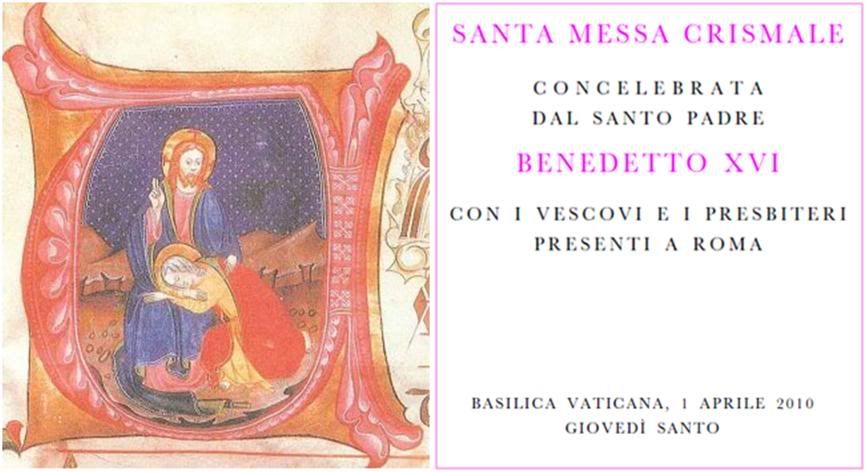
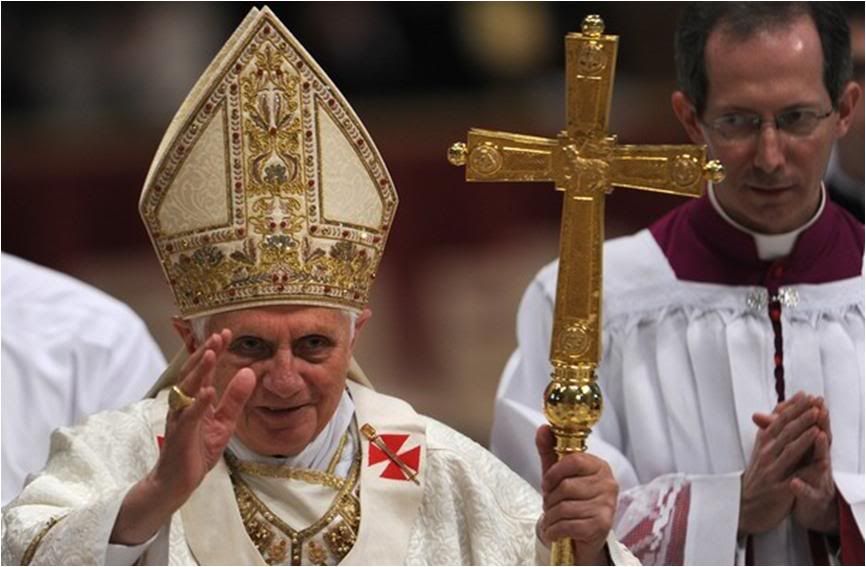
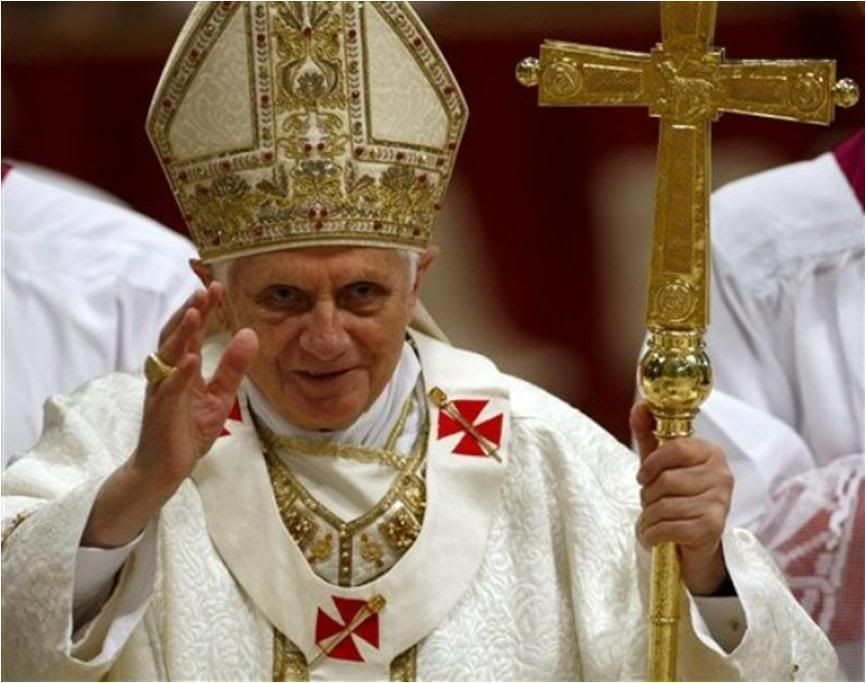
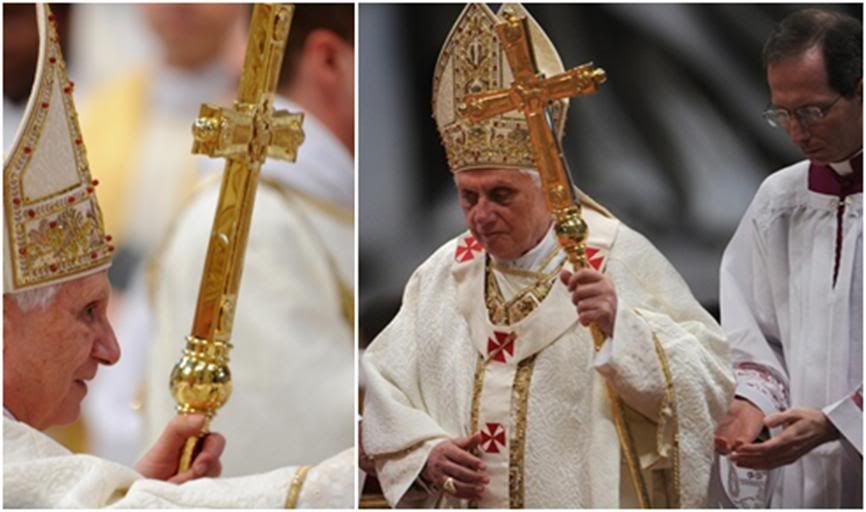
At 9:30 this morning, the Holy Father, Benedict XVI, presided at the Holy Mass of the Chrism in St. Peter's Basilica. This liturgy is celebrated in all the cathedral churches of the Catholic world on Maundy Thursday.
The Mass was concelebrated with cardinals, bishops and priests present in Rome. After the renewal of priestly vows by the concelebrants, the Pope blessed the oils for catechumens, for the sick and for Chrism.
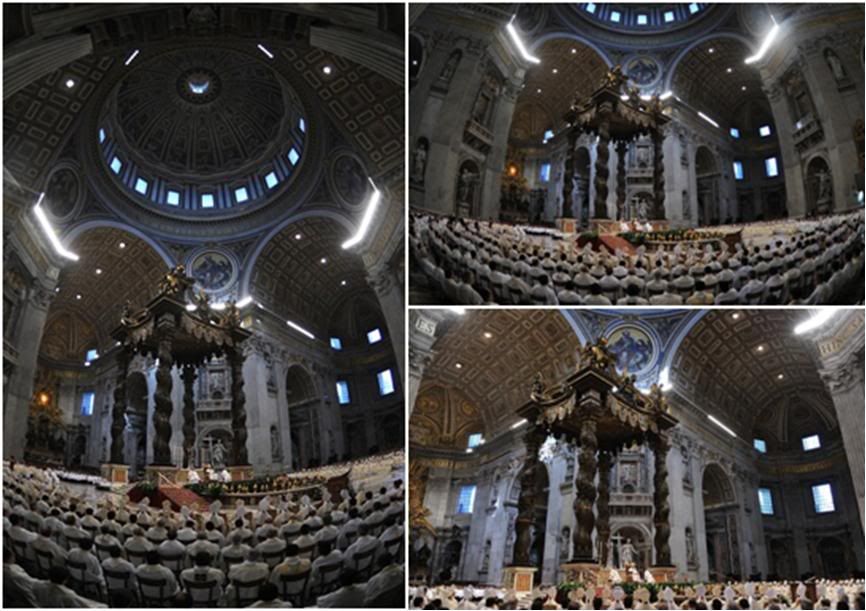
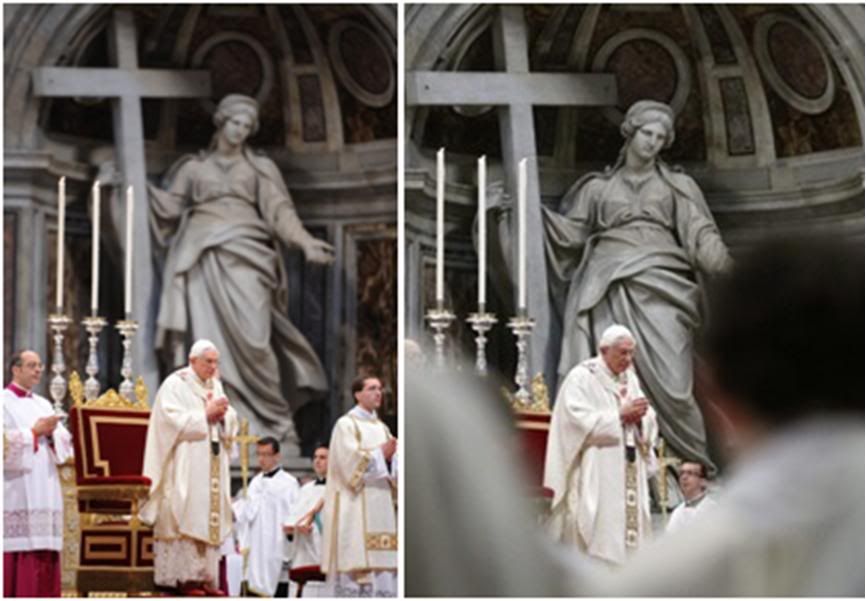
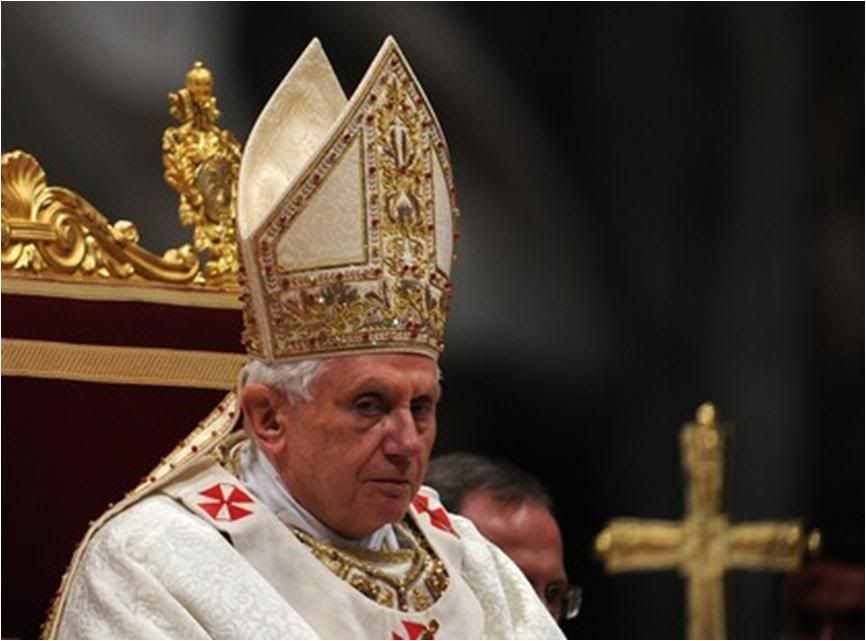
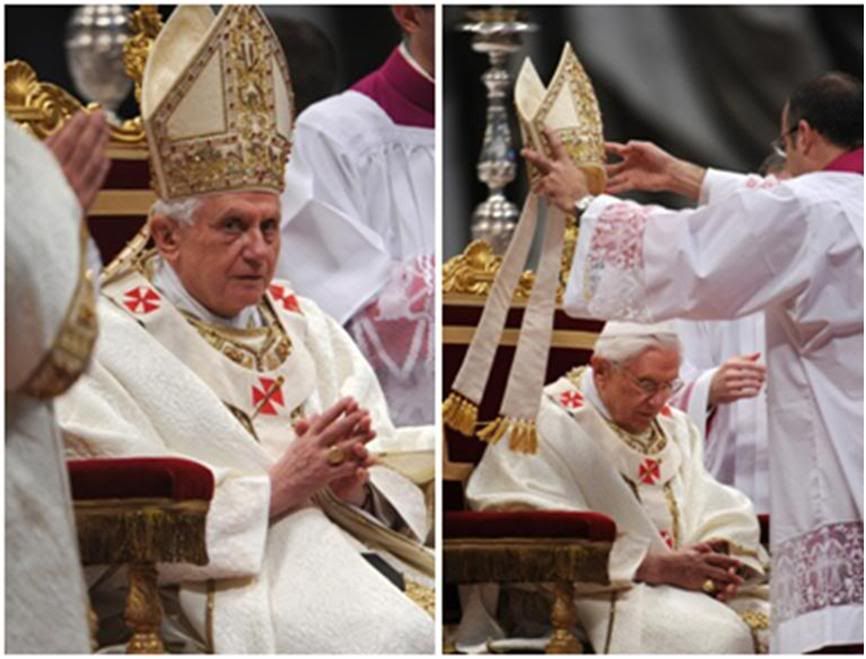
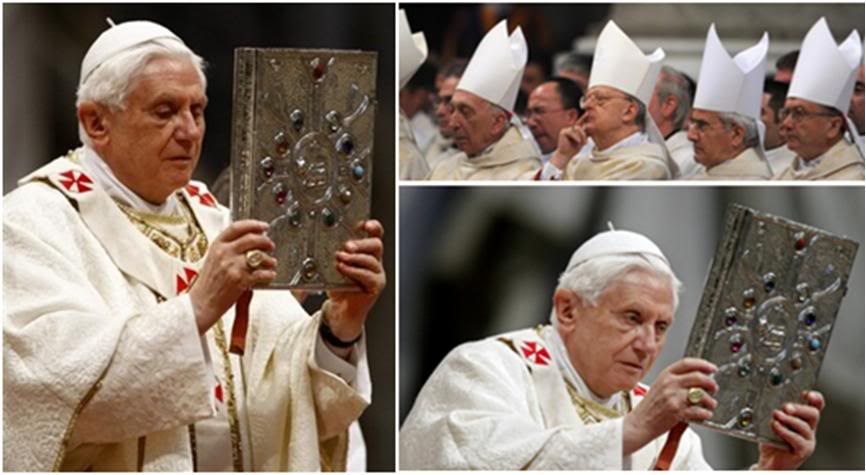
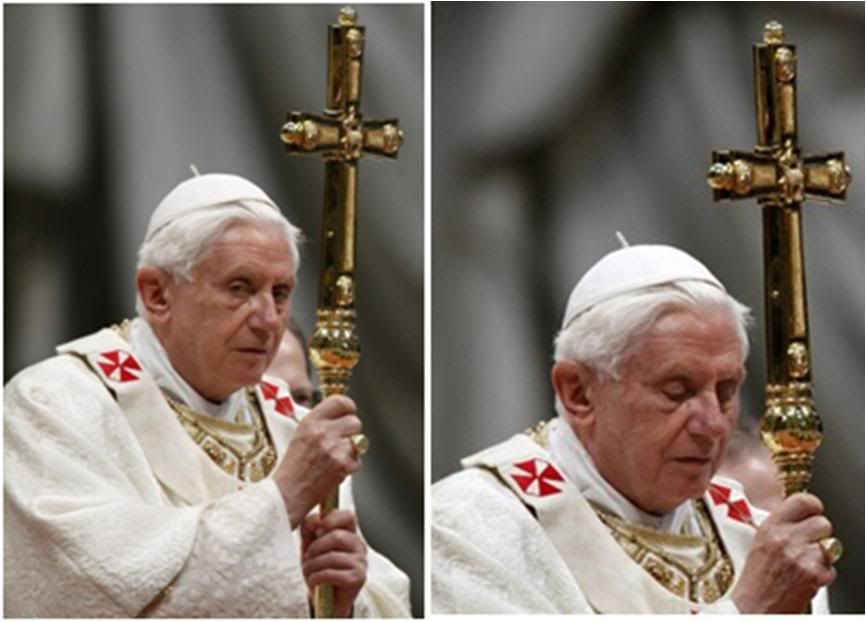
Here is the homily delivered by the Holy Father. [Translations in all the Vatican official languages were immediately available!]
Dear Brothers and Sisters,
At the centre of the Church’s worship is the notion of "sacrament". This means that it is not primarily we who act, but God comes first to meet us through his action, he looks upon us and he leads us to himself.
Another striking feature is this: God touches us through material things, through gifts of creation that he takes up into his service, making them instruments of the encounter between us and himself.
There are four elements in creation on which the world of sacraments is built: water, bread, wine and olive oil.
Water, as the basic element and fundamental condition of all life, is the essential sign of the act in which, through baptism, we become Christians and are born to new life.
While water is the vital element everywhere, and thus represents the shared access of all people to rebirth as Christians, the other three elements belong to the culture of the Mediterranean region. In other words, they point towards the concrete historical environment in which Christianity emerged.
God acted in a clearly defined place on the earth, he truly made history with men. On the one hand, these three elements are gifts of creation, and on the other, they also indicate the locality of the history of God with us. They are a synthesis between creation and history: gifts of God that always connect us to those parts of the world where God chose to act with us in historical time, where he chose to become one of us.
Within these three elements there is a further gradation.
Bread has to do with everyday life. It is the fundamental gift of life day by day.
Wine has to do with feasting, with the fine things of creation, in which, at the same time, the joy of the redeemed finds particular expression.
Olive oil has a wide range of meaning. It is nourishment, it is medicine, it gives beauty, it prepares us for battle and it gives strength. Kings and priests are anointed with oil, which is thus a sign of dignity and responsibility, and likewise of the strength that comes from God.
Even the name that we bear as "Christians" contains the mystery of the oil. The word "Christians", in fact, by which Christ’s disciples were known in the earliest days of Gentile Christianity, is derived from the word "Christ" (Acts 11:20-21) – the Greek translation of the word "Messiah", which means "anointed one".
To be a Christian is to come from Christ, to belong to Christ, to the anointed one of God, to whom God granted kingship and priesthood. It means belonging to him whom God himself anointed – not with material oil, but with the One whom the oil represents: with his Holy Spirit. Olive oil is thus in a very particular way a symbol of the total compenetration of the man Jesus by the Holy Spirit.
In the Chrism Mass on Holy Thursday, the holy oils are at the centre of the liturgical action. They are consecrated in the bishop’s cathedral for the whole year.
They thus serve also as an expression of the Church’s unity, guaranteed by the episcopate, and they point to Christ, the true "shepherd and guardian" of our souls, as Saint Peter calls him (1 Pet 2:25).
At the same time, they hold together the entire liturgical year, anchored in the mystery of Holy Thursday. Finally, they point to the Garden of Olives, the scene of Jesus’s inner acceptance of his Passion.
Yet the Garden of Olives is also the place from which he ascended to the Father, and is therefore the place of redemption: God did not leave Jesus in death. Jesus lives for ever with the Father, and is therefore omnipresent, with us always. This double mystery of the Mount of Olives is also always "at work" within the Church’s sacramental oil.
In four sacraments, oil is the sign of God’s goodness reaching out to touch us: in baptism, in confirmation as the sacrament of the Holy Spirit, in the different grades of the sacrament of holy orders and finally in the anointing of the sick, in which oil is offered to us, so to speak, as God’s medicine – as the medicine which now assures us of his goodness, offering us strength and consolation, yet at the same time points beyond the moment of the illness towards the definitive healing, the resurrection (cf. Jas 5:14).
Thus oil, in its different forms, accompanies us throughout our lives: beginning with the catechumenate and baptism, and continuing right up to the moment when we prepare to meet God, our Judge and Saviour.
Moreover, the Chrism Mass, in which the sacramental sign of oil is presented to us as part of the language of God’s creation, speaks in particular to us who are priests: it speaks of Christ, whom God anointed King and Priest – of him who makes us sharers in his priesthood, in his "anointing", through our own priestly ordination.
I should like, then, to attempt a brief interpretation of the mystery of this holy sign in its essential reference to the priestly vocation.
In popular etymologies a connection was made, even in ancient times, between the Greek word "elaion" – oil – and the word "eleos" – mercy. In fact, in the various sacraments, consecrated oil is always a sign of God’s mercy. So the meaning of priestly anointing always includes the mission to bring God’s mercy to those we serve.
In the lamp of our lives, the oil of mercy should never run dry. Let us always obtain it from the Lord in good time – in our encounter with his word, in our reception of the sacraments, in the time we spend with him in prayer.
As a consequence of the story of the dove bearing an olive branch to signal the end of the flood – and thus God’s new peace with the world of men – not only the dove but also the olive branch and oil itself have become symbols of peace.
The Christians of antiquity loved to decorate the tombs of their dead with the crown of victory and the olive branch, symbol of peace. They knew that Christ conquered death and that their dead were resting in the peace of Christ. They knew that they themselves were awaited by Christ, that he had promised them the peace which the world cannot give. They remembered that the first words of the Risen Lord to his disciples were: "Peace be with you!" (Jn 20:19).
He himself, so to speak, bears the olive branch, he introduces his peace into the world. He announces God’s saving goodness. He is our peace. Christians should therefore be people of peace, people who recognize and live the mystery of the Cross as a mystery of reconciliation.
Christ does not conquer through the sword, but through the Cross. He wins by conquering hatred. He wins through the force of his greater love. The Cross of Christ expresses his "no" to violence. And in this way, it is God’s victory sign, which announces Jesus’s new way.
The one who suffered was stronger than the ones who exercised power. In his self-giving on the Cross, Christ conquered violence. As priests we are called, in fellowship with Jesus Christ, to be men of peace, we are called to oppose violence and to trust in the greater power of love.
A further aspect of the symbolism of oil is that it strengthens for battle. This does not contradict the theme of peace, but forms part of it. The battle of Christians consisted – and still consists – not in the use of violence, but in the fact that they were, and are, ready to suffer for the good, for God.
It consists in the fact that Christians, as good citizens, keep the law and do what is just and good. It consists in the fact that they do not do whatever within the legal system in force is not just but unjust.
The battle of the martyrs consists in their concrete "no" to injustice: by taking no part in idolatry, in Emperor worship, they refused to bow down before falsehood, before the adoration of human persons and their power.
With their "no" to falsehood and all its consequences, they upheld the power of right and truth. Thus they served true peace.
Today too it is important for Christians to follow what is right, which is the foundation of peace. Today too it is important for Christians not to accept a wrong that is enshrined in law – for example the killing of innocent unborn children.
In this way we serve peace, in this way we find ourselves following in the footsteps of Jesus Christ, of whom Saint Peter says: "When he was reviled he did not revile in return; when he suffered, he did not threaten; but he trusted to him who judges justly. He himself bore our sins in his body on the tree, that we might die to sin and live to righteousness" (1 Pet 2:23f.).
The Fathers of the Church were fascinated by a phrase from Psalm 45 (44) – traditionally held to be Solomon’s wedding psalm – which was reinterpreted by Christians as the psalm for the marriage of the new Solomon, Jesus Christ, to his Church.
To the King, Christ, it is said: "Your love is for justice; your hatred for evil. Therefore God, your God, has anointed you with the oil of gladness above other kings" (v. 8).
What is this oil of gladness with which the true king, Christ, was anointed? The Fathers had no doubt in this regard: the oil of gladness is the Holy Spirit himself, who was poured out upon Jesus Christ.
The Holy Spirit is the gladness that comes from God. From Jesus this gladness sweeps over us in his Gospel, in the joyful message that God knows us, that he is good and that his goodness is the power above all powers; that we are wanted and loved by him.
Gladness is the fruit of love. The oil of gladness, which was poured out over Christ and comes to us from him, is the Holy Spirit, the gift of Love who makes us glad to be alive. Since we know Christ, and since in him we know God, we know that it is good to be a human being. It is good to be alive, because we are loved, because truth itself is good.
In the early Church, the consecrated oil was considered a special sign of the presence of the Holy Spirit, who communicates himself to us as a gift from Christ. He is the oil of gladness. This gladness is different from entertainment and from the outward happiness that modern society seeks for itself.
Entertainment, in its proper place, is certainly good and enjoyable. It is good to be able to laugh. But entertainment is not everything. It is only a small part of our lives, and when it tries to be the whole, it becomes a mask behind which despair lurks, or at least doubt over whether life is really good, or whether non-existence might perhaps be better than existence.
The gladness that comes to us from Christ is different. It does indeed make us happy, but it can also perfectly well coexist with suffering.
It gives us the capacity to suffer and, in suffering, to remain nevertheless profoundly glad. It gives us the capacity to share the suffering of others and thus by placing ourselves at one another’s disposal, to express tangibly the light and the goodness of God.
I am always struck by the passage in the Acts of the Apostles which recounts that after the Apostles had been whipped by order of the Sanhedrin, they "rejoiced that they were counted worthy to suffer dishonour for the name of Jesus" (Acts 5:41).
Anyone who loves is ready to suffer for the beloved and for the sake of his love, and in this way he experiences a deeper joy. The joy of the martyrs was stronger than the torments inflicted on them. This joy was ultimately victorious and opened the gates of history for Christ.
As priests, we are – in Saint Paul’s words – "co-workers with you for your joy" (2 Cor 1:24). In the fruit of the olive-tree, in the consecrated oil, we are touched by the goodness of the Creator, the love of the Redeemer.
Let us pray that his gladness may pervade us ever more deeply and that we may be capable of bringing it anew to a world in such urgent need of the joy that has its source in truth. Amen.
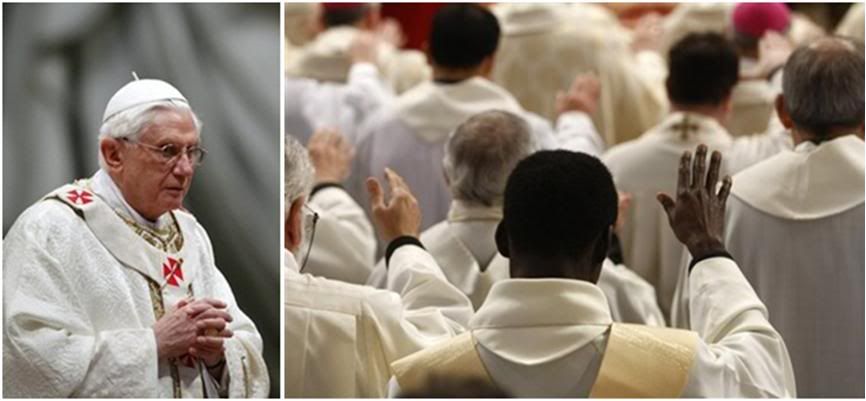
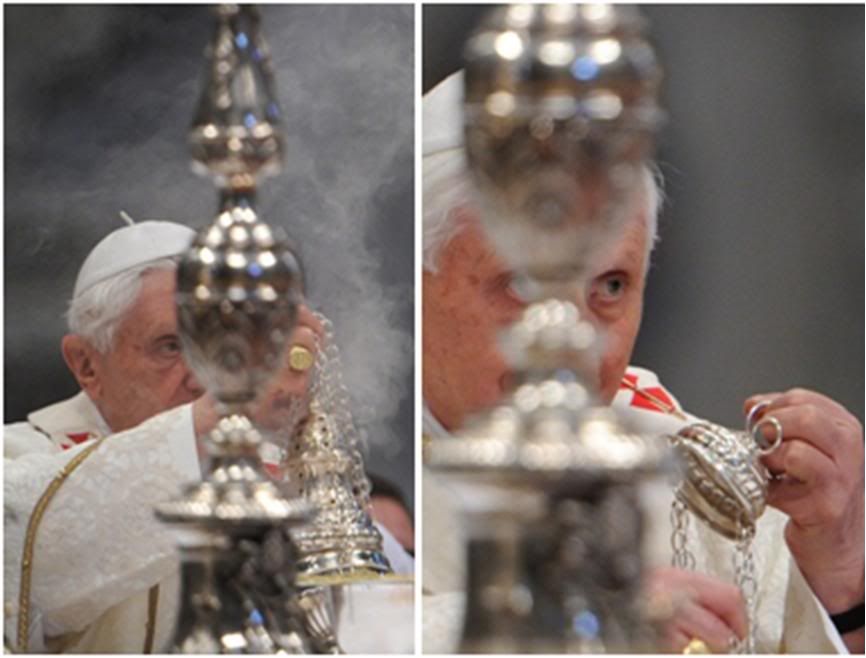
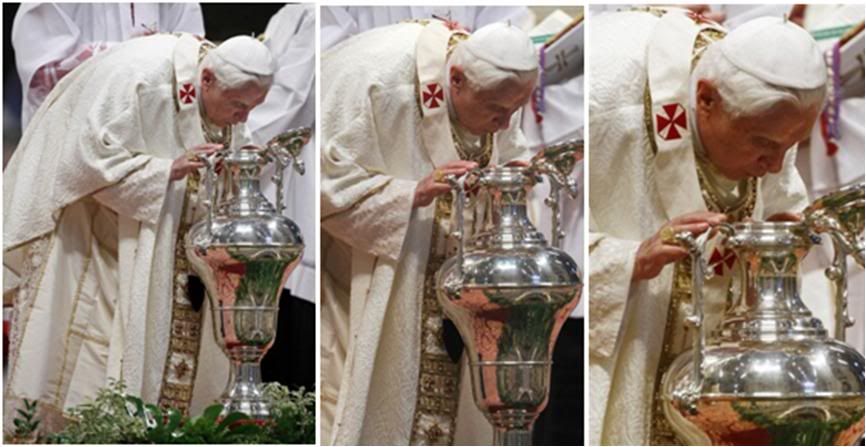
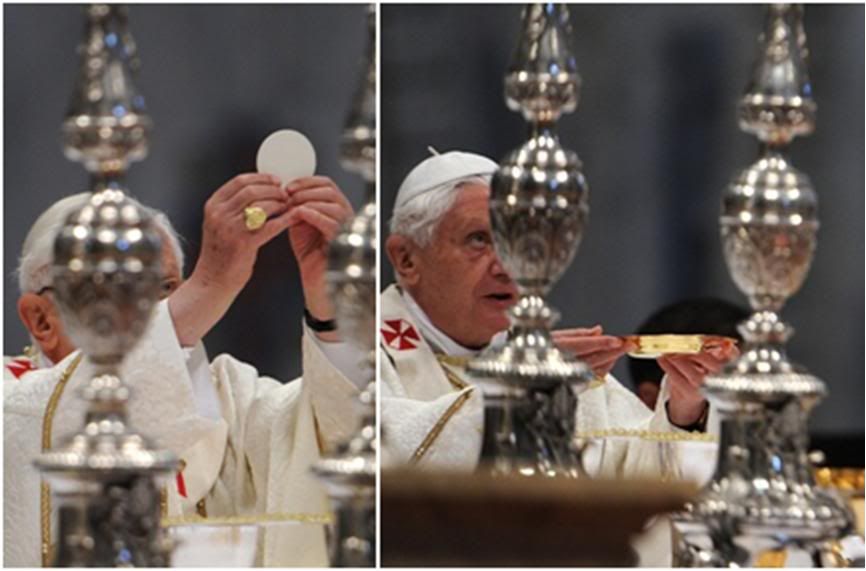
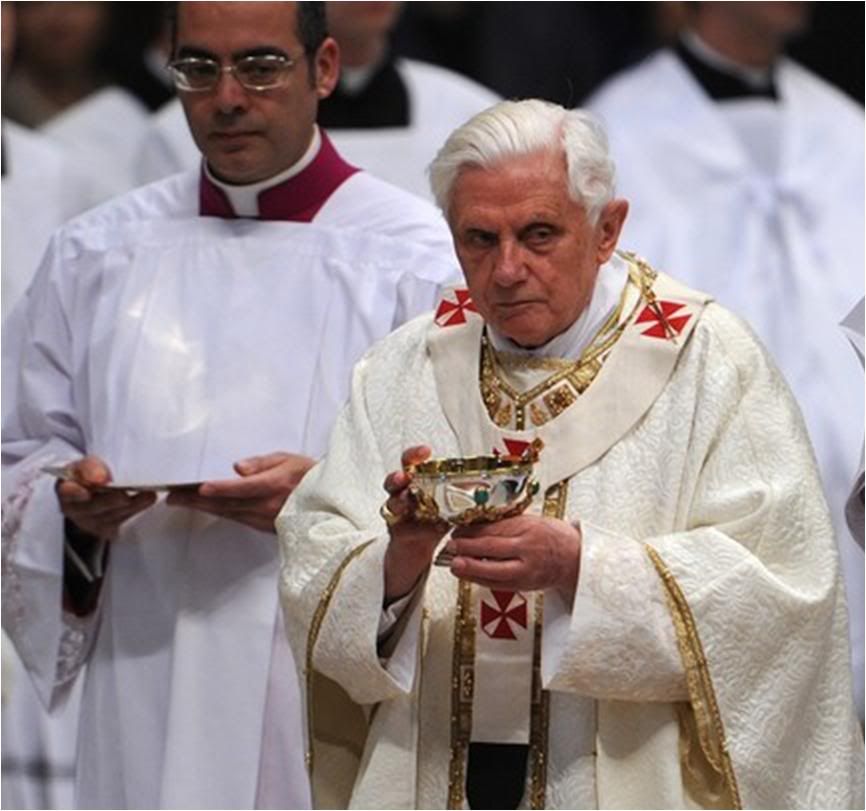
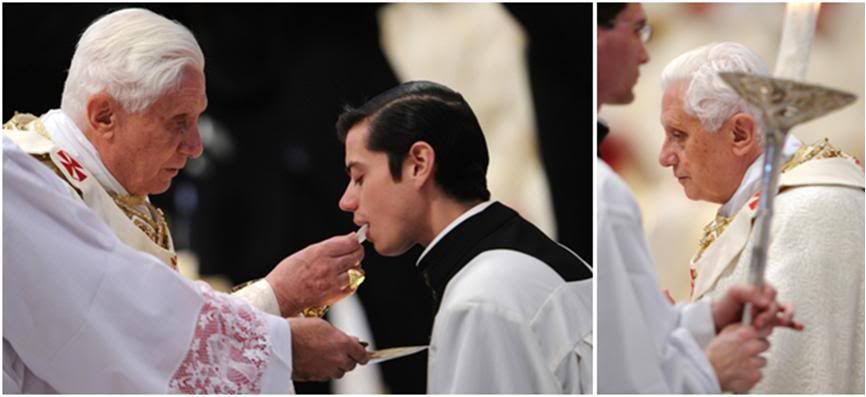
[Modificato da TERESA BENEDETTA 02/04/2010 02:10] |
| |
|
| |
 01/04/2010 22:18 01/04/2010 22:18 |
|
| | | OFFLINE | | Post: 19.817
Post: 2.459 | Registrato il: 28/08/2005
Registrato il: 20/01/2009 | Administratore | Utente Veteran | |
|


 MASS OF THE LORD'S SUPPER
MASS OF THE LORD'S SUPPER
MAUNDY THURSDAY
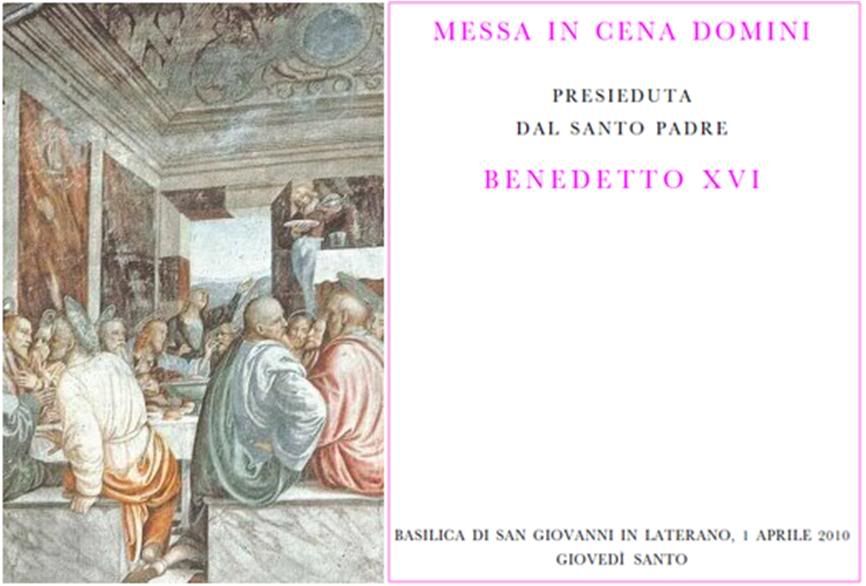
On Thursday afternoon, the Holy Father presided at the Mass of the Lord's supper ['in coena Domini'] at the Basilica of St. John Lateran, his seat as the Bishop of Rome.
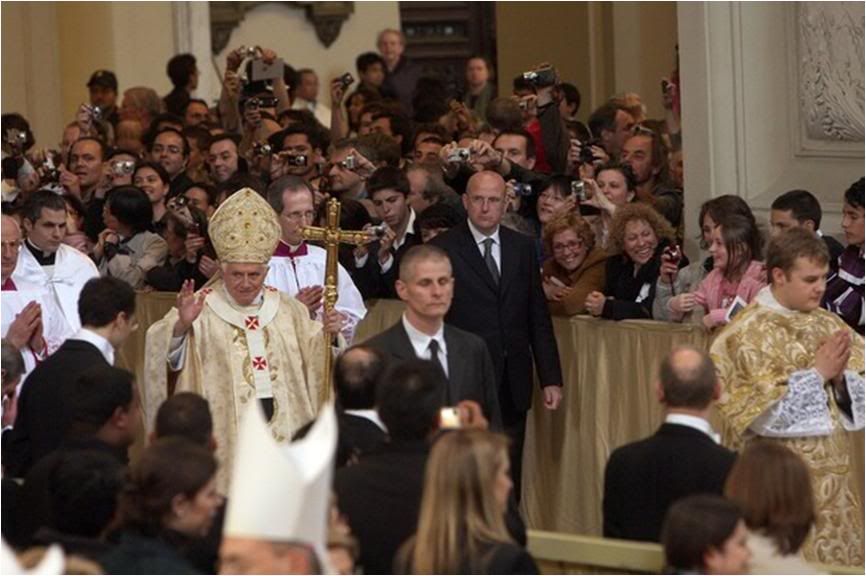
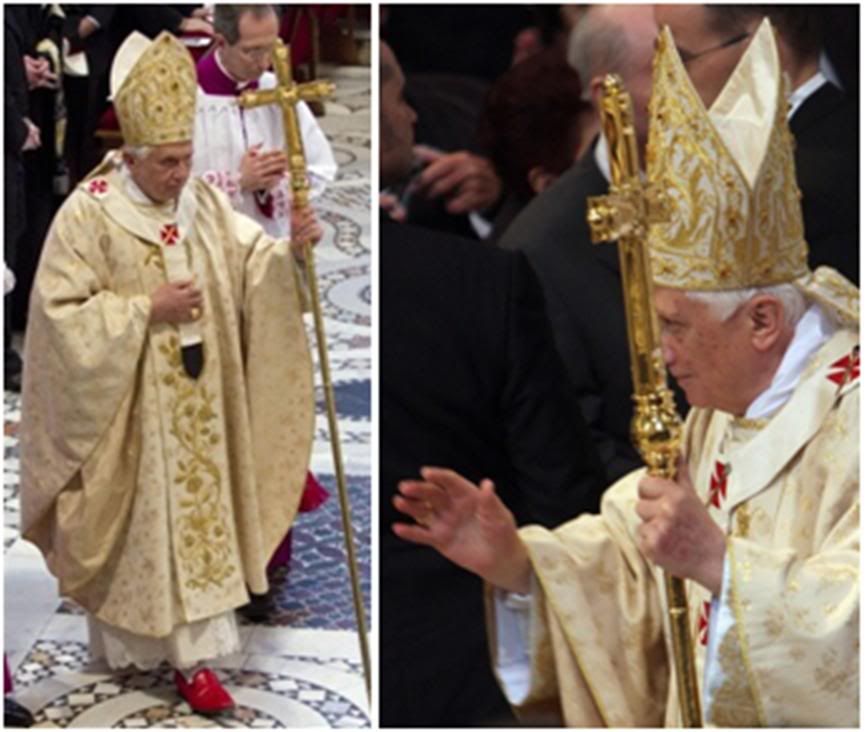
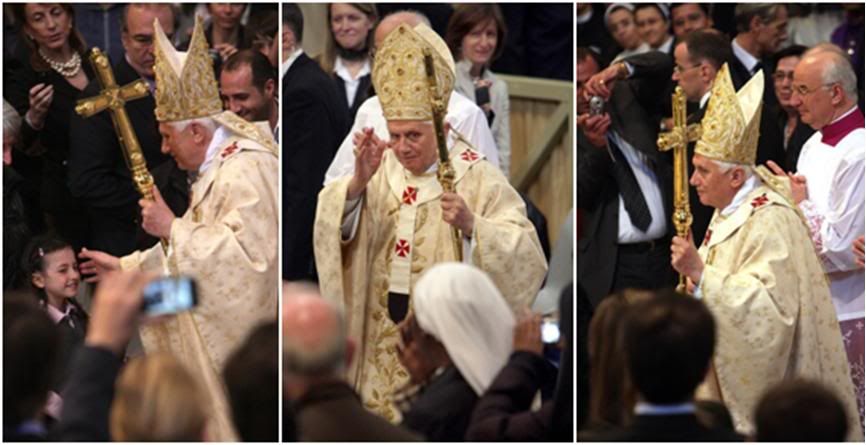
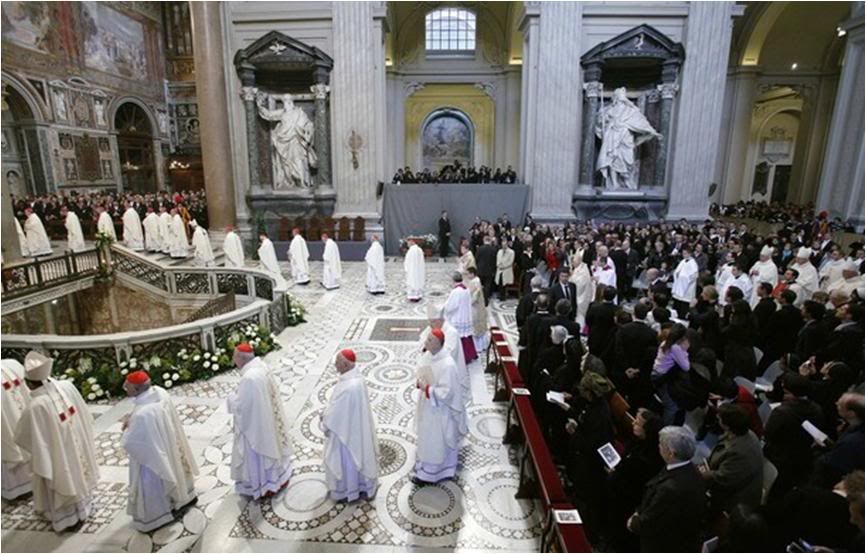
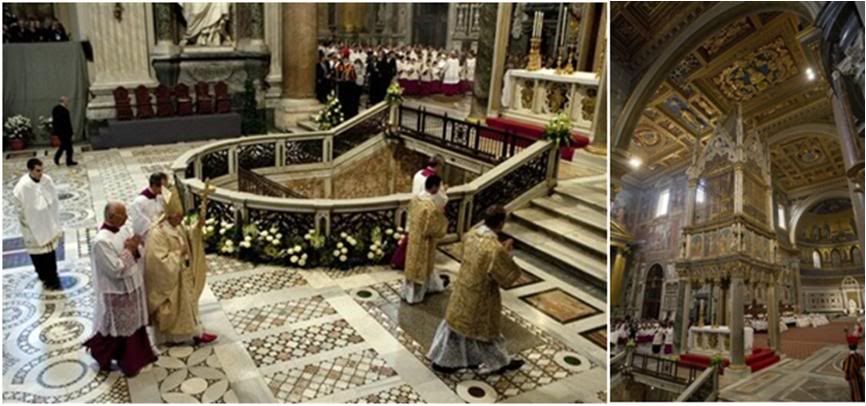
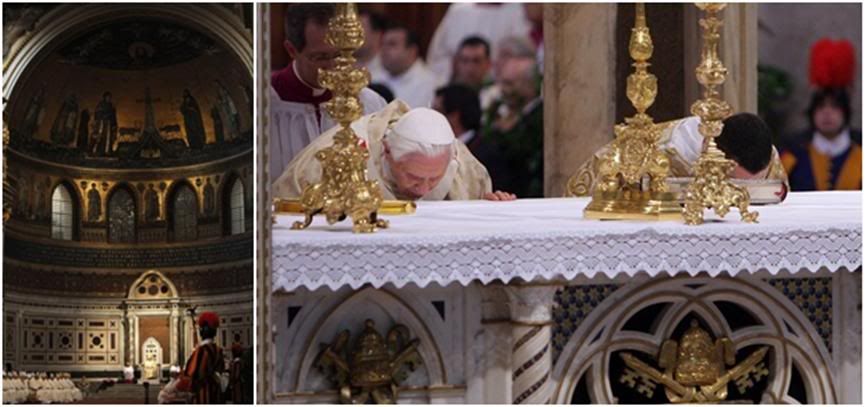
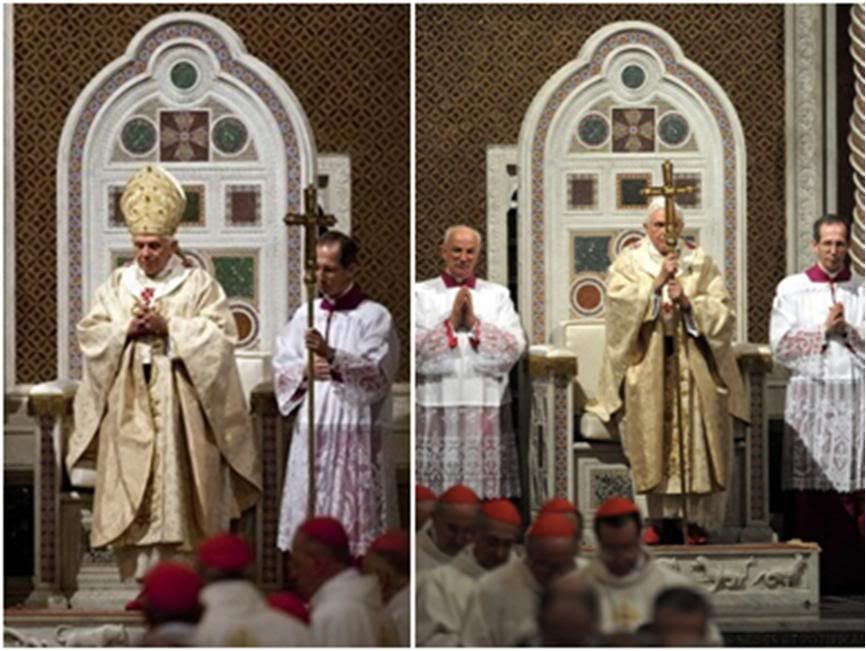
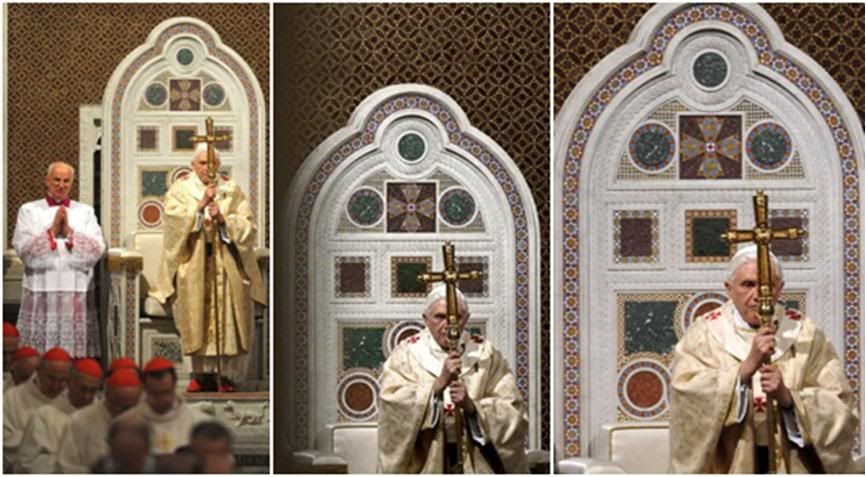
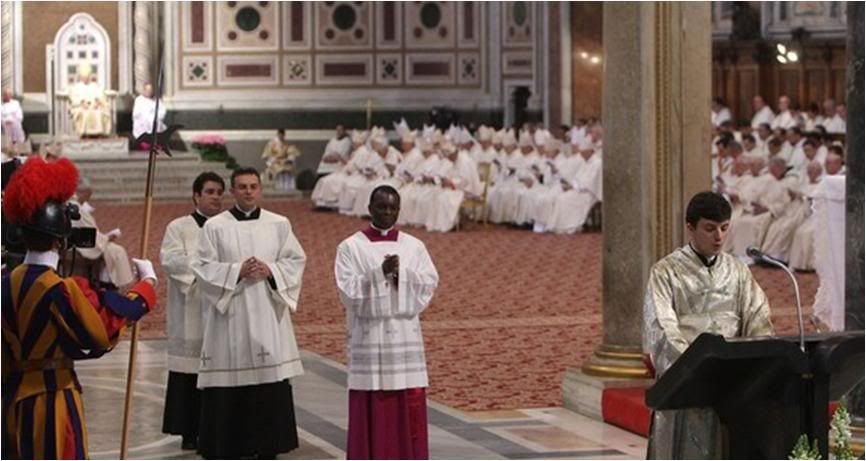
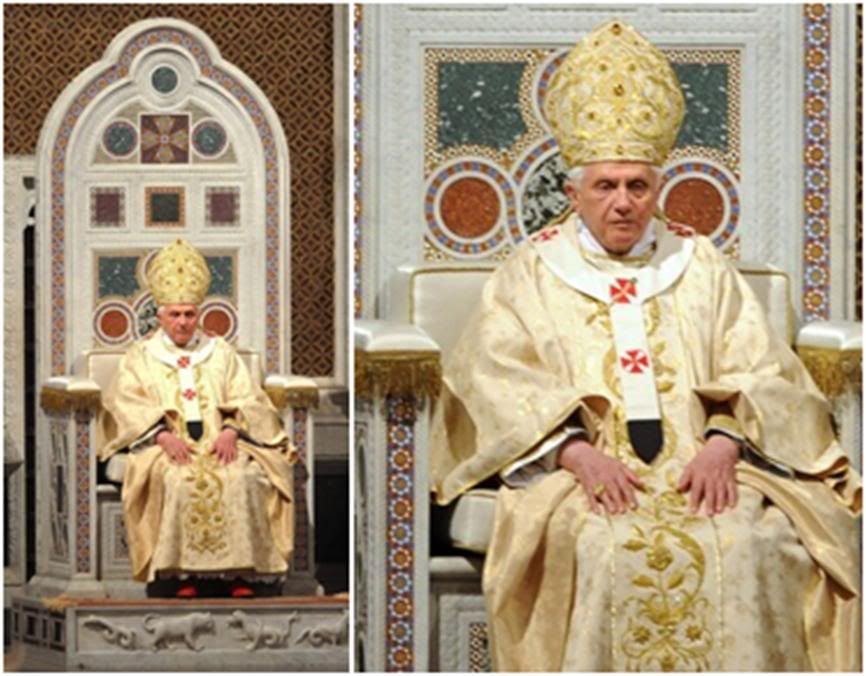
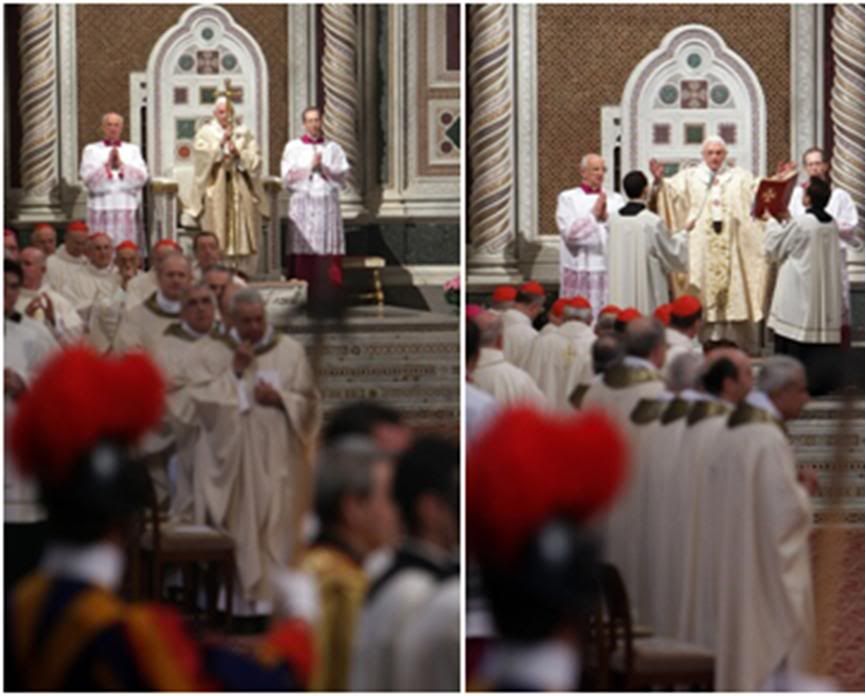
Here is the English translation of his homily, from the English site of Vatican Radio.
Dear Brothers and Sisters,
In his Gospel, Saint John, more fully than the other three evangelists, reports in his own distinctive way the farewell discourses of Jesus; they appear as his testament and a synthesis of the core of his message.
They are introduced by the washing of feet, in which Jesus’s redemptive ministry on behalf of a humanity needing purification is summed up in a gesture of humility.
Jesus’s words end as a prayer, his priestly prayer, whose background exegetes have traced to the ritual of the Jewish feast of atonement. The significance of that feast and its rituals – the world’s purification and reconciliation with God – is fulfilled in Jesus’s prayer, a prayer which anticipates his Passion and transforms it into a prayer.
The priestly prayer thus makes uniquely evident the perpetual mystery of Holy Thursday: the new priesthood of Jesus Christ and its prolongation in the consecration of the Apostles, in the incorporation of the disciples into the Lord’s priesthood.
From this inexhaustibly profound text, I would like to select three sayings of Jesus which can lead us more fully into the mystery of Holy Thursday.
First, there are the words: “This is eternal life, that they may know you, the only true God, and Jesus Christ, whom you have sent” (Jn 17:3).
Everyone wants to have life. We long for a life which is authentic, complete, worthwhile, full of joy. This yearning for life coexists with a resistance to death, which nonetheless remains unescapable.
When Jesus speaks about eternal life, he is referring to real and true life, a life worthy of being lived. He is not simply speaking about life after death. He is talking about authentic life, a life fully alive, and thus not subject to death, yet one which can already, and indeed must, begin in this world.
Only if we learn even now how to live authentically, if we learn how to live the life which death cannot take away, does the promise of eternity become meaningful.
But how does this happen? What is this true and eternal life which death cannot touch? We have heard Jesus’s answer: this is eternal life, that they may know you – God – and the one whom you have sent, Jesus Christ.
Much to our surprise, we are told that life is knowledge. This means first of all that life is relationship. No one has life from himself and only for himself. We have it from others and in a relationship with others.
If it is a relationship in truth and love, a giving and receiving, it gives fullness to life and makes it beautiful. But for that very reason, the destruction of that relationship by death can be especially painful, it can put life itself in question.
Only a relationship with the One who is himself Life can preserve my life beyond the floodwaters of death, can bring me through them alive.
Already in Greek philosophy we encounter the idea that man can find eternal life if he clings to what is indestructible – to truth, which is eternal. He needs, as it were, to be full of truth in order to bear within himself the stuff of eternity.
But only if truth is a Person, can it lead me through the night of death. We cling to God – to Jesus Christ the Risen One. And thus we are led by the One who is himself Life. In this relationship we too live by passing through death, since we are not forsaken by the One who is himself Life.
But let us return to Jesus’s words – this is eternal life: that they know you and the One whom you have sent.
Knowledge of God becomes eternal life. Clearly “knowledge” here means something more than mere factual knowledge, as, for example, when we know that a famous person has died or a discovery was made.
Knowing, in the language of sacred Scripture, is an interior becoming one with the other. Knowing God, knowing Christ, always means loving him, becoming, in a sense, one with him by virtue of that knowledge and love.
Our life becomes authentic and true life, and thus eternal life, when we know the One who is the source of all being and all life. And so Jesus’s words become a summons: let us become friends of Jesus, let us try to know him all the more! Let us live in dialogue with him! Let us learn from him how to live aright, let us be his witnesses! Then we become people who love and then we act aright. Then we are truly alive.
Twice in the course of the priestly prayer Jesus speaks of revealing God’s name. “I have made your name known to those whom you gave me from the world” (v. 6). “I have made your name known to them, and I will make it known, so that the love with which you have loved me may be in them, and I in them” (v. 26).
The Lord is alluding here to the scene of the burning bush, when God, at Moses’s request, had revealed his name. Jesus thus means to say that he is bringing to fulfilment what began with the burning bush; that in him, God, who had made himself known to Moses, now reveals himself fully.
And that in doing so he brings about reconciliation; that the love with which God loves his Son in the mystery of the Trinity now draws men and women into this divine circle of love.
But what, more precisely, does it mean to say that the revelation made from the burning bush is finally brought to completion, fully attains its purpose?
The essence of what took place on Mount Horeb was not the mysterious word, the “name” which God had revealed to Moses, as a kind of mark of identification.
To give one’s name means to enter into relationship with another. The revelation of the divine name, then, means that God, infinite and self-subsistent, enters into the network of human relationships; that he comes out of himself, so to speak, and becomes one of us, present among us and for us.
Consequently, Israel saw in the name of God not merely a word steeped in mystery, but an affirmation that God is with us. According to sacred Scripture, the Temple is the dwelling-place of God’s name. God is not confined within any earthly space; he remains infinitely above and beyond the world. Yet in the Temple he is present for us as the One who can be called – as the One who wills to be with us.
This desire of God to be with his people comes to completion in the incarnation of the Son. Here what began at the burning bush is truly brought to completion: God, as a Man, is able to be called by us and he is close to us.
He is one of us, yet he remains the eternal and infinite God. His love comes forth, so to speak, from himself and enters into our midst.
The mystery of the Eucharist, the presence of the Lord under the appearances of bread and wine, is the highest and most sublime way in which this new mode of God’s being-with-us takes shape.
“Truly you are a God who is hidden, O God of Israel”, the prophet Isaiah had prayed (45:15). This never ceases to be true. But we can also say: Truly you are a God who is close, you are a God-with-us. You have revealed your mystery to us, you have shown your face to us. You have revealed yourself and given yourself into our hands…
At this hour joy and gratitude must fill us, because God has shown himself, because he, infinite and beyond the grasp of our reason, is the God who is close to us, who loves us, and whom we can know and love.
The best-known petition of the priestly prayer is the petition for the unity of the disciples, now and yet to come: “I do not ask only on behalf of these – the community of the disciples gathered in the Upper Room – but also on behalf of those who will believe in me through their word, that they may all be one. As you, Father, are in me, and I am in you, may they also be in us, so that the world may believe that you have sent me” (v. 20ff.; cf. vv. 11 and 13).
What exactly is the Lord asking for? First, he prays for his disciples, present and future. He peers into the distance of future history. He sees the dangers there and he commends this community to the heart of the Father. He prays to the Father for the Church and for her unity.
It has been said that in the Gospel of John the Church is not present. Yet here she appears in her essential features: as the community of disciples who through the apostolic preaching believe in Jesus Christ and thus become one.
Jesus prays for the Church to be one and apostolic. This prayer, then, is properly speaking an act which founds the Church. The Lord prays to the Father for the Church. She is born of the prayer of Jesus and through the preaching of the Apostles, who make known God’s name and introduce men and women into the fellowship of love with God.
Jesus thus prays that the preaching of the disciples will continue for all time, that it will gather together men and women who know God and the one he has sent, his Son Jesus Christ. He prays that men and women may be led to faith and, through faith, to love.
He asks the Father that these believers “be in us” (v. 21); that they will live, in other words, in interior communion with God and Jesus Christ, and that this inward being in communion with God may give rise to visible unity.
Twice the Lord says that this unity should make the world believe in the mission of Jesus. It must thus be a unity which can be seen – a unity which so transcends ordinary human possibilities as to become a sign before the world and to authenticate the mission of Jesus Christ.
Jesus’s prayer gives us the assurance that the preaching of the Apostles will never fail throughout history; that it will always awaken faith and gather men and women into unity – into a unity which becomes a testimony to the mission of Jesus Christ.
But this prayer also challenges us to a constant examination of conscience. At this hour the Lord is asking us: are you living, through faith, in fellowship with me and thus in fellowship with God? Or are you rather living for yourself, and thus apart from faith? And are you not thus guilty of the inconsistency which obscures my mission in the world and prevents men and women from encountering God’s love?
It was part of the historical Passion of Jesus, and remains part of his ongoing Passion throughout history, that he saw, and even now continues to see, all that threatens and destroys unity.
As we meditate on the Passion of the Lord, let us also feel Jesus’s pain at the way that we contradict his prayer, that we resist his love, that we oppose the unity which should bear witness before the world to his mission.
At this hour, when the Lord in the most holy Eucharist gives himself, his body and his blood, into our hands and into our hearts, let us be moved by his prayer.
Let us enter into his prayer and thus beseech him: Lord, grant us faith in you, who are one with the Father in the Holy Spirit. Grant that we may live in your love and thus become one, as you are one with the Father, so that the world may believe. Amen.
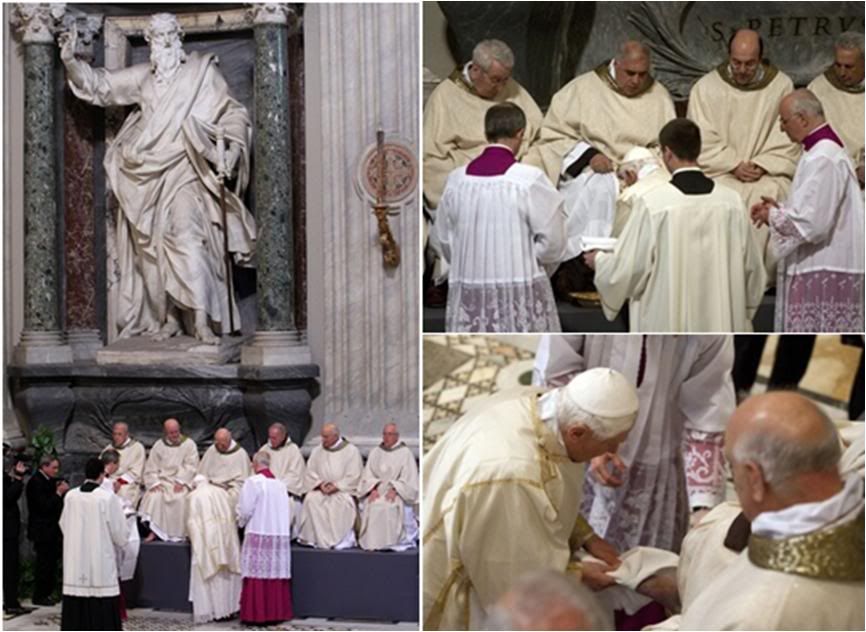
The Mass included the ritual of washing the feet. Commemorating Jesus's humble act before the Last Supper, the Holy Father draped an apron over his dalmatic and performed the ritual on twelve Roman men representing the Apostles.
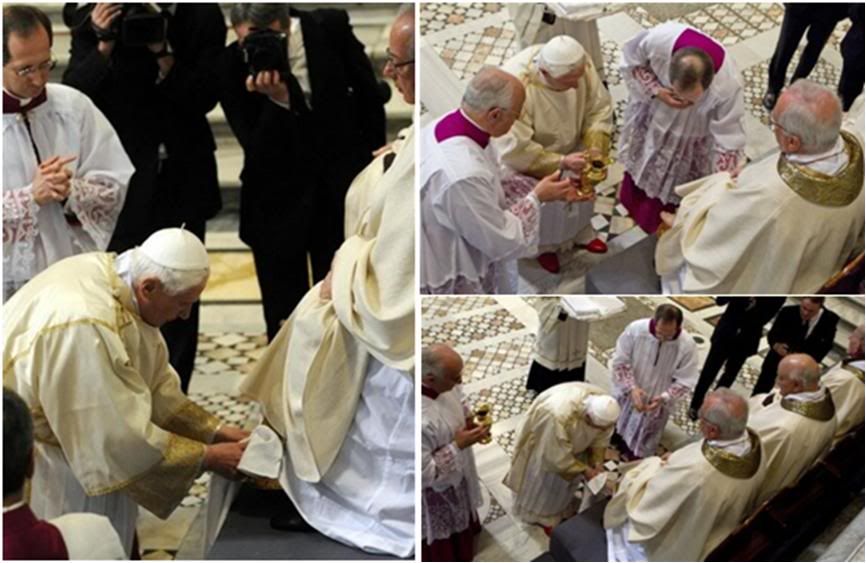
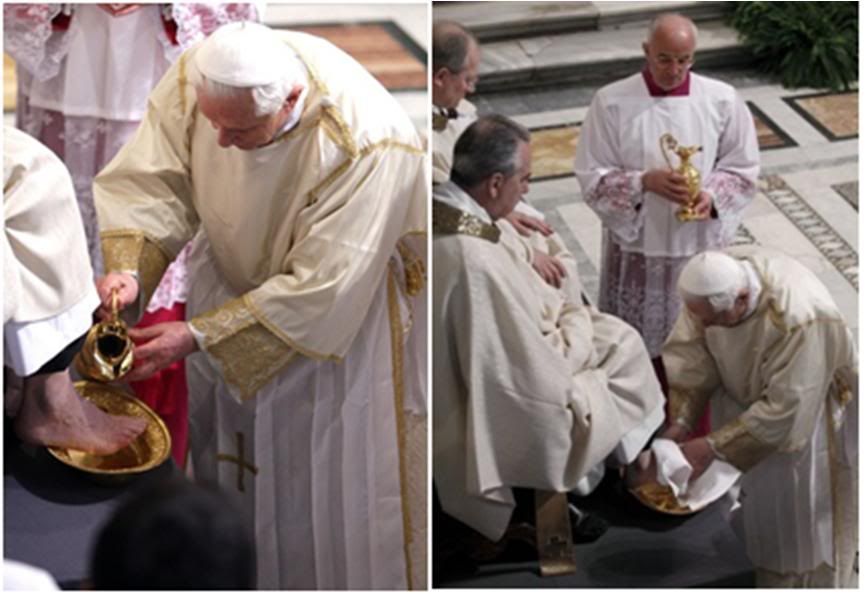
The Mass ended with a procession from the main altar of the basilica, during which the Holy Father carried a ciborium of consecrated hosts to the Chapel of the Blessed Sacrament for exposition and adoration of the faithful between now and Easter.
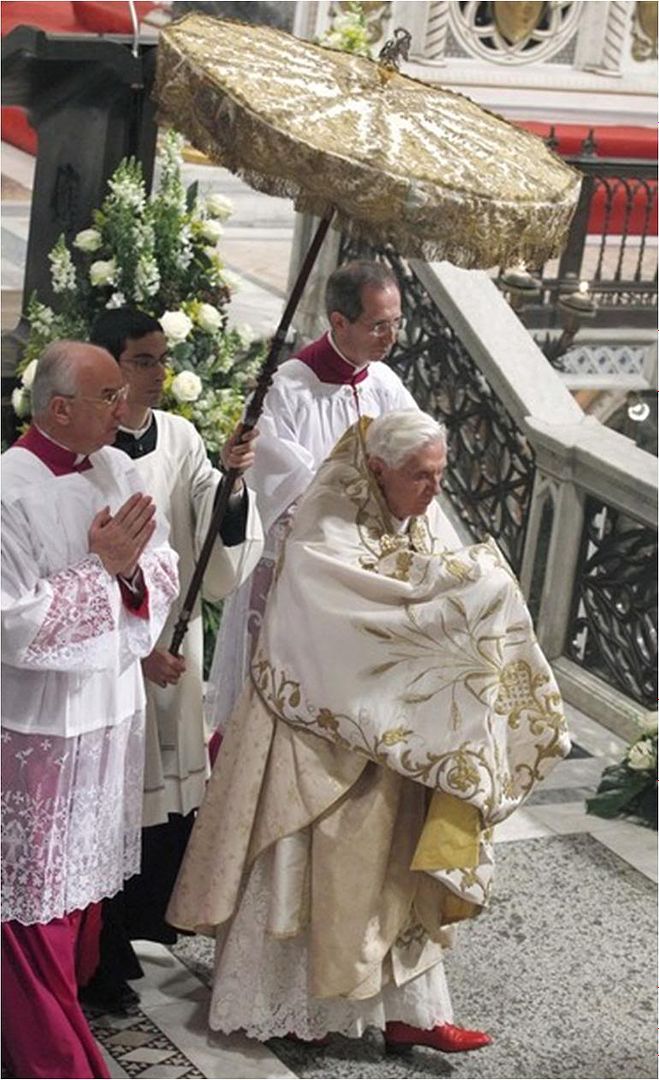
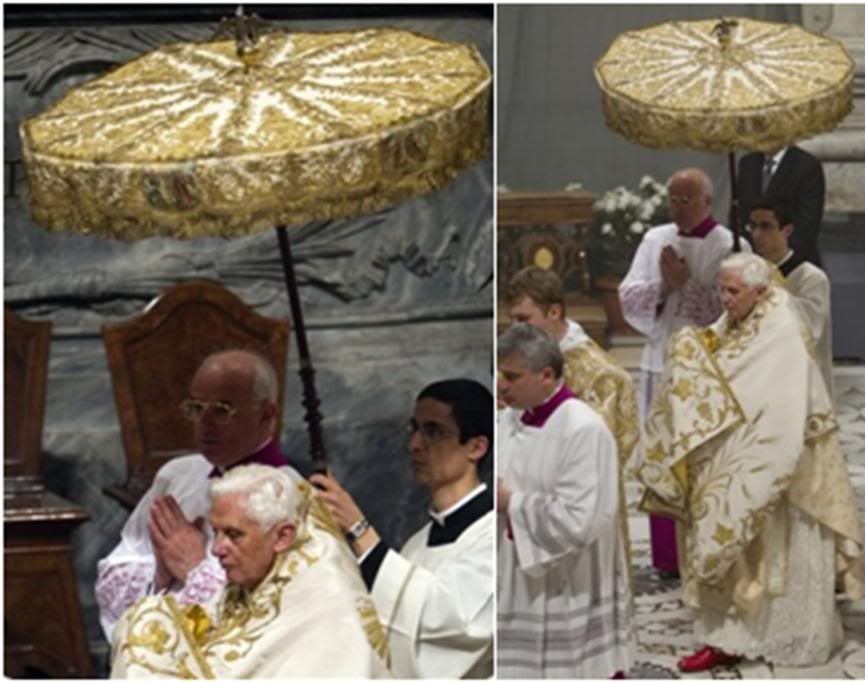
[Modificato da TERESA BENEDETTA 02/04/2010 03:35] |
| |
 02/04/2010 02:11 02/04/2010 02:11 |
|
| | | OFFLINE | | Post: 19.818
Post: 2.460 | Registrato il: 28/08/2005
Registrato il: 20/01/2009 | Administratore | Utente Veteran | |
|

 I am forced to use this story because it reports a number of developments, including a reaction from the New York Times, but be warned that it was written by AP's most vicious Vaticanista, who loads his report with all the value-laden adjectives and verbs he can mobilize to reflect negatively on the Pope and the Vatican.
Vatican lashes out
I am forced to use this story because it reports a number of developments, including a reaction from the New York Times, but be warned that it was written by AP's most vicious Vaticanista, who loads his report with all the value-laden adjectives and verbs he can mobilize to reflect negatively on the Pope and the Vatican.
Vatican lashes out
against sex abuse coverage
By VICTOR L. SIMPSON

VATICAN CITY, April 1 (AP) – Cardinals rushed to Pope Benedict XVI's defense on Holy Thursday amid accusations [And by whom exactly? Not by anyone in the Church, but by the media and the money-obsessed, publicity-hunting lawyers representing some victims] he played a role in covering up sex abuse scandals, as an increasingly angry Vatican made a stinging attack on the U.S. media for its coverage.
The relationship between the Church and the media has become increasingly bitter as the scandal buffeting the 1 billion-member Church has touched the pontiff himself. On Wednesday, the Church singled out the New York Times for criticism in an unusually harsh attack.
Western news organizations, including The Associated Press, have reported extensively on the burgeoning scandal, and new revelations have emerged on an almost daily basis.
[New revelations? On an almost daily basis? There has not been a single new revelation in two weeks, and outside of the New York Times with its three carefully orchestrated 'revelations' on the Hullerman case in Munich and the Murphy case - which were not new insofar as the abuses the two priests were accused of, but new in terms of seeking to discredit the Pope for, at the very least, tolerating both priests in the Church even in the light of their offenses. An accusation that they are able to insinuate only by manipulating their presentation of the facts to ignore the context of the limited action the future Pope carried out with respect to each of them.]
Venice's Cardinal Angelo Scola expressed solidarity with Benedict in his Holy Thursday homily in the lagoon city, describing him as a victim of "deceitful accusations." He praised the Pope as seeking to remove all "dirt" from the priesthood.
Warsaw Archbishop Kazimierz Nycz said the church should take notice of individual tragedies and treat sex abuse cases very seriously, but at the same time. he criticized the media for "targeting the whole church, targeting the pope, and to that we must say `no' in the name of truth and in the name of justice."
And Vienna's Cardinal Christoph Schoenborn, speaking of Benedict's long years as head of a Vatican office that investigates abuse, said the future pope "had a very clear line of not covering up but clearing up."
He earlier reflected on the issue at a service in Vienna's cathedral Wednesday evening:
"I admit that I often feel a sense of injustice these days. Why is the church being excoriated? Isn't there also abuse elsewhere? ... And then I'm tempted to say: Yes, the media just don't like the church! Maybe there's even a conspiracy against the church? But then I feel in my heart that no, that's not it." [Fine! 'Make nice" as usual, with everyone!, even when they are clearly in the wrong!]
The Church on Wednesday presented its highest-level official response yet to one of the most explosive recent revelations regarding sex abuse — a story the Times broke on the church's decision in the 1990s not to defrock a Wisconsin priest accused of molesting deaf boys.
[BTW, Cardinal Levada's response was a personal response, not an official response, although the Vatican has now posted on its resources site.]
It was the latest in a series of attacks on the press [That's the way the liberal ideologues are - and we in the United States can cite evidence piling up of the Obama Democrats carrying out exactly this shameful completely amoral behavior: when the media is making accusations, no matter how unfounded, distorted or exaggerated, they ar being righteous. When the Church (or whoever their target happens to be) responds with the truth - 'just the facts, Ma'am', as America's favorite cop from Dragnet used to say - to correct false or misrepresented information, she is attacking! She does not have a right to answer accusations, just or unjust? The media have started Crusades in the past if they thought that some accused person - even if he has admitted to murdering someone - was not given a chance to tell his side.]
Last week, L'Osservatore Romano, denounced what it said was a "clear and despicable intention" by the media to strike at Benedict "at any cost."
In the article posted Wednesday on the Vatican's Web site, Cardinal William Levada, head of the Congregation for the Doctrine of the Faith, wrote: "I am not proud of America's newspaper of record, the New York Times, as a paragon of fairness."
Levada, an American, said the newspaper wrongly used the case of the Rev. Lawrence Murphy to find fault in Benedict's handling of abuse cases.
A Times spokeswoman defended the articles and said no one has cast doubt on the reported facts.
[No one casts doubt on the facts themselves - only on the highly misleading story that the Times chose to make of those facts, using them to report half-truths and innuendoes obviously meant to be damaging to the Pope. They would never construct such arrant trumpery about one of their favorites, say, Barack Obama, would they?, let alone report on his actual faults and errors.
The glaring reality is that the Times - and the rest of MSM which has always had a herd mentality - have thoroughly and completely ignored the statement of Fr. Brundage which contradicts their account of the facts in many important ways. But the liberal media stand together, and so the AP, too, ignores that very obvious fact, one it would never ignore if the news organization shown to be loose with the facts were Catholic! The Catholic news organizations should hammer that home - after Holy Week.]
"The allegations of abuse within the Catholic church are a serious subject, as the Vatican has acknowledged on many occasions," said Diane McNulty. "Any role the current Pope may have played in responding to those allegations over the years is a significant aspect of this story."
[Fine, but report the facts as they are, not as you want them to be! Everyone who has had the privilege of knowing Benedict XVI in person is unanimous that he does not need anyone to defend him - he will stand or fall on his own record, and that's a record that has now been seriously falsified in the public eye by the anti-Catholic media. On the basis of two csaes in which his tenuous personal involvement has been gleefully inflated short of accusing him of moral turpitude himself!]
Two sidelights from last Wednesday's General Audience:
Youths from the International UNIV Congress
show their support for the Pope
Adapted from

March 31, 2010
University students from all over the world have given Benedict XVI a letter and their thanks on the fifth anniversary of his papacy.
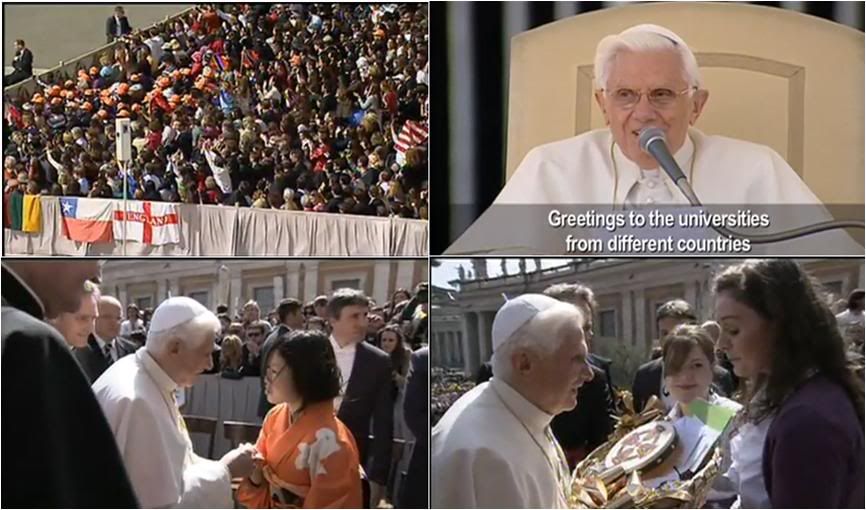 Bottom right photo: Natasha from Ireland gives the Pope a drum and a St. Patrick's Cross.
Bottom right photo: Natasha from Ireland gives the Pope a drum and a St. Patrick's Cross.
More than 4,000 students from 200 universities that participated in the UNIV congress held in Rome came to the General Audience Wednesday to show their support.
The Pope greeted them and thanked them in four languages for their visit during this significant time of Holy Week. “Greetings to the university students from different countries that are participating in the International congress promoted by the Prelature of Opus Dei.”
In his message, the Pope used words from St. Josemaria Escriva, Opus Dei founder and inspirator of the UNIV congress.
"The liturgies of these days invite us to ponder Christ’s saving sacrifice and his promise of new life. In this Year for Priests, the Holy Thursday Chrism Mass, at which priests renew the promises made on the day of their ordination, will take on a particular significance. May priests everywhere be conformed ever more closely to Christ as heralds of his message of hope, reconciliation and peace.”
“I invite all of you to pray for those priests who will renew their priestly promises along with their bishops tomorrow during Chrism Mass. We ask that their happiness and love for Christ grows stronger each day so that they’ll be able to deliver hope, reconciliation and peace to their brothers.”
In the letter handed to Benedict XVI, the students expressed their support in the midst of the issues facing the Church in recent weeks due to the sexual abuse crisis.
Some of the students at the GA expressed their feelings to Roem Reports:
Alfonso Herrero said "(we are here) overall, to recognize the Pope's work, his person and to recognize what he represents”.
Matt Anthony: "He has tremendous intellectual talents and has written widely and has been a professor, and he always uses his intellect and his writings to do what he can to spread the truth.”
Natasha, a participant from Ireland, thanked the Pope for his letter to Irish Catholics and for bringing attention to the sexual abuse cases.
She gave the Pope a drum, a symbol to resonate the Pope’s message, along with a cross of St. Patrick.
The Irish delegates also asked the Pope to bless 500 rosaries which they will distribute to pray for the pope’s intentions.
The UNIV congress participants will be in Rome until Easter Sunday to attend Holy Week ceremonies.
A second youth sidelight:
Benedict XVI is the first person to wear the hat pilgrims will wear during World Youth Day Madrid 2011, which is 500 days away.
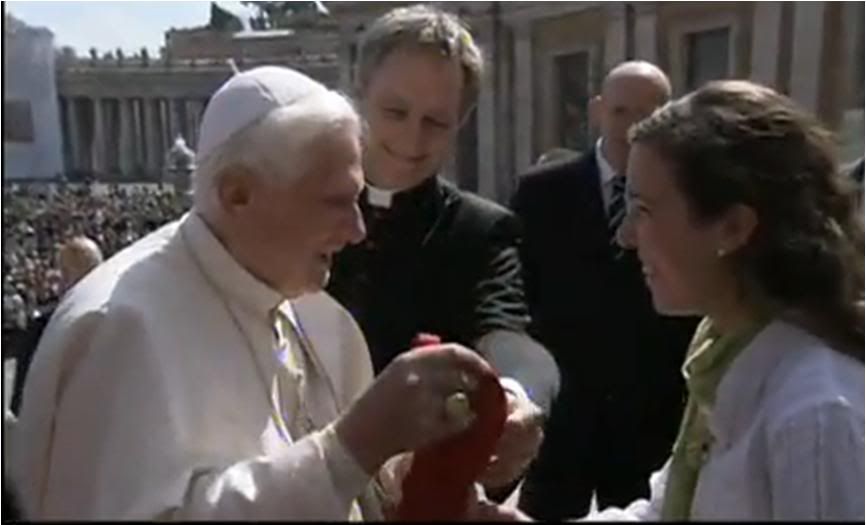

The cap was presented to him by Paula Rodriguez, from a delegation representing WYD Madrid: “He took my hat, put it on, and looked me in the eyes as if saying, does it look good on me?”
During the Pope’s greeting, he thanked everyone involved in organizing World Youth Day.
Youths worldwide chose the cap design. Pilgrims will receive it in a backpack along with a shirt and a rosary.
 The big bad media might just be mean enough to launch new stink bombs between Good Friday and Easter, and I hate to think we may have to deal with any new nastiness at this time.
The big bad media might just be mean enough to launch new stink bombs between Good Friday and Easter, and I hate to think we may have to deal with any new nastiness at this time.
In any case, I realized tonight just how little effect Father Brundage's statement made on the outside world, principally because the MSM followed the lead of the New York Times and ignored it completely - although they picked up Cardinal Levada's statement, not because of what he had to say but because of who he is. Not just a member of the Curia but Cardinal Ratzinger's successor at the CDF.
However, none of them give any details of his statement at all! Fine way to report a 'defense' when you don't even state what that defense is!
My eye-opener came when listening to the nightly news panel discussion on Fox News - in which the anchorman and his three panelists all clearly were unaware of the Brundage statement, and they were basing their opinions completely on the New York Times account.
One of them did not even know about the Pope's letter to the Irish and spoke as if the Church had not done a thing about this issue at all. Worst of all, they played a clip of an interview with Father Z, in which he agrees with the interviewer that this has 'tremendously damaged the moral authority of the Church around the world'.
With all due respect to Fr. Z, I look at the faithful who crowd St. Peter's Square and the Pope's liturgies, and I think they represent the overwhelming majority of us, simple faithful, to whom faith comes naturally. We have that faith in all the basic things that we have been taught about our religion - when you just 'know' in your heart and in your bones and in every fiber that they are 'right' and you do not even have to 'reason why' (though it would be good to follow St. Peter's admonition).
The moral authority of the Church does not come from the men who 'run' it but from God himself, and the Pope, who is Christ's vicar on earth, is the moral authority that he is, because he represents the authority of Christ. No media assault can beat that down!]
Fortunately, two of the panelists (one Jewish, one Protestant - both conservative) independently were of the opinion that in its 2000-year history, the Church has gone through worse things before and has managed to right itself, and will do so again this time.
Even better, they both reminded their colleagues and the viewer that the Church went through a similar, if not worse, crisis when the US scandals broke at the start of the decade, and the Church emerged much better for it, especially in the US, while other national Churches have learned from the US experience. [Indeed, a selective historical amnesia has been very obvious in the reporting of the current 'crisis' - in which the MSM feign shock, horror, disgust, censure and condemnation, as if they hadn't already gone through the same exercise eight years ago!}
In the merciless daily cut-and-thrust of the media who want the Church and religion to die a thousand deaths, and each death by a thousand cuts, we perhaps tend to forget that. It gives me a better perspective but no better tolerance nor patience for the dirty tricks of the media who long ago lost any sense of decency, fairness and justice.
Meanwhile, Oremus pro Pontefice nostro, and all his intentions...
[Modificato da TERESA BENEDETTA 02/04/2010 13:32] |
| |
 02/04/2010 12:21 02/04/2010 12:21 |
|
| | | OFFLINE | | Post: 19.819
Post: 2.461 | Registrato il: 28/08/2005
Registrato il: 20/01/2009 | Administratore | Utente Veteran | |
|

 I hope this AFP report today reflects the tone that MSM will take in these few days till Easter - it is exceptionally objective and does not interject the reporter's opinion aa the definitive judgment of events!
Paedophile priest scandal casts
I hope this AFP report today reflects the tone that MSM will take in these few days till Easter - it is exceptionally objective and does not interject the reporter's opinion aa the definitive judgment of events!
Paedophile priest scandal casts
pall over pre-Easter celebrations

ROME, April 2, 2010 (AFP) -The paedophile priest scandals rocking the Roman Catholic Church cast a pall over pre-Easter celebrations Thursday as Pope Benedict XVI avoided direct references to the crisis.
Celebrating Maundy Thursday Mass at Rome's Saint John in Lateran Basilica, the Pontiff commemorated Christ's Last Supper by washing the feet of 12 priests representing the apostles in a symbol of humility.
Earlier Thursday, the Pope made an oblique reference to the scandals as he recalled Jesus preaching to turn the other cheek.
"When he was reviled he did not revile in return; when he suffered, he did not threaten; but he trusted to him who judges justly," the Pontiff said in his homily at a Holy Thursday Mass in St Peter's Basilica.
The scandals have engulfed churches across Europe as well as the United States over the past five months.
Benedict himself has come under intense pressure with allegations published in the New York Times that, as archbishop of Munich and later as the chief Vatican enforcer of Catholic doctrine and morals, he failed to act against priests accused of child abuse.***
The Pontiff, 82, received a boost from the head of the US Catholic Church who Thursday defended his record in fighting predator priests, praising him for introducing measures to combat the scourge.
"It was Pope Benedict who gave us, in different ways, the ability to handle this crisis more quickly and in a way that helps to heal," Chicago Archbishop Francis George told Vatican Radio.
George said the then Cardinal Joseph Ratzinger, as head of the Congregation for the Doctrine of the Faith (CDF), "enabled us to keep the predators out of the priesthood permanently in ways that were not possible before and... encouraged us to reach out to victims."
Benedict headed the CDF from 1981 to 2005.
Late Wednesday, the current head of the CDF, Cardinal William Levada, slammed the Times' article, calling it "deficient by any reasonable standard of fairness" in a statement published on the Vatican website.
In the United States, a lawyer Tuesday went to court seeking to have Benedict questioned on what the Vatican knew about the long-running scandal.
The motion says Benedict was aware of clergy sex abuse in the United States and that he "discouraged prosecution of accused clergy and encouraged secrecy to protect the reputation of the Church" while heading the CDF.
It says documents released last week by the New York Times "unequivocally link Pope Benedict XVI... to child sexual abuse cases in the United States." [AFP is, of course, simply reporting what the absurd nuisance motion is about - still, it's the motion itself that is deepest purple!]
The Vatican newspaper Osservatore Romano last week denounced what it called an "ignoble attempt" to smear the Pope and his closest aides "at all costs."
In an editorial, the paper touted the Pope's "transparency, firmness and severity" in response to cases of sexual abuse by Catholic clergy.
A French bishop who met the Pope earlier this month said the Pontiff had been deeply affected by the accusations of paedophilia against the Catholic Church.
" He is not being allowed the presumption of innocence: I have confidence in his will to bring clarity," said Michel Dubost, bishop of Evry, near Paris.
Benedict has continually spoken out and apologised for the "heinous crime" of child sex abuse by priests, meeting victims in the United States and in Australia.
The Roman Catholic Church has designated 2010 the Year for Priests, and Benedict said Thursday's Chrism mass -- in which priests renew their vows including that of celibacy -- would "take on a particular significance."
The paedophilia scandals have led to calls for the Church to rethink the centuries-old requirement of celibacy for priests, but several leading prelates have rejected any link between the two.
Benedict earlier this month defended celibacy as a "sign of full devotion" and of an "entire commitment to the Lord".
On Friday, the Pope is to preside over a "Way of the Cross" procession at Rome's Colosseum recalling the crucifixion of Jesus Christ.
Saturday evening Benedict will hold an Easter vigil in St Peter's Square, where he will also celebrate Easter Mass on Sunday to be followed by his "urbi et orbi" (to the city and the world) blessing.
*** Has anyone noticed that all the MSM have simply parroted the Times accounts of Munich and Milwaukee, without ever attempting to obtain their own facts? When journalism was an honorable profession, each news organization would have carried out an independent fact check, if only to add something of their own to what was at best a secondary news source.
In this case, they did not even bother to check the documents that the Times itself posted which belie the pre-fabricated narrative. The Times was right only on one point - and they were clever enough to make it their headline - because in fact, the Vatican {by which they mean Cardinal Ratzinger's CDF) did not defrock Murphy.
But the CDF could not possibly have done that at the time, because 1) the Milwaukee diocese's own canonical proceedings - undertaken 35 years after the alleged offenses took place - had not been concluded; and 2) in 1996-1997, the CDF did not even have jurisdiction over sexual abuse cases yet, much less the direct authority to defrock priests. That belonged before 2001 to the Roman Rota.
However, the fact that Murphy wrote Cardinal Ratzinger asking for the canonical case to be dismissed against him was a convenient red herring for the Times. Because then-Archbishop Bertone used some of Murphy's reasons, not to tell the diocese to dismiss the case, but to propose immediate measures to insulate the diocese from any chance that Murphy could offend again, while the proceedings went on against him.
The 'PR' problem here is that the public has only seen the Times version of events, now perpetrated by all the other MSM - and even if they somehow get to see Father Brundage's statement, the poison instilled by the Times story has already crystallized in the public mind!
If the media were honest today, and interested in the truth rather than pushing their ideological agenda, they could not have failed to report on Father Brundage's demolition of the Times version of the Murphy case. And yet they ignored it totally! If Fr. Brundage had sent the letter to the Times as a letter to the editor of the Times, would they have published it, or even acknowledged it? From their record of having refused to publish a letter sent by Archbishop Dolan last October, I don't think so!
And I was naive enough when the Brundage statement came out to be near-delirious that the truth had come out, and that therefore, at least his side would be heard! It seems my own decades of personal experience in and with the media had not made me cynical enough, as I thought I was.
[Modificato da TERESA BENEDETTA 02/04/2010 12:54] |
| |
 02/04/2010 15:00 02/04/2010 15:00 |
|
| | | OFFLINE | | Post: 19.820
Post: 2.462 | Registrato il: 28/08/2005
Registrato il: 20/01/2009 | Administratore | Utente Veteran | |
|

 GOOD FRIDAY, April 2, 2010
GOOD FRIDAY, April 2, 2010
 The Crucifixion, from left: Giotto, 1304-1305; Masaccio, 1426; Michelangelo (sculpture), 1492; Raphael, 1502; and Van der Weyden, Entombment of Christ, 1451.
The Crucifixion, from left: Giotto, 1304-1305; Masaccio, 1426; Michelangelo (sculpture), 1492; Raphael, 1502; and Van der Weyden, Entombment of Christ, 1451.
OR today.
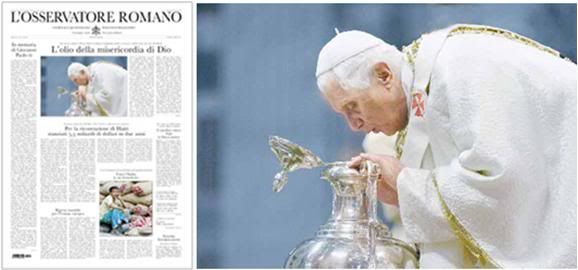 'The oil of God's mercy'
'The oil of God's mercy'
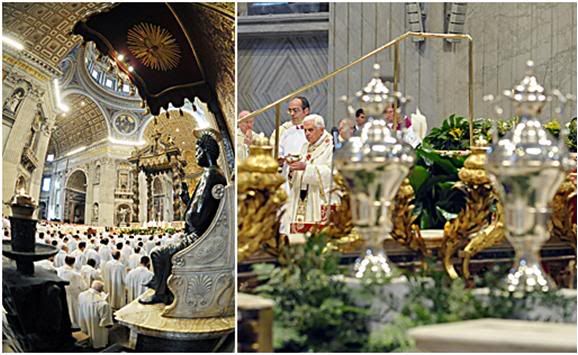
At the Chrismal Mass yesterday, Benedict XVI asks for rejection of injustice,
even when raised to a 'right' as abortion is.
Other Page 1 stories: An editorial to mark the fifth anniversary today of John Paul II's death; a brief item
on German Chancellor again praising the measures taken by the German bishops on the sex-abuse problem;
India starts a new census today - current estimates place its population at 1.28 billion; donor nations
at the UN agree to lay out $5.3-billion in rehabilitation aid for Haiti over the next two years. In the inside
pages, two stories on the sex-abuse issue: a report on statements earlier this week by Cardinal Levada and
Milwaukee Bishop Listecki; and a summary of bishops' statements of support fo the Pope at the Chrismal
Masses yesterday.
THE POPE'S DAY
5:00 PM - Celebration of the Passion of our Lord, St. Peter's Basilica
9:15 PM - Via Crucis at the Colosseum
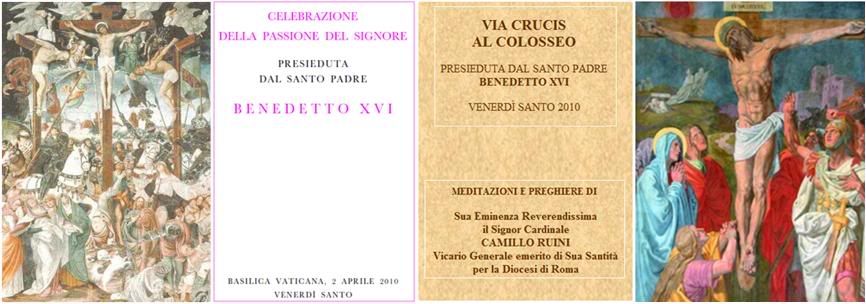
Today, we also remember:
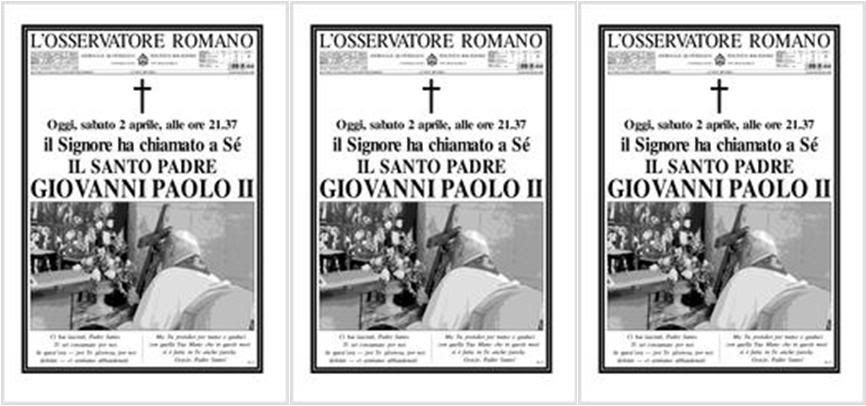 THE VENERABLE JOHN PAUL II (Karol Jozef Wojtyla) (1920-2005)
THE VENERABLE JOHN PAUL II (Karol Jozef Wojtyla) (1920-2005)
 ST. FRANCESCO DI PAOLA(b Italy 1419, d France 1507), Franciscan, Hermit, Founder of the Minims
ST. FRANCESCO DI PAOLA(b Italy 1419, d France 1507), Franciscan, Hermit, Founder of the Minims
[Modificato da TERESA BENEDETTA 02/04/2010 15:02] |
| |
 02/04/2010 15:40 02/04/2010 15:40 |
|
| | | OFFLINE | | Post: 30
Post: 30 | Registrato il: 19/03/2010
Registrato il: 19/03/2010 | Utente Comunità | Utente Junior | |
|
The Pope and the Pedophilia Scandal by Dr. Joaquin Navarro-Valls: La Repubblica - April 01, 2010
In the last two weeks, the media has filled the public space with the agonizing reality of criminal cases of pedophilia. The charges have risen gradually in response to a series of revelations coming from several European countries concerning instances of sexual abuse perpetrated against children by priests. To read the news, it even seems this is a huge scoop, and that now, thanks to these ingenious revelations, a rotten undergrowth is emerging in the breast of the Catholic Church.
Certainly, in Austria, Germany and Ireland, but no less in almost all countries where there is a consistent presence of Church schools and educational organizations, there has been the grave criminal phenomenon of violations of the dignity of childhood. That has been noted. Not by chance, during the Via Crucis of 2005, did the then Cardinal Joseph Ratzinger not mince his words when he noted with disappointment: “How much filth there is in the Church, and even among those who, in the priesthood, ought to belong entirely to him! How much pride, how much self-complacency!” Perhaps we have forgotten it. But you can without fear of contradiction point out that the problem exists in the Church, is known by the Church, and has been addressed and will be further addressed in future decisions by the Church.
But let’s try, for a moment, to reflect on the manifestation of pedophilia in itself. From my experience as a doctor I can highlight some important data useful to understanding the seriousness and the extent of the problem. The most reliable statistics speak for themselves. It’s certified that 1 in 3 girls have been sexually abused, and that 1 in 5 boys has been subjected to acts of violence. The truly alarming fact has been disclosed not only in scientific publications but even CNN reports that the percentage of respondents, in a representative sample of the population, has sexually molested a child ranges from 1% to 5%. That is a frightening number.
The acts of pedophilia are perpetrated by parents or close relatives. Brothers, sisters, mothers, uncles or babysitters are the most common abusers of children. According to the U.S. Justice Department, almost all accused pedophiles, 90 percent, are male. According to Diana Russell, 90% of sexual abuse is committed by people with direct knowledge of the young victims, and remain closed in the familiar ‘conspiracy of silence’. A notable aspect, unfortunately, is that 60% of the cases of violence affected people younger than 12 years, and in most cases abusers are males with blood ties.
These statistics show, therefore, a clear and fairly broad practice of sexual violence against children. Taking into account that these figures refer only to those that have been reported, are known or otherwise known, we can easily imagine the dramatic degree of perversion that lurks behind this reality, most common in countries whose cultures do not consider this violence to be an aberrant obscenity. Now, focusing exclusively on those abusers and singling out one group, such as priests, can be very misleading. In this case, the percentage has fallen to become a minimal phenomenon, statistically. Certainly, nothing can take away the emotion and shame that comes from these recent revelations in the Church, even when they refer to events that took place decades ago and perhaps covered by the most grave ‘conspiracies of silence’. We can be certain, beginning with the pastoral letter to Ireland last week, that Benedict XVI will take all measures that are needed to expel the guilty and judge them, based on real crimes committed by those involved.
Let us not, however, fall into the trap of hypocrisy, especially in the form of that recently staged by the New York Times in its report on the case of the Rev. Murphy. There, the author of the article does not evaluate, draw conclusions or give appropriate attention to the fact that the police had received complaints about him and had released him as an innocent man.
Which country has made an in-depth study of this grievous phenomenon, also taking clear and explicit preventive measures against the abuses of pedophilia among its citizens, in families or in public schools? What other religion has moved to find, publicly condemn and assume the problem, bringing it to light and explicitly pursuing it? We avoid, first of all, being insincere: namely to focus on the limited number of established cases of pedophilia in the Catholic Church, but without opening our eyes to the tragedy of a childhood violated and abused very often and everywhere, yet without scandal.
If we want to fight sexual crimes against children, at least in our democratic societies, we must avoid dirtying the public consciousness, looking only at the phenomenon where the moral gravity is perhaps even more, but in quantity certainly less. Before judging someone for something, one should have the guts and honesty to recognize that we [in society] are not doing enough, and look to do something similar to what the Pope is doing. Otherwise, it’s better to stop talking about pedophilia and start to discuss the raging phobia unleashed against the Catholic Church. This seems, in fact, to be being done with the meticulous care of an investigation, but unfortunately bad faith is in evidence.
www.ncregister.com/blog/navarro-valls_on_the_abuse_crisis/ |
| |
 02/04/2010 16:36 02/04/2010 16:36 |
|
| | | OFFLINE | | Post: 19.821
Post: 2.463 | Registrato il: 28/08/2005
Registrato il: 20/01/2009 | Administratore | Utente Veteran | |
|

 A surprising and welcome Good Friday feature from the Guardian! Blincoe (born 1965) has a PhD in philosophy, has written six novels, was a columnist for the Telegraph until 2006, and writes film scripts and TV documentaries. The Wiki article on him does not say what his religion is, but he writes as someone who has read Joseph Ratzinger.
A surprising and welcome Good Friday feature from the Guardian! Blincoe (born 1965) has a PhD in philosophy, has written six novels, was a columnist for the Telegraph until 2006, and writes film scripts and TV documentaries. The Wiki article on him does not say what his religion is, but he writes as someone who has read Joseph Ratzinger.
As for his basic question, Benedict XVI has always made it clear - especially in his catecheses on the great Christian thinkers - that theologians have to be philosophers first (or be well-grounded in philosophy) before they attempt theology. And perhaps that is the great cultural lack in many modern theologians who think that a degree in theology is all one needs to be a theologian!
Is the Pope a philosopher?
For Benedict, relativism is the root of all evil:
a force tending towards chaos and destruction
by Nicholas Blincoe

Friday 2 April 2010
Pope Benedict XVI spent his earlier, professional life as a theologian and one might say he has reached the absolute heights of his profession: he has become infallible. [An unworthy 'dig' in an otherwise serious essay. Papal 'infallibility' has become a joke for non-Catholics who ignore that it only covers a Pope's statements on Catholic doctrine, and nothing else. But it behooves a writer to explain this in one short sentence whenever he refers to it in an article for secular readers. In fact, even for Catholic readers!]
Yet his PhD was in philosophy, a field that lies outside Catholic doctrinal certainties. This presumably means that even the most ardent Catholic could challenge the Pope on his philosophy. So what is it? Is the Pope a philosopher?
The first task is to separate the Pope's philosophy from his theology. How do we construct a Benedictine philosophy that is separate from his faith? In fact, it's nearly impossible. Benedict insists they should be intertwined.
In Mexico, in 1996, he argued that "Reason will not be saved without the faith, but the faith without reason will not be human."
The interlinking of faith and reason goes back to his PhD dissertation entitled "The People and the House of God in Augustine's Doctrine of the Church" (1953). This takes up Augustine's central theologico-political concern: the proper relationship between the political realm (the city of men and reason) and the religious realm (the city of God and faith).
Benedict broached the same theme in his inaugural professorial lecture at Bonn: "The God of Faith and the God of Philosophy" (1959). As the Mexico quote above suggests, he has always seen faith and reason as mutually supportive, in a dualism that goes back to St Augustine.
His Mexico lecture was distinctly political: a refutation of liberation theology and of Marxism. Its title, "Relativism", reflects the Pope's central concern.
His pastoral letter to Ireland explicitly blamed relativism for the abuse of children by Church figures. For Benedict, relativism is the root of all evil. This appears to be a considerable hardening of his opinion in Mexico, where he argued that a certain amount of relativism – a certain amount of "give and take" – is necessary in the political realm.
Has becoming Pope changed Benedict's position? Has it hardened his heart? I do not think so. His philosophy begins and – I would say – ends with a critique of relativism. And it always has done.
Relativism is a weird word as far as philosophy goes, because there are no relativist philosophers. Only your enemies are relativists: it is purely a term of abuse. Anglo-American philosophers attack French thinkers as relativists. The French reciprocate by attacking Anglo-Saxons as relativism-loving free-marketeers.
The problem stems from the fact that all modern philosophies are "relationisms"; that is, philosophies of relations. So, everyone claims they have founded a proper science or logic of relations, and everyone condemns their opponents as mere relativists, whose empty philosophies depends upon nothing and, in an infinite regress, will ultimately sink into a void of meaninglessness.
This, to cut through a longer argument, is Kant's contribution to modernity. It arises because of a fundamental relation – a super-relation – that Kant posits between humans and the world. Because we are condemned to be human, we can never know the world, but only our relation to it.
After Kant, reason is limited and so we cease doing ontology (the study of what is) and turn towards epistemology (the theory of knowledge).
Benedictine philosophy sets out from Kant's idea of the limits of reason. As a theologian, he wants to supplement reason with true, Catholic faith. But speaking as a philosopher, he seems to be arguing rather differently: he seems to be saying that the limits of reason are an intrinsic weakness of reason. In fact, that reason is unstable and chaotic at heart.
When he speaks of relativism, this is what he is talking about. He is not criticising the logic of, say, Saussurian semiotics, or of classical economics, nor even Einsteinian physics. He is saying that, ultimately, these and all other relation-based theories combine together to create a force.
In theological terms he describes it as evil, but in philosophical terms is better described as a force tending towards chaos and destruction.
Here, Benedict is stepping beyond Kantian epistemology in order to make a return to ontology. And his ontology is apparently a theory of power and chaos. There are other philosophers who have made this same turn. One of them is Foucault. Another is Marx.
Yet it seems, to me at least, that Benedict differs from these philosophers because he finds two kinds of power in the world, not just one.
There is insufficient room to do justice to Benedict's other power, which he addresses in his theory of miracles. Suffice to say, Benedict believes miracles happen often, thus providing the limiting case for scientific theories of causation. Miracles are a product of another force, one that aims at wholeness and restitution.
By rejecting the dualism of modernity – man vs world – Benedict appears to be going back to an older dualism, older even than Augustine's dualism of the city of man and the city of God. It appears that, philosophically, Benedict is a Manichaeist* [i.e., one who divides the world into good and evil principles, to put it in simplistic terms- the evil represented by matter (including the human body), and the good represented by the soul.]. Fortunately, theologically, he is still Catholic.
* St. Augustine was formally a Manichaeist for nine years before his conversion. Some say he felt that the dualistic philosophy justified his libertine way of life because it only concerned his body. But he rejected Manichaeism once he realized that there was too much beauty in the material world to claim that matter was all evil.
NB: There are a number of must-translate positive articles from Italian, French and Spanish today (I have not begun looking through the German), but I will try to post whatever is 'post-able' and available in English first.
 Even more exciting and admirable - as well as totally unexpected - than the Guardian item above is this lengthy essay in a Lutheran theological journal that Father Z points out today. It is difficult to finish reading it without weeping in appreciation. To think that it comes from a Lutheran. Beside it, all the words spoken by other Catholic prelates so far sound 'routine' though I do not doubt their good intentions in any way!
The dictatorship of relativism
Even more exciting and admirable - as well as totally unexpected - than the Guardian item above is this lengthy essay in a Lutheran theological journal that Father Z points out today. It is difficult to finish reading it without weeping in appreciation. To think that it comes from a Lutheran. Beside it, all the words spoken by other Catholic prelates so far sound 'routine' though I do not doubt their good intentions in any way!
The dictatorship of relativism
strikes back — and goes nuclear
Some ecumenical thoughts at Holy Week 2010
by John Stephenson

Wednesday, 31 March 2010
The secular press has had it in for Joseph Ratzinger for going on three decades. Before his election as Pope in the spring of 2005, he was routinely derided in his homeland as the Panzerkardinal (“tank cardinal”) and caricatured in North America as the “Enforcer” or even the “Rottweiler.”
The roots of this negative reputation stretch back at least as far as the book-length interview he granted to the Italian journalist Vittorio Messori that catapulted him to global fame when published as The Ratzinger Report in 1985.
Prior to that juncture, as a heavyweight German academic who had leapfrogged over a major episcopal see (Munich-Freising) to become a leading official in the Roman curia (as cardinal prefect of the Congregation for the Doctrine of the Faith) under the still new John Paul II, Ratzinger’s was hardly a household name.
But shrewd observers must wonder about the startling disproportion between the enormous hue and cry artificially whipped up by the media and the softly spoken real life figure who seems always to have avoided hyperbole like the plague.
Even though the curial department over which he presided for almost a quarter century is the direct heir to the 16th-century Inquisition, the disciplinary measures dealt out by Ratzinger against barely a score of wildly Modernist (actually mostly apostate) theologians over more than two decades add up to a string of fairly mild censures, gentle slaps on the wrist in most cases.
Hans Küng lost the right to teach theology as an accredited representative of the magisterium (as his missio canonica was stripped from him), but (despite his clear disavowal of the divinity of Christ!) retained his status as an incardinated (=rostered) Roman Catholic priest, and he has, well, greatly profited in fame and fortune from his much trumpeted role as Rome’s chief dissident.
Had he rather than Ratzinger landed in the chair of cardinal prefect back in the early 1980s, the media would have shown no sympathy for the advocates of traditional Christianity that a totalitarian liberal such as Küng would have hounded to the remotest margins of Church life; ironically, there is no more illiberal force on earth than a liberal with his hands on the levers of power. [How true! - and we are bombarded by it daily and in increasing doses here in the United States!]
Moreover, when someone takes the trouble to examine Ratzinger’s huge opus over close to six decades as a professional theologian, they make the discovery that he occupies a centrist position in the constellation of modern Roman Catholic theology; he is at most mildly “conservative”, the “ultra-conservative” label routinely affixed to him by most sections of the press being sheerly laughable.
As I set forth the Roman Catholic reality in our St. Catharines Religious Bodies (Comparative Symbolics) course, I point out the current uneasy coexistence of three groupings in that vast church body.
Modernism on the rampage
(or the elephant actually destroying the living room)
In the one corner are the media-supported Modernists, those who do not acknowledge the definitive quality of God’s unsurpassable self-revelation in Christ, and who thus regard faith and practice not as givens to be handed down intact but as man-made constructs to be refashioned at whim according to the capricious desire of succeeding generations.
Roundly condemned and solemnly proscribed by Pius X (1903-1914) and still held back to a great extent by Pius XII (1939-1958), the Modernists crawled out of the woodwork during the reign of John XXIII (1958-1963), and Modernism swiftly rose to a dominant position in Roman Catholic theology in, with, under, and around the (sixteen) officially promulgated documents of Vatican II (1962-1965).
As a young theologian, Ratzinger attended Vatican II as a peritus (=expert) of somewhat “progressive” tendencies. By Council’s close he was uneasy over the tone and content of its last document, Gaudium et spes, the Pastoral Constitution on the Church and the Modern World.
Shocked to the core by the virulently anti-Christian positions embraced even by theology students (led by such figures as the radical Tübingen exegete Ernst Käsemann) in the student uprisings of 1968 ( Achtundsechziger [“68ers”] is an actual word in modern German), Ratzinger firmed up his centrist credentials and switched his support from the left-leaning magazine Concilium (the house organ of Küng & Co.) to the middle of the road Communio (the substitute publication of von Balthasar and friends).
Clearly, the Modernists who surged forth to theological dominance in the wake of Vatican II have never forgiven Ratzinger for his “betrayal” of their cause; in their books (literally, in the case of Küng’s interminable memoirs) he is and remains a cross between Brutus and Judas Iscariot.
At least some of his media woes are attributable to the Modernists’ insatiable thirst for revenge for, say, his pointed critique of Gaudium et spes written ten years after the close of the Council. But these pages of sober commentary are surely sweet music to orthodox Lutheran ears.
Yes, Vatican II was infected by the dementedly schwärmerisch optimism of the Kennedy era (Principles of Catholic Theology, 372; 383). Yes, Gaudium et spes considers the “world” a positive entity, with which it seeks dialogue and cooperation with a view to building jointly with it a better global state of affairs (Principles, 379f.).
Had he lived much longer, Hermann Sasse, who was careful to register both the strengths and the weaknesses of Vatican II, would surely have added his Yea and Amen to Ratzinger’s analysis of Gaudium et spes. [Incidentally, or perhaps not, Joseph Ratzinger has identified Hesse's Steppenwolf as his favorite modern novel.]
As they still pretend that everything in the post-Vatican II Roman Catholic garden is fine and dandy, the Modernists undoubtedly continue greatly to resent Ratzinger’s telling Vittorio Messori in the early 1980s how “we must speak …of a crisis of faith and of the Church” (Ratzinger Report, 44; “the gravity of the crisis,” 62,
Or, “in this confused period, when truly every type of heretical aberration seems to be pressing upon the doors of the authentic faith,” 105).
Later in the same decade I headed the first chapter of CLD’s Eschatology volume “General Apostasy: the Sign of our Time.” Guess what? Ratzinger, the GAFCON Anglicans, and I are spot on.
Might there be something slightly fishy in the direction ELCA, ELCiC, TEC (the US Episcopalians), and the Anglican Church of Canada have been heading lately? The Modernists and their media allies would much prefer that no one notice these developments.
The traditionalist rump
In the opposite corner to the Modernists who can do no wrong in the eyes of the mainstream media stands the numerically much smaller traditionalist minority that can do no right.
When did you last read a fair account of the late Archbishop Marcel Lefebvre (1905-1991) in the “quality” press? When did you ever read there an objective appraisal of the Society of St. Pius X (SSPX) that Lefebvre founded to withstand the Modernist juggernaut that came out of the Council?
But the sainted Professor Marquart would have rejoiced at the clear profession of Ac 4:11-12 (“no other Name”) with which the SSPX politely responded to Benedict XVI’s address at the Jewish synagogue in Rome on Sunday 17 January 2010 (http://www.dici.org/en/?p=4263).
After Archbishop Lefebvre (without papal permission) ordained four bishops in 1988 to continue his work, he and they incurred automatic excommunication, with the result that the SSPX has (paradoxically, given its deepest intent) been out of communion with Rome since that date.
With his vast breadth of learning and his generosity of spirit towards the Orthodox and the heirs of the Reformation (especially the Lutherans, “The Lutherans are to Ratzinger what the Orthodox are to John Paul: the separated brethren he knows best, and for whom he has the greatest natural affinity.” John Allen, Cardinal Ratzinger, 231),
Ratzinger is far removed from the wavelength of the SSPX and of the former members of that body who have returned to full communion with Rome under the auspices of the Priestly Fraternity of St. Peter (FSSP). [What does Stephenson mean by that????]
Of course, these groups are well aware that it is humanly impossible for them to face a more favourable occupant of the papal chair in the foreseeable future, with the result that the SSPX has lately toned down its anti-papal polemics and willingly begun to participate in a theological dialogue with the CDF.
In the centre receiving
shots from both (all) sides
Ratzinger belongs to the centrist mass of Roman Catholics who accept Vatican II, but decline to see the Council (as do Küng & Co.) as a brutal rupture with the foregoing tradition.
To understand his papal programme (inasmuch as we may talk of such a thing), we must realise that he is endeavouring to steer his massive ecclesial ship back into a centrist channel after a good forty years of disastrous leftward lurch — just consider the pitiful liturgical shambles that emerged from Paul VI’s Novus Ordo of 1968, causing Hermann Sasse [leading Lutheran theologian of the 20th century] to remark in his last years how Rome had suddenly “canonised St. Zwingli.”
A few years ago, in his new capacity as Pope Benedict XVI, Ratzinger coined the phrase “hermeneutic of continuity” to describe an approach to Vatican II that seeks to interpret its documents in harmony with what went before.
A major task awaits orthodox Lutheran theology in the shape of updating Chemnitz’s Examen Concilii Tridentini by performing the same service for the documents of Vatican II. Applying the hermeneutic of continuity to these texts, a Chemnitz of our time would discern areas of interconfessional agreement and rapprochement, on the one hand, and of ongoing dissent and debate, on the other.
As, in company with his predecessor on the papal throne, Ratzinger has occupied Rome’s middle ground, significant differences of interpretation and emphasis have certainly existed between the close colleagues.
With his undying commitment to Gaudium et spes, Woytyla was some degrees to the “left” of Ratzinger, who is very much a man of Lumen Gentium, the Council’s Dogmatic Constitution on the Church in the Modern World.
As he approved my copious quotations from Ratzinger in the CLD volume on Eschatology, the sainted Robert Preus commented to me that Raztinger (whom he respected) was “more Catholic in the best sense” than the Pope under whom he served.
By the way, the world still hates,
loathes, & detests Christ and His Church!
In addition to the unremitting hostility directed at him from the Modernist wing of his own Communion, even prior to his election as Pope, Ratzinger was a favourite target of the unbelieving world’s impassioned hatred for Christ Jesus our Lord and the members of His mystical body.
Some years ago, the British Daily Telegraph (which at one time had the reputation of being a “quality” newspaper) reported that the then cardinal had committed a terrible “gaffe” by publicly expressing hope for the conversion of the Jews. Fancy that, a Christian wishing salvation for a sizeable group of his neighbours, a faux pas indeed!
A Google search has confirmed my memory that British journalists were likewise incensed by the then cardinal’s comparison of Buddhism with spiritual auto-eroticism. How scandalous that a Christian spokesman should speak candidly of religions that offer a spurious salvation!
The Canadian mainstream media were frenziedly sharpening their knives against Joseph Ratzinger in the weeks when he was a strong candidate to succeed John Paul II.
His papacy was barely a few hours old when the CBC (Canadian Broadcasting Corporation) evening news ran a segment on an aged Italian woman (a “good Catholic”, of course) who stood crestfallen amid a jubilant crowd as Benedict XVI appeared on the balcony of St. Peter’s, walking dejectedly away as she realized that women’s ordination, contraception, sexual licence, abortion on demand, and all that good stuff would still be denied the papal seal of approval.
That bloody hatchet job had been carefully prepared way ahead of a cardinal’s booming “Habemus papam—reverendissimum dominum Josephum Cardinalem Ratzinger” from the balcony!
Reason was thrown to the winds and sheer hysteria set in on Benedict XVI’s second visit to his German homeland, when he delivered a thoughtful lecture to the University of Regensburg in his capacity as emeritus professor of its faculty of theology.
How sheerly outrageous that Ratzinger dared quote a harassed Byzantine emperor to the effect that Islam first conquers and then sustains itself by the sword!
As the media, with the BBC in the forefront, stoked Islamic wrath and liberal outrage, they failed to state that the orchestrated acts of violence that rapidly broke out from one end of the Islamic world to the other only corroborated the simple, incontestable fact that Islam is, well, not quite a religion of peace as President Bush once fantasised.
Remarkably, when the press manufactured further storms of outrage on his lifting of the excommunications still hanging over the four remaining SSPX bishops in January 2009, one of the strongest defences made of Benedict XVI in his homeland came from the word processor of Germany’s leading orthodox Lutheran theologian.
Gottfried Martens once told me that he shares Joseph Ratzinger’s appraisal of the Joint Declaration on the Doctrine of Justification, namely that he also takes the view that the laboriously achieved document does not in fact represent an authentic, deeply based agreement on the topic in question.
And yet, with much greater clarity and conviction that most German Roman Catholic spokesmen could muster, Dr. Martens pointed out in his parish newsletter that the Pope had simply smoothed the way for talks between the SSPX and the CDF by graciously lifting the excommunication of the four renegade bishops; he had not granted them a recognized public ministry in the Roman Catholic Church — they remain unrostered, to use our terminology; and least of all did he knowingly “rehabilitate” a Holocaust denier.
But instead of surfing in search of better information to www.logia.org/index.php?option=com_content&view=article&id=79&catid=39:web-forum&It... the mainstream media take every opportunity to add the charge of “rehabilitating a Holocaust denier” to their already lengthy list of Ratzinger’s many sins.
The day after his election to the papacy, the headline of a British tabloid read, “From Hitler Youth to Papa Ratzi!” For as is well known, conscripted teenagers forced into the collapsing armies of the Third Reich shared all the guilt of the worst war criminals, especially if these young men happened to be German nationals.
The negative reaction aroused already by the Ratzinger Report laid bare the sheer fury shared by Roman Catholic Modernists and the unbelieving world in general against anyone who dares to intimate that the historic Christian religion is, to put it bluntly, true.
Neither apostates within Holy Christendom nor naked unbelievers outside her borders will ever forgive Ratzinger for the grave breach of secularist, pluralist etiquette involved in the first volume of his Jesus of Nazareth.
It goes without saying (and around the Holy Week of each year the several forms of mainstream media say it loudly, often, and emphatically) that Jesus was an ordinary man, a wacko apocalyptist, or a failed political revolutionary.
Stones must fly and clubs be brandished against a learned man fully familiar with all the “Jesus of history” literature from Reimarus to the present, who winsomely draws on believing scholarship of all confessions to offer a calm and cogent argument that the real, actual Jesus is the one who meets us in the Gospel record.
Where the North American liberal intelligentsia can offer no refutation, they spit contempt. And a Western Europe sunk in a new heathenism and undergoing Islamic takeover can only howl at this attempt to arrest its suicidal downward slide.
Preaching the homily at the opening Eucharist of the 2005 papal conclave, an address that he likely regarded as his swan song before heading back to private life in a Bavarian retirement, Ratzinger dared to call a spade a spade by drawing attention to 'la dittatura del relativismo', a now familiar phrase that surely needs no translation.
So, as even more lamentable reports surface of the horror of sexual abuse of minors by Roman Catholic priests and religious brothers, it goes without saying that the secular press has tried, convicted, and executed Ratzinger for a string of alleged cover-ups as archbishop, cardinal, and Pope.
The declining John Paul II may indeed have been somewhat remiss in addressing this evil, but the press, spoon-fed by Roman Catholic Modernists, cannot be expected to highlight insignificant details such as the fact that Benedict XVI has vigorously addressed this issue from the first days of his papacy (remember the disciplining of Fr. Maciel, once the protecting hand of the former Pope was withdrawn?).
The Manchester Guardian (another allegedly “quality” newspaper from the UK) announced the other day that, for twenty-four years, Ratzinger failed to act on clerical sexual abuse of children; its journalists forgot to mention that the issue was only directly handed to his congregation in 2001! (Check out ncronline.org/blogs/all-things-catholic/keeping-record-straight-benedict-an... )
When guilt is foreordained and execution already carried out, mere supporting evidence is of no account. Barely a week ago the New York Times headlined the “news” that, as cardinal prefect in 1996, Ratzinger quashed the canonical trial of a priest of the Milwaukee archdiocese accused (and believably guilty) of unspeakable crimes.
There is no likelihood of the NYT apologising for its barefaced lie, uttered after it declined to interview the canon lawyer who presided over the judicial proceedings in Milwaukee. catholicanchor.org/wordpress/?p=601
According to him, the canonical process was still in full swing when the accused priest died; we can’t expect the secular press to get the point that the case then moved to the final court of appeal.
Christendom as a whole is under attack
In a letter to the Sunday Telegraph published in that newspaper’s 28 March 2010 edition (http://www.telegraph.co.uk/comment/letters/7528487/The-religious-rights-of-Christians-are-treated-with-disrespect.html), five Evangelical bishops of the Church of England have politely drawn attention to the increasing volume of persecution of Christians in England and, in a governessy sort of way, insisted that the anti-Christian forces in British society cease and desist forthwith.
The bishops’ reproach fell somewhat short of white-hot prophetic vigour: “We are deeply concerned at the apparent discrimination shown against Christians and we call on the Government to remedy this serious development.”
As the bishops’ letter begins with a protest over the case of a middle-aged English nurse dismissed for insisting on displaying, when on duty, a crucifix that she has worn since her confirmation decades ago, it demonstrates how British society in particular (along with European society in general) has lurched dramatically back to a stage prior to the work of the much maligned Constantine the Great.
While the bishops’ concern is genuine and the issue they address real, one wonders whether they are taking the right approach. Can we picture Peter and Paul, around the year 68, stamping their feet and stressing the paramount need for Nero to respect the human rights of the nascent Christian community in Rome?
Can we get our hands on evidence that the bishops and other ecclesial spokesmen of the day adopted the tone of these Anglican Evangelical prelates toward Decius and Diocletian?
More to the point, can we imagine Diocletian, Decius, and Nero meekly agreeing to “remedy the serious developments” that had occurred on their respective imperial watches?
Rather than issuing impotent appeals to the successive beasts that arise from the earth, bishops are to prepare and equip the Christian faithful to undergo the fires of tribulation that the Lord permits to come their way. For, make no doubt about it, the days of Diocletian and Decius and perhaps of Nero also are fast returning to the Western world.
Not in the same ballpark as Leo X & Co.
Orthodox Lutherans would have to be churlish in the extreme if they could not spare an ounce of affection for Joseph Ratzinger/Benedict XVI as perhaps the first Pope in history to have a good idea what the Lutheran Reformation was and is all about, and, moreover, to have at least a shred of sympathy for its core concerns.
In his writings Ratzinger routinely quotes Luther from the Weimar Edition and the Confessions from Vandenhoeck & Ruprecht’s edition of the Bekenntnisschriften; not all Lutheran professors of theology do the same.
His aversion to the philosophical trajectory of Karl Rahner took concrete form in Ratzinger’s preference for the Bible and the Church Fathers, especially Augustine, over Thomas Aquinas (see Milestones, 44, 52f., 128f.). Isn’t this how we too want to do theology?
The following quotations randomly chosen from a couple of his works show that Ratzinger “gets it” in a way that the Renaissance (and Tridentine?) Popes did not.
For starters, some words from the Ratzinger Report on sacramental confession, where the cardinal spoke of “the seriousness of the encounter between two persons aware of being in the presence of the shattering mystery of Christ’s forgiveness that arrives through the words and gestures of a sinful man” (Ratzinger Report, 57). And then:
...at the inmost core of the new commission [Mt 18:15-18; Jn 20:23], which robs the forces of destruction of their power, is the grace of forgiveness. It constitutes the Church. The Church is founded upon forgiveness. ...The Church is by nature the home of forgiveness, and it is thus that chaos is banished from within her. She is held together by forgiveness …she is not a communion of the perfect but a communion of sinners who need and seek forgiveness (Called to Communion, 64).
And:
…we are all in need of forgiveness, which is the heart of all true reform. …The Church is not a communion of those “who have no need of the physician” (Mk 2:17) but a communion of converted sinners who live by the grace of forgiveness and transmit it themselves. …I believe that the core of the spiritual crisis of our time has its basis in the obscuration of the grace of forgiveness (Called to Communion, 148f.).
Lutheran-Roman Catholic dialogue got off to a skewered start at the very outset when Luther proposed a discussion on soteriology only to have Sylvester Prierias (in terms of curial office, the 1981-2005 Ratzinger of that day) use ecclesiastical strong-arm tactics with a distorted account of Scripture and tradition by way of response.
If a formal dialogue were ever to take place between the orthodox Lutheran Churches of the world and the Holy See, some critical questions would certainly need to be posed, and spirited discussion would certainly ensue.
Perhaps another perspective might be offered on the 11th-century Cluniac Reform from the account given by Benedict XVI in his catechesis of 11 November 2009: www.vatican.va/holy_father/benedict_xvi/audiences/2009/documents/hf_ben-xvi_aud_20091111_...
And maybe we might explore a little further Ratzinger’s rationale for priestly celibacy, in the course of which he made the barbed remark that the married clergy of the East are not real pastors, just liturgical ministers (Salt of the Earth: The Church at the End of the Millennium, 199). Ouch!
Should a panel of our theologians ever sit down with a group of their Roman Catholic counterparts, concern might be raised that Benedict XVI has been somewhat profligate in his granting of indulgences, a form of bounty that all Lutherans will forever denounce as counterfeit spiritual currency. [Luther's main complaint was that indulgences were being bought and sold, which is, of course, outrageous in every way!]
As Easter of 2010 approaches, though, if for no other reason than that we remember Martin Niemöller’s post-war regret at not having spoken up for the Jews in due season, we might fittingly major in sympathy, understanding, and prayer for the courteous and learned aged prelate who is right now a walking target for innumerable hellish darts launched by theological Modernists and by the unbelieving world that have between them zero tolerance for any crisp, clear, and confident confession of Christ Jesus our Incarnate God.
What a wonderful testimonial by someone who has obviously studied Joseph Ratzinger's work! Even his language is fresh, and his style engaging. God bless him and all like him! It is perhaps the best written appreciation I have seen about Benedict XVI outside of Father Schall, and a good Friday blessing I will not forget! As well as an essay to resurrect when April 19 comes around.

[Modificato da TERESA BENEDETTA 03/04/2010 17:01] |
| |
 02/04/2010 16:52 02/04/2010 16:52 |
|
| | | OFFLINE | | Post: 19.822
Post: 2.464 | Registrato il: 28/08/2005
Registrato il: 20/01/2009 | Administratore | Utente Veteran | |
|

 Cardinals defend Pope, criticize
Cardinals defend Pope, criticize
media coverage of sex abuse scandal
By JUERGEN BAETZ

BERLIN, April 2 (AP) - The head of Germany's Roman Catholic bishops issued a statement on Good Friday denouncing past failures and mistakes in the church's handling of abuse cases.
Clerics have neglected helping abuse victims by a "wrongly intended desire to protect the Church's reputation," Archbishop Robert Zollitsch of Freiburg said on the day that Christians commemorate the crucifixion of Jesus Christ.
The news about sexual and physical abuse of children by priests and other employees leaves the Church with "sadness, horror and shame," the dean of the German bishops' conference said.
Zollitsch's unusually forthright statement on the Church's past policy of allegedly covering up abuse cases comes amid a widespread debate about the openness of the Vatican and Pope Benedict XVI on the issue. [WHOA! How can this writer claim that - 1) as if, at the very least, the Holy Father had never written the Letter to the Catholics of Ireland, and 2) as if Mons. Zollitsch was saying these things for the first time!]
In neighboring Austria on Friday, a group that created a hot line for Church abuse victims late last month said more than 150 people have called report cases of alleged abuse in institutions run by the Catholic Church.
"We're dealing with a lot of sadistic education methods from the 60s and 70s," Holger Eich, who supervises the hot line, told a news conference. "I hope that most of these methods are no longer being used in Church institutions — but I'm not sure." [OK, so the hotline calls have been about disciplinary abuse, not sexual abuse! Is that not a welcome extenuating circumstance? Though it must also be remembered that corporal punishment to discipline children and students was the usual upbringing for the generations born before the 1960s!]
Meanwhile, in Vienna, an artist protested Church abuse on Good Friday by hanging above the entrance of St. Stephen's Cathedral in a pose reminiscent of the crucifixion.
In Germany, Zollitsch condemned what he called "the appalling crimes of sexual abuse" and urged the German Catholic Church to face its painful record on the handling these cases.
The Church is appalled by the harm done to victims who were often unable to speak about their pain for decades, he said.
"Wounds were inflicted that are hardly curable," the bishop added.
Zollitsch urged all priests in his diocese to pray during Good Friday services for abuse victims whose bodies and souls were hurt within the Church's community, to whom "great injustice was done."
Britain’s most senior Catholic admits
'evil' clergy abuse has led to
'great public humiliation' of the Church
By Martin Beckford, Religious Affairs Correspondent

02 Apr 2010
Child abuse committed by priests has led to “a great public humiliation” of the church, according to the most senior Roman Catholic in Britain.
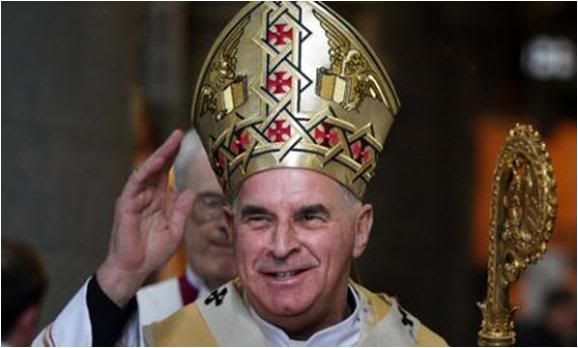
Cardinal Keith O’Brien, the Archbishop of St Andrews and Edinburgh, will also tell worshippers on Easter Sunday that the cover-up of “evil” paedophilia by senior clergy “brings shame on us all”.
However he insisted that the faithful must not turn away from the church, just as voters disillusioned by the state of politics should still cast their ballots.
His forthright comments on one of the most important days in the Christian calendar highlight the concern felt at the highest levels of the Church about the effect of clergy sex abuse scandals unfolding around the world. [Excuse me! Ireland, Germany, Austria, Holand, Switzerland, even throw in Italy - that's 'around the world'???? How convenient - and typical of irresponsible journalists - to use a loose generalization in order to make the problem worse than it actually is!]
The head of the Catholic Church in Ireland, Cardinal Sean Brady, is under intense pressure to stand down following two damning official reports in the past year which found that sexual abuse was “endemic” in Church-run schools. [That's not the reason for the pressure on Brady. It's his disclosure that in 1975 he interrogated two boys in a sexual abuse case against a Norbertine priest whom his bishop then relieved of diocesan assignments and sent back to his order for appropriate discipline. Bishops have no canonical jurisdiction over members of religious orders. Brady is faulted because 1) he asked the boys to sign a document not to make the incident known to the public; and 2) he did not report the priest to the police.
Also, in the interests of accuracy, only one of the two reports (Ryan) specifically looked into all abuses in Catholic schools and institutions of Ireland since the 1930s. The second report (Murphy) looked into sexual abuses committed in the Archdiocese of Dublin from 1956-2004. ]
The country's hierarchy was said to have had allowed known abusers to move to other parishes rather than reporting them to police, in order to protect its reputation.
Police in Northern Ireland announced on Thursday that they have set up a dedicated team to look into child abuse by clergy “in light of the number and nature of recent allegations”.
Meanwhile historic cases of abuse in Germany and America have led to accusations that Pope Benedict XVI himself, in his former roles during the 1980s and 1990s, had allowed guilty priests to escape punishment. [Two cases, two priests, exactly. To say 'historic cases' and 'guilty priests' - when the reporter knows very well only two cases adn two priests are referred to here - is to insinuate that there were a number of cases and a number of priests involved! Another trick of deliberate innuendo!]
The Pontiff warned of the dangers of “the petty gossip of dominant opinion” in his Palm Sunday address at St Peter’s.
Anger at the Church from abuse survivors, equality campaigners and secularist groups is likely to mean higher security is required when the Pope makes his historic first state visit to England and Scotland in September. He may also hold a private meeting with victims, as he did on earlier trips to Australia and the US.
In his Homily to be delivered at St Mary’s Cathedral in Edinburgh on Easter Sunday, Cardinal O’Brien will acknowledge the harm done to the Catholic church worldwide and its one billion followers by the recent claims, and apologise to victims.
He will say: “We have become more aware of the failures of some members of our Church whether Bishops and Priests, religious or lay people, and indeed Pope Benedict XVI in a recent letter indicates how he is aware of the human frailty of us all.
“Many evils have been committed throughout the world particularly with regard to the sexual abuse of children and young people. I myself as long ago as 2002 indicated my own personal abhorrence of this terrible crime and said at that time that I apologised to ‘anyone who has suffered any abuse at the hands of any one representing the Catholic Church’. I restate and reiterate that apology today.
“Crimes against children have indeed been committed and any Catholics who were aware of such crimes and did not act to report them, brings shame on us all. We can take no comfort from the fact that only a small percentage of priests committed such crimes – the impact of their sinful acts is very large – their actions, harmed the lives of their victims, caused great hatred to be directed at their innocent brother priests and left ordinary Catholics demoralised and confused.
“One might say that there has been a great ‘public humiliation’ of the Church as in some way or another we realise that we have not been as alert as we should have been to the evils being perpetrated around us whatever our particular position. Those involved in these crimes must apologise and ask forgiveness from those who have been offended as well as of course from Almighty God himself.”
Cardinal O’Brien, the head of the Church in Scotland who has been an outspoken critic of Labour’s laws and secularisation, will go on to say that “things are not always as they should be” in society at large.
He will call on voters to cast their ballots according to their conscience, after assessing candidates by Christian standards.
The Cardinal will draw a parallel between the loss of public trust in MPs and clergy, saying: “I would suggest that we should no more turn away from the Church than we should turn against our democracy.
“Whatever flaws or personal failings afflict them, it remains the case that the overwhelming majority of priests and politicians are honourable and honest – seeking to live out their beliefs and serve society around them.”
The day when crowds stop coming to St. Peter's Square is the day we should start worrying that the repeated attacks of the killer media may be getting to the faithful! Despite itself, AP cannot help reporting the following:
It's Good Friday, and pilgrims
fill St. Peter's Square

VATICAN CITY, April 2 (AP) – Pilgrims and tourists flocked to the Vatican ahead of Good Friday ceremonies as the Catholic Church defends itself against accusations that Pope Benedict XVI played a role in covering up sex abuse cases.
The Pope was scheduled to preside over a prayer service and listen to reflections from the papal household preacher in St. Peter's Basilica on Friday evening.
Hours later, thousands of faithful Catholics, clutching candles and prayer books, were expected to gather at the Colosseum to see the Pope at night during at the traditional Way of the Cross procession commemorating Christ's crucifixion.
Amid reports of clerical sex abuse cases in several European countries, including Benedict's native Germany, the Vatican has fired back at the Western media, but the Pope has not publicly addressed the crisis this week.
For pilgrims, the credibility crisis over the Pope's record on combatting clergy abuse of minors didn't color their Holy Week activities in Rome.
Anne Rossier of Boston, Massachusetts, said the moment was "difficult" and that "lots of people have been turned against the church" but "we could not have been in a better place right now for Easter."
Boston was at the epicenter of sex abuse lawsuits and allegations that U.S. bishops in many dioceses shuffled pedophile priests from parish to parish instead of removing them from contact with the faithful. Boston Cardinal Bernard Law, at the center of the storm, resigned as archbishop, to be assigned to a prestigious post in Rome by the late Pope John Paul II.
Tourists snapped photos and strolled through St. Peter's Square on a breezy, sunny day. Valeria Misuri, 38, from Livorno, Italy, studied a map in the square as she visited Rome with her family.
"I haven't let the recent scandals change how special this place is at this time for me," said Misuri. "The Church is made up of men, and men have always erred and will always continue to do so." [There you are, all you sanctimonious media mavens!]
Pointing heavenward, she said: "In the end, the conscience lies there."
(BTW, the AP's Victor Simpson has updated his malicious piece from yesterday with a new lead today - the story about some deaf children in a Verona institution who complained about sexual abuse, a story first reported last year in Italy and only now getting the media spotlight. Simpson says the deaf children will appear today(!) on Italian state TV RAI to tell their stories. Could RAI not have waited until after Easter Sunday to do this?????]
Pittsburgh bishop denounces
media furor over the Pope
by ANN RODGERS

Friday, April 02, 2010
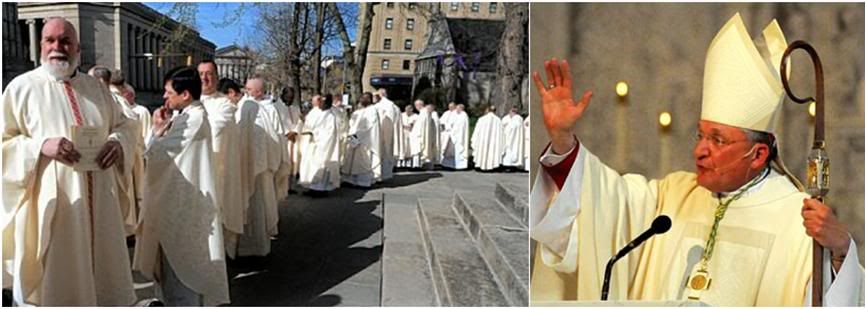 Diocesan priests of Pittsburgh line prepare to enter the cathedral for the Chrismal Mass on Holy Thursday; right, Bishop Zubik.
Diocesan priests of Pittsburgh line prepare to enter the cathedral for the Chrismal Mass on Holy Thursday; right, Bishop Zubik.
Bishop David A. Zubik drew a standing ovation for an emotional homily describing his pain over the furor surrounding Pope Benedict XVI's past response to two sex abuse cases.
At the Holy Thursday Mass that celebrates the priesthood, Catholic Bishop David Zubik drew a standing ovation for an emotional homily describing his pain over the furor surrounding Pope Benedict XVI's past response to two sex abuse cases.
"There is no way we can mark this great moment in our liturgical year ... without recognizing the elephant in the cathedral," he said. His litany of pain ranged from harm done to victims to what he described as biased media coverage.
"I ache. I'm sick and tired. I'm angry. I'm insulted. I'm confronted by the headlines of newspapers and ongoing stories that seek to once again annihilate the body of Christ," he said, preaching without notes from the pulpit of St. Paul Cathedral in Oakland.
"It would be an absolute lie on my part to stand here today to say we bear no responsibility for great sins committed in the past by people who were trusted leaders of the church, by priests, deacons, bishops and others. So that is not what gives me the ache.
"What gives me the ache is not only the hunger and thirst to rush to judgment without an honest look at the facts, but the absolute hatred ... and disrespect for who we are and especially for what we believe."
Two stories have embroiled the pope. One is from the German archdiocese that he led from 1977 to 1982. In 1980 a priest who had molested children was reassigned to a parish days after starting therapy intended to cure him. One of the future pope's aides has claimed full responsibility for that decision, though the archbishop ran the meeting where the assignment was approved. [WRONG! What he approved at the meeting was to provide the priest with parish lodgings.]
The second case, from 1996, involved a Wisconsin priest accused of molesting hundreds of deaf students from 1950 to 1974. Because some of the abuse had occurred during confession, the Milwaukee archdiocese wanted to try the case as an abuse of the sacrament of confession, which carries the Vatican's stiffest penalties.
Confession cases were handled by the office then headed by Cardinal Joseph Ratzinger, now Pope Benedict. But officials in that office, citing the priest's advanced age and ill health, didn't approve a canonical trial to laicize him, though he remained banned from ministry.
In an interview, Bishop Zubik said some stories implied that Cardinal Ratzinger had been in charge of sex abuse cases since 1981, when he only took over that duty in 2001. Bishop Zubik credits the Pope with being far stronger in his efforts to remove predators than anyone before him.
"The conclusion they're drawing is that the Pope is guilty and they're not looking at all the facts," he said.
In his homily, he named many groups who he said his heart ached for. They included "anyone who has been victimized by a priest or deacon or bishop or mother or father or teacher" and for families of those victims "who carry the heavy cross of what their sibling or son or daughter has been through."
He cited faithful priests who live under a cloud of suspicion and Catholics tempted to leave the church due to shame.
"I ache for the Holy Father, Pope Benedict, who ... has spoken out not only on the wrong and the sin, but especially the crime, of abuse," he said.
But all of this pain, he said, comes from the sin that Jesus died to atone for.
"We would not be celebrating the Eucharist today if God did not ache," he said.
He closed his homily with a prayer for priests. The laity rose first in a standing ovation, and were joined by the hundreds of priests who had come to renew their vows of ministry.
Barbara Lewis, a parishioner from Holy Wisdom on the North Side, said she applauded to express her unity with the church.
"I was grateful that the bishop expressed the pain that we parishioners feel for the sorrow we have caused and for the scandal. I'm grateful that he said how much he loved his priests and saw that they are suffering," she said.
[Modificato da TERESA BENEDETTA 05/04/2010 23:34] |
| |
 02/04/2010 19:39 02/04/2010 19:39 |
|
| | | OFFLINE | | Post: 19.823
Post: 2.465 | Registrato il: 28/08/2005
Registrato il: 20/01/2009 | Administratore | Utente Veteran | |
|

 What an original thought! All my fighting hormones just kick in whenever I read about any hate addict out there saying 'the Pope should resign' I have even refused to think anything more about it. But this one is precious!
Re-elect Pope Benedict!
What an original thought! All my fighting hormones just kick in whenever I read about any hate addict out there saying 'the Pope should resign' I have even refused to think anything more about it. But this one is precious!
Re-elect Pope Benedict!
A Register Editorial
The Editors

04/01/2010
Ed. Note: A version of this editorial will appear in the April 11 print edition, due to arrive to subscribers at the beginning of next week.
The pundits tell us that lots of people think that Pope Benedict should resign over the Church’s handling of clerical sex-abuse allegations.
They’re quoting authorities, of course. Mehmet Ali Agca, fresh out of prison for his failed assassination attempt on Pope John Paul II, told journalists on March 29, “I want the Pope to resign.” Singer Sinead O’Connor, now remembered chiefly for having torn up a photo of John Paul II on “Saturday Night Live” in 1992, has been calling for the Pope’s resignation since December. Atheist author Christopher Hitchens, writing for Slate, labels him a “mediocre Bavarian bureaucrat” and calls for “justice” to be done on him. Minnesota lawyer Jeff Anderson, who has won a dozen multimillion-dollar lawsuits against the Church but says “it’s not about the money,” told Al-Jazeera that he hopes to “hear a jail door clang behind” the Pope.
But something funny would happen on the way to the conclave.
If Pope Benedict resigns tomorrow, and if the cardinals huddle in the Sistine Chapel two weeks later to choose his successor, it’s clear to us that something very surprising would happen: As the white smoke wafts over St. Peter’s Square, Joseph Ratzinger would be re-elected.
Shocking? Maybe.
Munich’s Süddeutsche Zeitung and The New York Times have fueled a media frenzy over two horrific cases that “must have” crossed Cardinal Ratzinger’s desk. T
heir shrillness obscures one simple fact: In neither the horrific Murphy case in Wisconsin nor the tragic Hullermann affair in Munich has a single shred of paper surfaced with Cardinal Ratzinger’s signature on it.
No evidence has been produced to disprove the Vatican’s statement that Cardinal Ratzinger knew nothing of the decision to reassign sexual predator Father Peter Hullermann to pastoral duties, and commentators from Father Raymond de Souza to George Weigel to the Register’s Jimmy Akin (March 30 and April 1) have demonstrated the blatant inaccuracy of the Times’ reporting on the Murphy case.
Milwaukee Archbishop Jerome Listecki told his clergy on March 30 that the Milwaukee Archdiocese — not Rome — mishandled the Murphy case. Father Thomas Brundage, who as judicial vicar was responsible for the internal Church trial that was still ongoing at the time of Father Murphy’s death, went public to say that “I have no reason to believe that [Cardinal Ratzinger] was involved at all. Placing this matter at his doorstep is a huge leap of logic and information.”
Instead, according to Father Brundage, Pope Benedict “has been the most reactive and proactive of any international Church official in history with regard to the scourge of clergy sexual abuse of minors.”
Shocking? Maybe.
Bishops worldwide are watching the headlines just as anxiously as anyone else. The Church has lost credibility [With whom, though? If it's with the media and the elements they represent, they never had much use for the Church anyway! If it's with the faithful, I bet it is mostrly limited to those whose faith was never too firm, anyway - they have to be reassured!] and they’re the ones who have the most at stake in restoring it.
And they are all saying the same thing: The Churchman with the best track record and the most pastoral sensitivity in handling these cases is named Ratzinger.
But don’t take it from us. Listen to them.
“When [Ratzinger] was in charge of the Congregation for the Doctrine of the Faith,” wrote Westminster Archbishop Vincent Nichols in The Times of London, “he led important changes made in Church law: the inclusion in canon law of Internet offenses against children, the extension of child abuse offenses to include the sexual abuse of all under 18, the case-by-case waiving of the statute of limitations and the establishment of a fast-track dismissal from the clerical state for offenders. He is not an idle observer. His actions speak as well as his words.”
Ratzinger “was the first one who, already as cardinal, felt the need for new and stricter rules, which there hadn’t been,” Cardinal Walter Kasper, head of the Pontifical Council for Promoting Christian Unity, told Milan’s Corriere della Sera newspaper in an interview entitled, “True, Some Things Were Hushed Up, but Ratzinger Broke the Silence.”
“The Pope never prohibited anyone from denouncing abusive priests and never gave orders to hide anything,” he said.
“The Holy Father has always testified to the same spirit of zero tolerance on the subject ... during each one of his responsibilities up to the papacy,” wrote Quebec Cardinal Marc Ouellet on his archdiocesan website last week.
Toronto Archbishop Thomas Collins echoed him in telling the priests of his archdiocese that “Pope Benedict has led the way in confronting this evil.”
“The New York Times flatly got the story wrong,” Calgary Bishop Fred Henry wrote in a pastoral letter. “Readers may want to speculate on why.”
Bishop Patrick Dunn of Auckland, New Zealand, called the Pope’s letter to the Church in Ireland both “unprecedented” and “uncompromising.”
“The Pope has met victims of abuse and expresses in this letter his deep sadness for what they have endured, his praise for their courage in coming forward, and his personal resolve to bring them justice and healing so far as is humanly possible.”
Does Ratzinger have undiscovered skeletons still in his own closet, as some in the media have opined?
Bishop Edward Kmiec of Buffalo, N.Y., told the local CBS affiliate that he doesn’t think so. “I think he’s a man of honor, of integrity, of honesty. I think if he felt he had done something wrong, I think he’d admit to it.” [Thank you, Bishop Kmiec, for articulating that!]
In fact, credit should go to Cardinal Ratzinger for helping the Church in America deal with abuse allegations and protect children better.
New York Archbishop Timothy Dolan got a 20-second standing ovation during his Palm Sunday homily for claiming just that. He made reference to last week’s report that only six credible cases of clerical sexual abuse were reported in the United States last year: “The dramatic progress that the Catholic Church in the United States has made — documented again just last week by the report made by independent forensic auditors — could never have happened without the insistence and support of the very man now being daily crowned with thorns by groundless innuendo.”
The Italian and American bishops’ conferences have both sent public messages of support to the Holy Father, and the French bishops, not to be outdone, wrote their own March 26 letter to Pope Benedict “to tell you that we bear with you the pain of the slanders you suffer, and [to] renew our expression of communion and support.”
Any bishop could become a media darling overnight — and get his name floated as a possible John Paul III — by breaking ranks and criticizing the Holy Father. No one has. We think that’s revealing. Maybe Cardinal Ratzinger would have more support in a 2010 conclave than he did in 2005. [In fact, even Cardinal Carlo Maria Martini has now spoken up in defense of Benedict XVI!]
As Archbishop Dolan blogged last week:
As we now sadly realize, nobody, nowhere, no time, no way, no how knew the extent, depth, or horror of this scourge, nor how to adequately address it.
There was a learning curve involved for everyone. But Ratzinger was ahead of the curve. Even five years ago, when the subject was still taboo in Roman circles or considered merely “an American problem,” he drew gasps for the exclamation he inserted into the Pope’s Way of the Cross meditations for Good Friday: “How much filth there is in the Church, and even among those who, in the priesthood, ought to belong entirely to him!”
Back to Father Brundage: “Pope Benedict has repeatedly apologized for the shame of the sexual abuse of children in various venues and to a worldwide audience. This has never happened before. He has met with victims. He has reined in entire conferences of bishops on this matter, the Catholic Bishops of Ireland being the most recent.”
They all seem to agree with Damian Thompson of London’s Daily Telegraph: “Ratzinger was part of the solution, not the problem.”
So there’s a massive disconnect here. New York Times columnist Maureen Dowd writes that “Benedict should go home to Bavaria,” while the world’s bishops think he should stay right where he is.
Shocking? Hardly.
Apart from the fact that the Register editors necessarily had to mention the 'authorities' the media loves to cite - Agca, Sinead what's-her-name, Hitchens, and the Irish-American harpy Dowd - hats off for an efficient summary of the 'reductio ad absurdum' that the MSM do not seem to realize they have come to!
by the way, it's only fair to the NCRegister to point out that they are part of what was once the Maciel empire, but they have always been unswervingly with Benedict XVI.
Here's a concrete proposal from Fr. Longenecker, one of the more active bloggers among the ex-Anglicans who came 'home to Rome' years before Anglicanorum coetibus: He proposes an e-mail blitz of the New York Times to protest, civilly, their attacks on the Pope. His particular target is Maureen Dowed but we can be more general. Here's part of what he writes:
Campaign against the NYT
by Fr. Dwight Longenecker
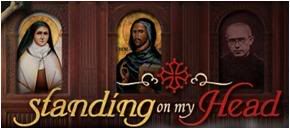
...Clark Hoyt is the editor at New York Times. Here's his email: public@nytimes.com
Here are the rules: First, in the subject line write: "Fire Maureen Dowd". That will give the general impression. Letters should be brief, firm and indignant, but also intelligent and charitable. No rage. No anger. No rude words. No self righteous condemnations. Here's a copy of my letter:
Dear Mr Hoyt,
As a faithful Catholic I am grateful for any effort which will help rid our church of the few pedophile priests. Honest and fair investigative journalism is part of this righteous crusade.
However, your journalist Maureen Dowd is telling lies. Pope Benedict is not guilty of any crime in the case of Fr Lawrence Murphy. You and your staff had the facts. Rather than implicate Pope Benedict the facts actually exonerate him. There are only two options: that you and your staff did not bother to understand the facts, or that you willfully distorted them. As you are intelligent people I have to assume the latter.
Shame on your paper for publishing lies and continuing this intentional smear campaign against the Catholic Church during the holiest time of our year. Would you launch a similar campaign on Muslims during Ramadan about the prophet's marriage of a young girl, the institutionalized pedophilia amongst the Taliban or the Muslims shameful treatment of women? I think not.
I have decided to never purchase your paper and to boycott all your advertisers and I will be encouraging all I know to do the same.
Yrs sincerely,
Dwight Longenecker
If you have a blog, do a post on this. You can copy and paste my whole post if you wish. Compose a brief email with Hoyt's email address and encourage people to write. Send it to all the faithful Catholics on your list and ask them to forward to their lists.
Finally--does anyone have the time to go through the NYT and make a list of their advertisers? I think a Catholic boycott of all companies who advertise in the NYT and on their website is in order don't you?
OK, Father - I will try and compose a pithy and sober protest, but not about Dowd specifically because I stopped reading her columns since the Bush years, and I really have no use for her opinions. My protest is more basic: That Laurie Goodstein's original report on the Murphy case was not supported by the documents that the Times itself posted; and that it has not at all acknowledged the statement made by Fr. Brundage. I will then e-mail it from as many PCs and Macs I can come across in the next few days!
[Modificato da TERESA BENEDETTA 02/04/2010 21:34] |
| |
 02/04/2010 22:00 02/04/2010 22:00 |
|
| | | OFFLINE | | Post: 31
Post: 31 | Registrato il: 19/03/2010
Registrato il: 19/03/2010 | Utente Comunità | Utente Junior | |
|
Rome waited years to ban Ariz. priest Here we go again. It's spreading.
By MATT SEDENSKY (AP) – 13 minutes ago
The future Pope Benedict XVI took over the abuse case of an Arizona priest, then let it languish at the Vatican for years despite repeated pleas from the bishop for the man to be removed from the priesthood, according to church correspondence.
Documents reviewed by The Associated Press show that in 1990, members of a church tribunal found that the Rev. Michael Teta of Tuscon, Ariz., had molested children and deemed his behavior — including allegations that he abused boys in a confessional — almost "satanic." The tribunal referred his case to then-Cardinal Joseph Ratzinger, who would become pope in 2005.
But it took 12 years from the time Ratzinger assumed control of the case in a signed letter until Teta was formally removed from ministry, a step only the Vatican can take.
As abuse cases with the pontiff's fingerprints mushroom, Teta's case and that of another Arizona priest cast further doubt on the church's insistence that the future pope played no role in shielding pedophiles.
Teta was accused of engaging in abuse not long after his arrival to the Diocese of Tucson, Ariz., in 1978. Among the allegations that would later be part of settlements: He molested two boys, ages 7 and 9, in the confessional as they prepared for their First Communion.
Bishop Manuel Moreno eventually was made aware of the allegations and held a church tribunal for Teta, which determined "there is almost a satanic quality in his mode of acting toward young men and boys."
www.google.com/hostednews/ap/article/ALeqM5j0XEgWZijj_PC7XFBH7T_YaPM5XgD... |
| |
 02/04/2010 22:50 02/04/2010 22:50 |
|
| | | OFFLINE | Post: 260
Post: 37 | Registrato il: 28/05/2007
Registrato il: 19/02/2009 | Utente Comunità | Utente Junior | |
|
I assume they know that the CDF was not responsible for those matters until 2002!?
Sorry!! Correct is 2001, of course.
I also assume they are aware that when the responsibility finally shifted, the offender was removed.
 But Heike, MSM does not really care about facts - the truth - if it gets in the way of their chosen narrative! AP has now become co-equal to the New York Times in its total lack of journalistic responsibility. In fact, they seem to be playing one-upmanship with the Times in the Munich case and now on this defrocking nonsense.
But Heike, MSM does not really care about facts - the truth - if it gets in the way of their chosen narrative! AP has now become co-equal to the New York Times in its total lack of journalistic responsibility. In fact, they seem to be playing one-upmanship with the Times in the Munich case and now on this defrocking nonsense.
TERESA
[Modificato da TERESA BENEDETTA 03/04/2010 14:10] |
| |
 03/04/2010 00:22 03/04/2010 00:22 |
|
| | | OFFLINE | | Post: 19.824
Post: 2.466 | Registrato il: 28/08/2005
Registrato il: 20/01/2009 | Administratore | Utente Veteran | |
|

 If there is any dissident bishop in the world who would fault Benedict XVI for his approach to dealing with the pedophilia scandal among some priests in the Catholic Church, he has had the good sense not to speak up in public so far - knock on wood!
If there is any dissident bishop in the world who would fault Benedict XVI for his approach to dealing with the pedophilia scandal among some priests in the Catholic Church, he has had the good sense not to speak up in public so far - knock on wood!
Even the Pope's most well-known ideological opposites like Cardinal Lehmann in Germany and Cardinal Martini in Italy have spoken up for him lately. It should be the equivalent of a ringing box on the ear of liberal media (and an indication of how wrongly they are treating Benedict XVI) that these two bishops - who have long been media darlings because of their liberal tendencies that put them at odds with Church orthodoxy - are decidedly not on their side this time!
Cardinal Martini: 'Attacks against
the Pope are ignoble and false'
From an interview
by GIANNI CARDINALE
 This is part of a much longer interview for the January 2010 issue of 30 GIORNI magazine which has just come out.
These have been stormy weeks for the Church because of the pedophile scandal. How do you evaluate the situation and what is the Church alled on to in these circumstances?
This is part of a much longer interview for the January 2010 issue of 30 GIORNI magazine which has just come out.
These have been stormy weeks for the Church because of the pedophile scandal. How do you evaluate the situation and what is the Church alled on to in these circumstances?
All of this can certainly help the Church, in all humility. But we must remember Jesus's words. These are serious crimes, and "Whoever causes one of these little ones who believe in me to sin, it would be better for him to have a great millstone hung around his neck and to be drowned in the depths of the sea" (Mt 18,6).
But this does not mean there has not also been great hypocrisy. There is total sexual freedom todsy, and advertising uses sexual motivations even for children.
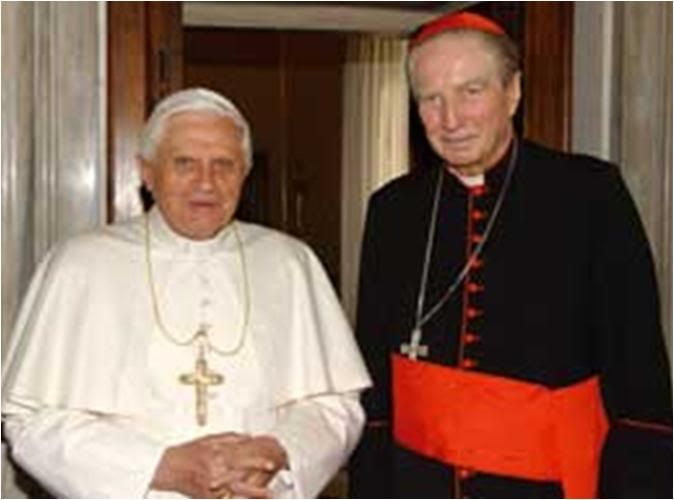 Benedict XVI and Cardinal Martini in 2007, the year they both tuned 80.
How can we defend the Pope from the attempts to implicate him in connection with these offenses?
The Pope does not need to be defended because it is clear to everyone that he is blameless, as well as his sense of duty, his wish to do good. The accusations against him these days are ignoble and false.
Benedict XVI and Cardinal Martini in 2007, the year they both tuned 80.
How can we defend the Pope from the attempts to implicate him in connection with these offenses?
The Pope does not need to be defended because it is clear to everyone that he is blameless, as well as his sense of duty, his wish to do good. The accusations against him these days are ignoble and false.
It would be good to see all men of goodwill solidly with him to sustain him in his difficult task.
In his letter to the Catholcis of Ireland, Benedict XVI asked for fasting, prayer, reading Scriptures and recourse to the sacrmanet of confession "to obtain the grace of healing and renewal for the Church in Ireland"....
These are valid not only for the communities where these terrible things have happened but for the whole Church.
But for the offenders in these cases, in which there is a perversion and an interior compulsion to it, they would also need psychotherapeutic attention. They have to understand the reasons for their compulsion, how they can dominate it... The other means have nothing to do with this specific aspect.
You are often portrayed as a scourge against the inadequacies and limitations of the Church. Do you recognize yourself in that role?
The Church, considered in its totality, is full of holiness and interior strength. The media doggedly pursue certain episodes, but around the world, there are all the loyal, good and devout Catholics who live their lives quietly.
I am very grateful to the Lord for this among other things - that he allowed me to live at this time. I would never have wished to live during the Protestant Reformation, or the Great Schism, or the Western Schism when there wre two Popes, one in Rome and one in Avignon.
Today, [other than the media image], the Church is giving a beautiful demonstration of herself. There are limitations and shortcomings but these are inevitable, and they too are part of the mysterious design of God's will.
Cardinal Lehmann: 'Who can surpass
the Pope in clarity and decisiveness'?
In a very long and substantial essay for the April 2 issue of Frankfuerter Allgemeine Zeitung, Cardinal Lehmann offers an analysis of the root causes of pedophilia and of the psychology of pedophiles, as well as the conditions in the Church itself over the past several decades that allowed the pedophilia crisis to develop. He says this about Pope Benedict:
Doubtless we in the Church have paid too little attention to the spirituality of a renewed Church (post Vatican-II), especially when it has turned more towards the world. And that is why there are so many deficits and a lack of sensitivity, especially in dealing with pederasts and their enablers. Here is where the 'world' in its Biblical sense has intruded deep into the Church.
That is why we need today - and Pope Benedict XI has always made this clear - an unconditional self-purification on all levels. It was not just in the letter to the Irish Church that the Pope has denounced with the most explicit clarity this 'detestable crime' and 'grave sin'. In this matter, who can surpass him in clarity and decisiveness?
[Modificato da TERESA BENEDETTA 03/04/2010 14:02] |
| |
 03/04/2010 09:50 03/04/2010 09:50 |
|
| | | OFFLINE | | Post: 19.825
Post: 2.467 | Registrato il: 28/08/2005
Registrato il: 20/01/2009 | Administratore | Utente Veteran | |
|


 GOOD FRIDAY
GOOD FRIDAY
CELEBRATING THE PASSION OF OUR LORD
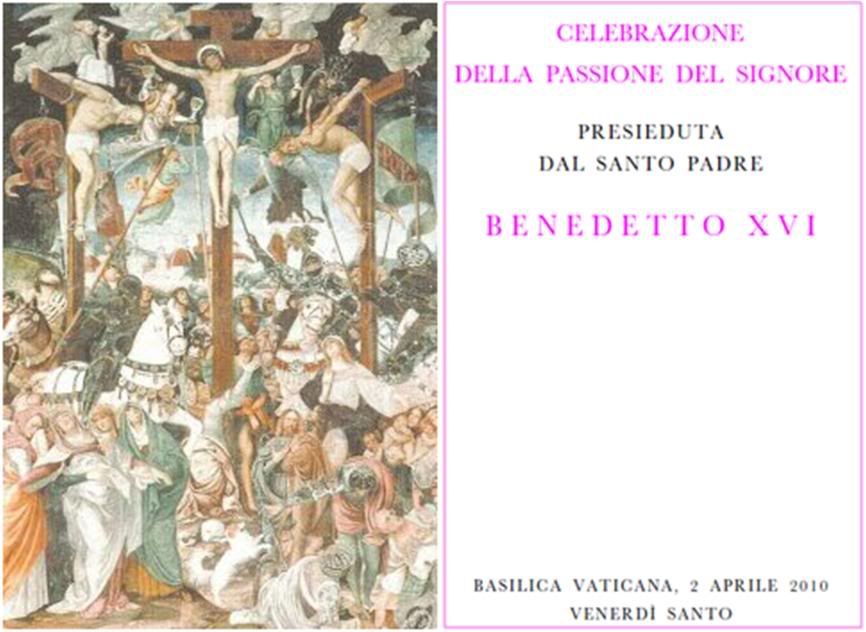
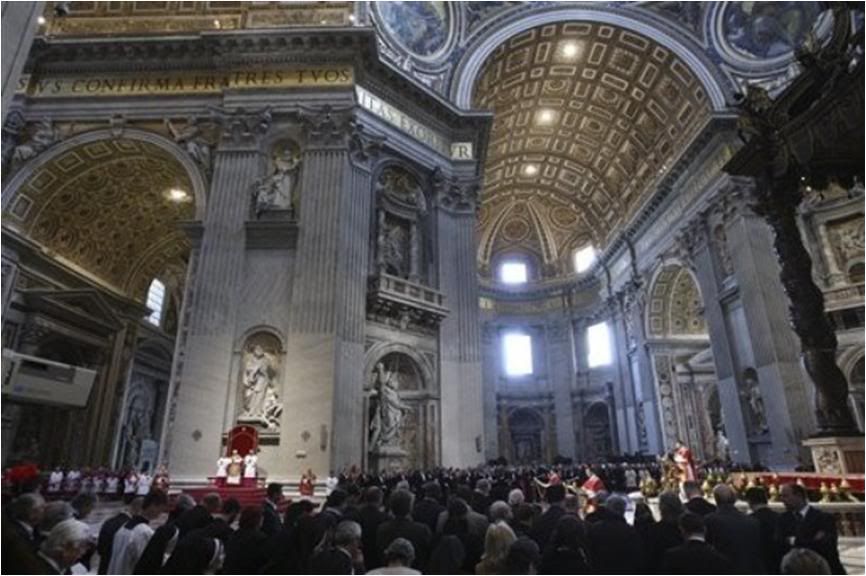
At 5 p.m., the Holy Father presided at the celebration of the Passion of the Lord at St. Peter's Basilica.
The liturgy for the day was in three parts. First, the Passion of the Lord, as narrated in the Gospel of John, was chanted, followed by a homily from Capuchin Fr. Raniero Cantalamessa, preacher of the Pontifical Household, and the universal prayers.
Then followed the Adoration of the Cross. After uncovering a red-draped Crucifix and holding it up to the Congregation, the Holy Father returned to his SEAT, where he took off his chasuble and his shoes, and walked back to the altar to venerate the Cross, kneeling at its foot. He was followed by the cardinals and bishops present.
The liturgy ended with Holy Communion, using the hosts consecrated on Maundy Thursday and left overnight in the Chapel of Reposition.
LITURGY OF THE WORD
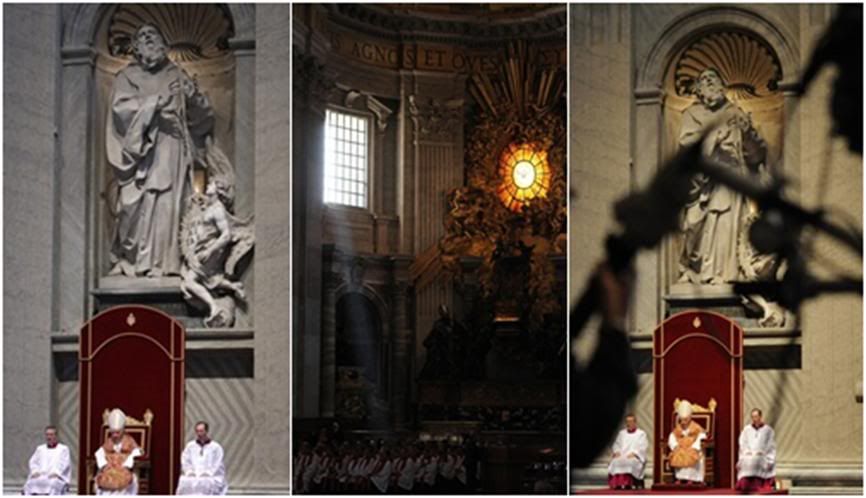
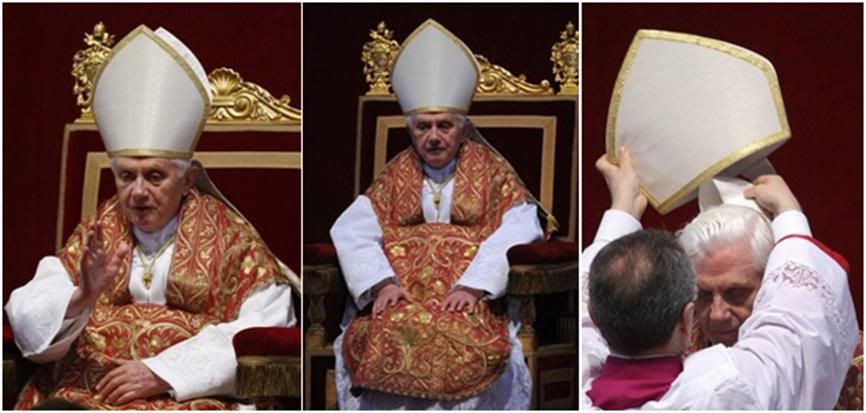
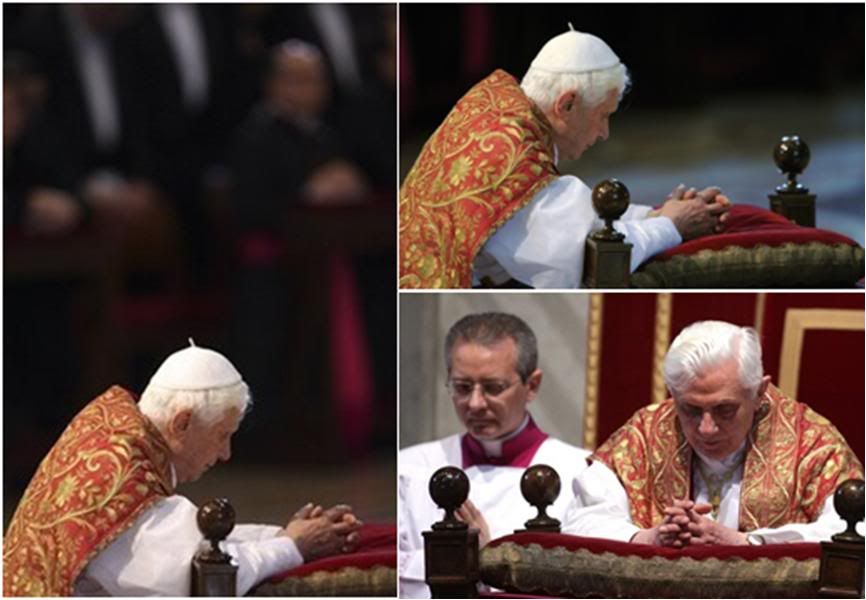
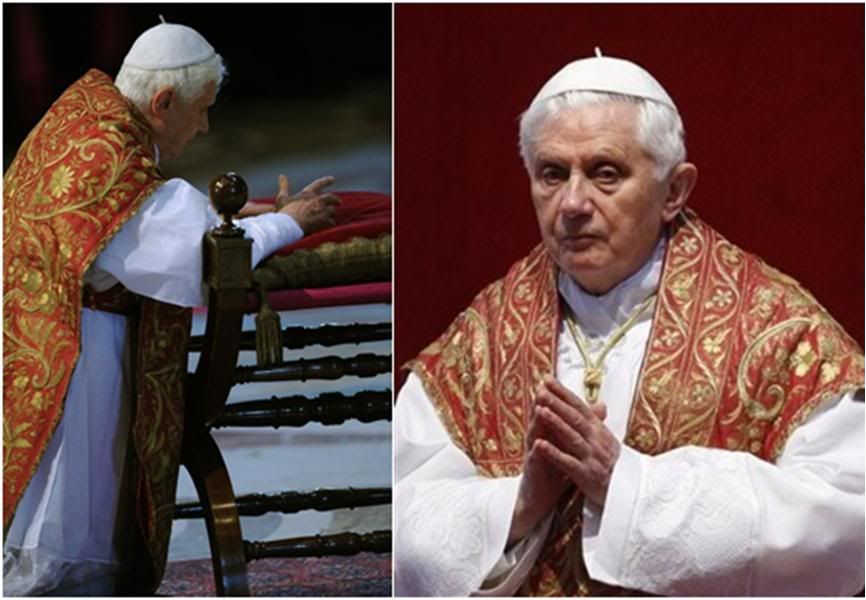 ADORATION OF THE CROSS
ADORATION OF THE CROSS
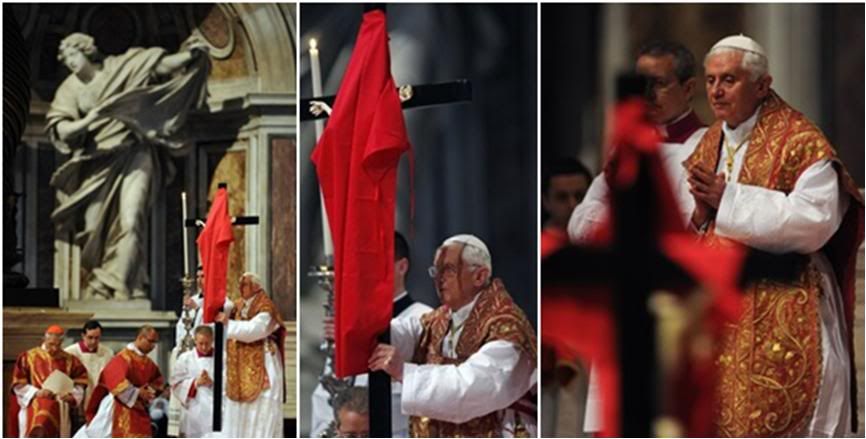
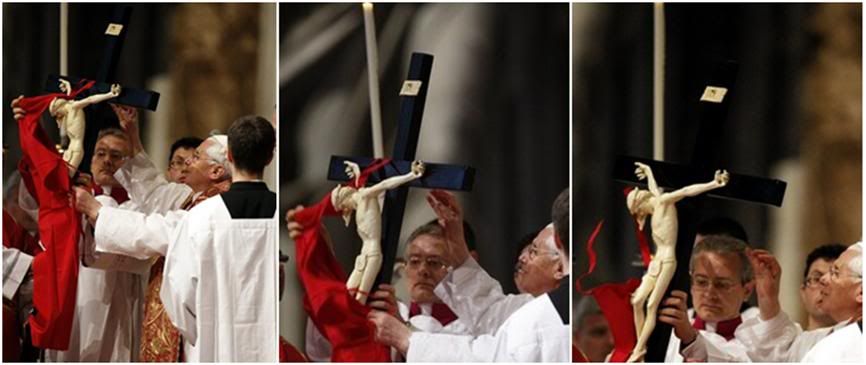
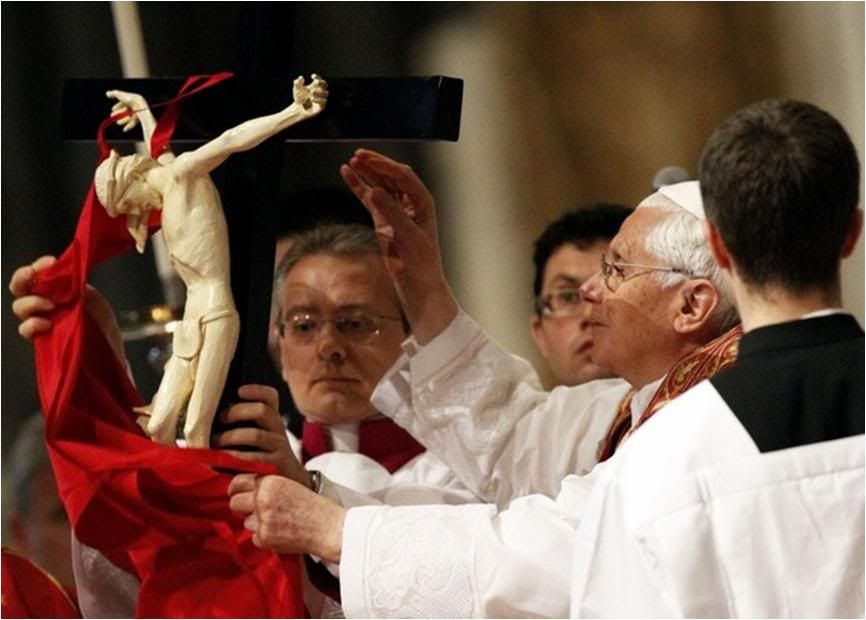
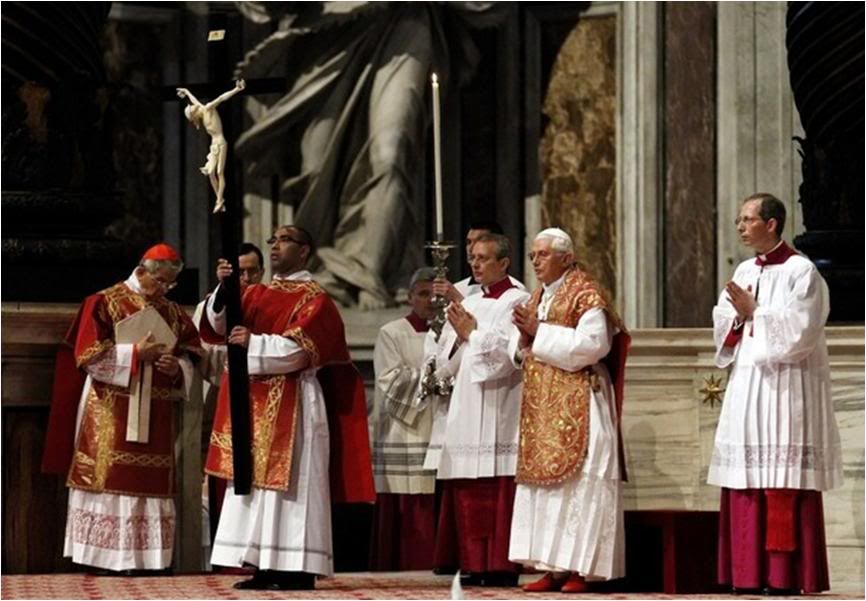
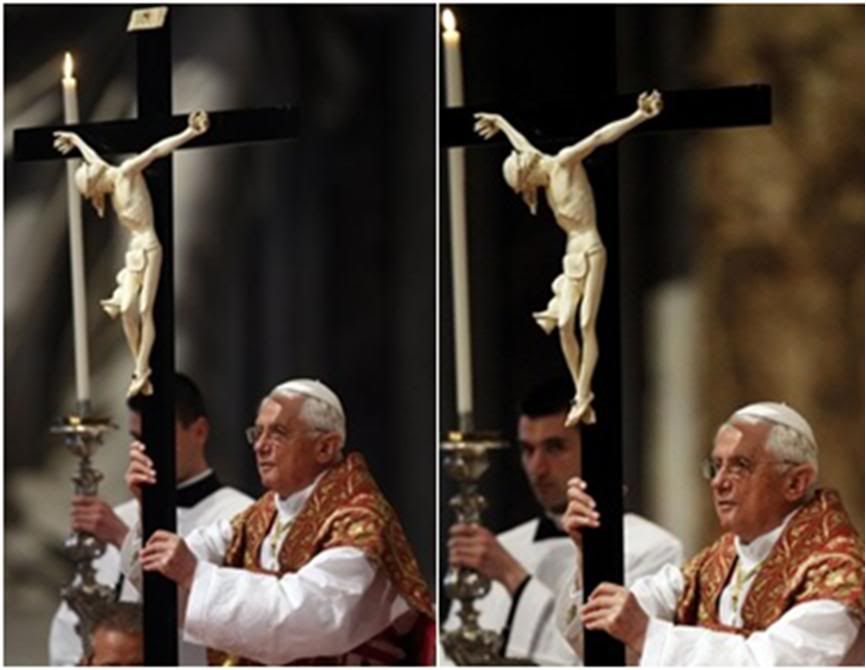
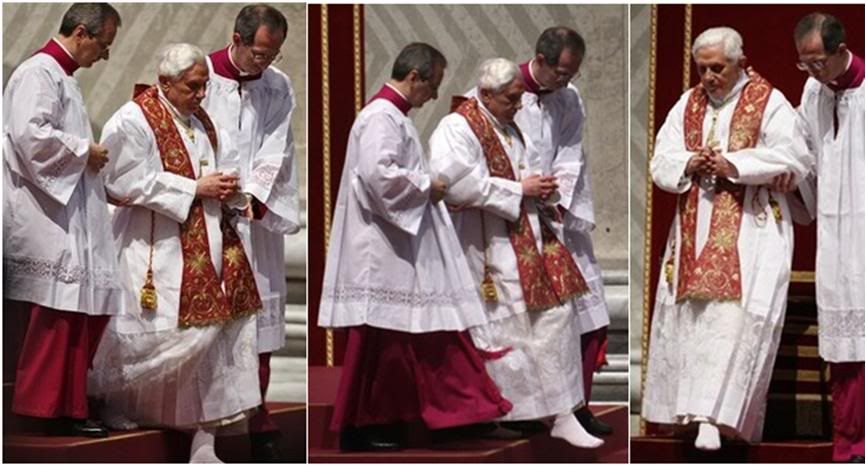
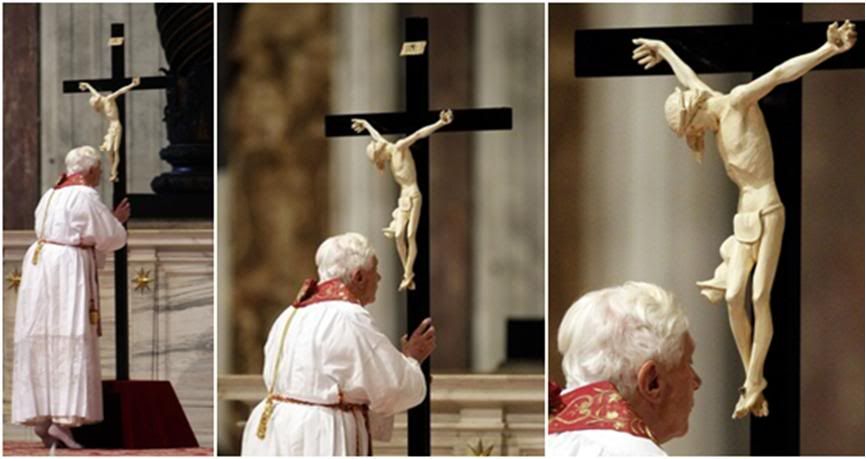
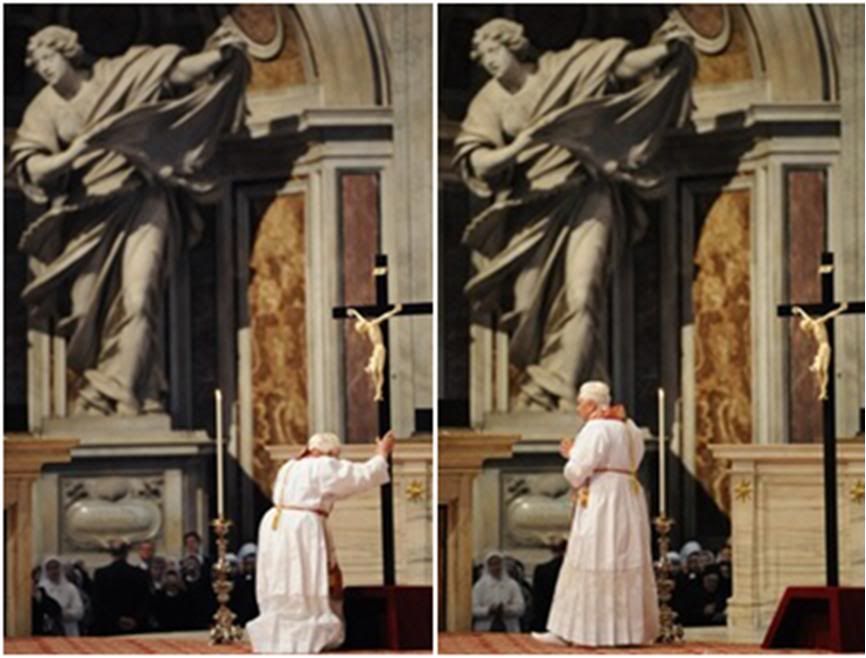
|
| |
 03/04/2010 11:29 03/04/2010 11:29 |
|
| | | OFFLINE | | Post: 19.826
Post: 2.468 | Registrato il: 28/08/2005
Registrato il: 20/01/2009 | Administratore | Utente Veteran | |
|

 VIA CRUCIS
VIA CRUCIS
AT THE COLOSSEUM
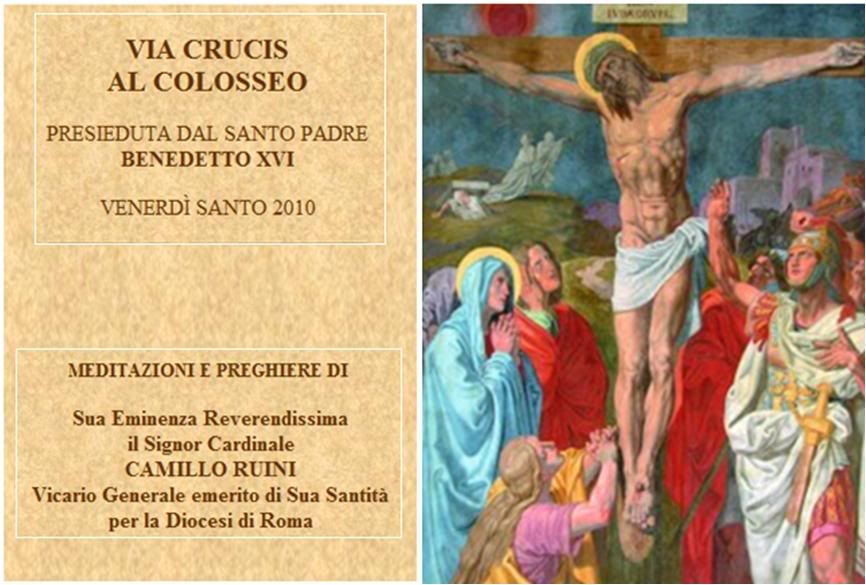
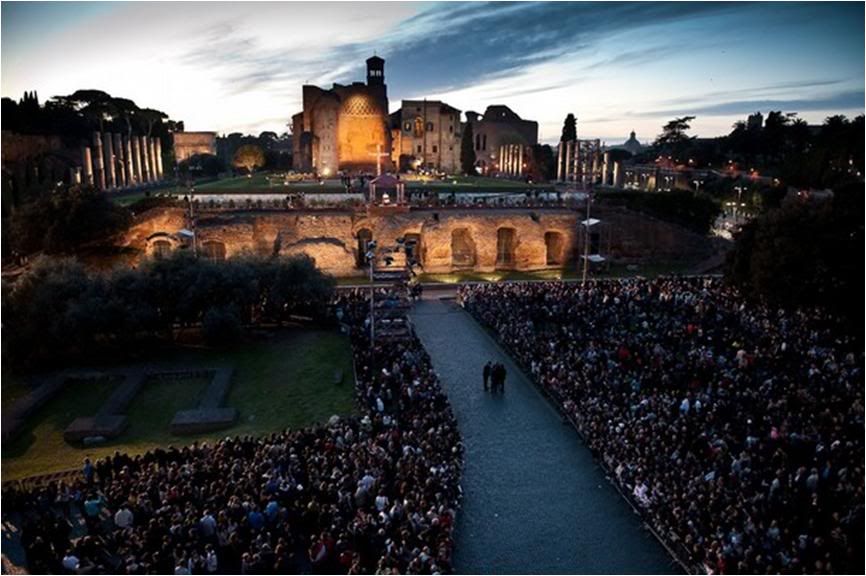
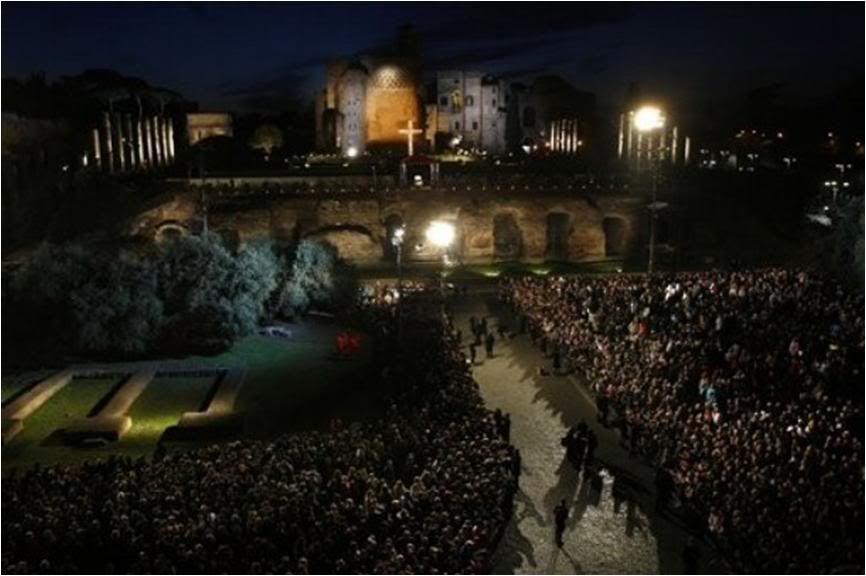
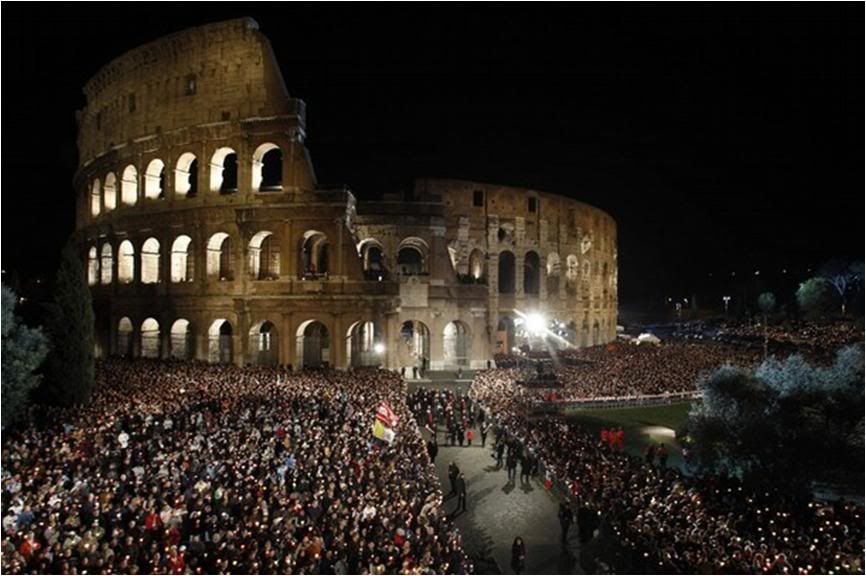
INTRODUCTORY MEDITATION
'VIA CRUCIS 2010'
by Cardinal Camillo Ruini
When the Apostle Philip asked Jesus, “Lord, show us the Father,” he replied, “Have I been with you all this time, and you still do not know me? Whoever has seen me has seen the Father” (Jn 14:8-9).
This evening, as we accompany Jesus in our hearts while he makes his way beneath the cross, let us not forget those words. Even as he carries the cross, even in his death on the cross, Jesus remains the Son, who is one with God the Father.
When we look upon his face disfigured by beating, weariness and inner suffering, we see the face of the Father. Indeed, it is precisely in this moment that God’s glory, his surpassing splendour, in some way becomes visible on the face of Jesus.
In this poor, suffering man whom Pilate, in the hope of eliciting compassion, showed to the Jews with the words “Behold the man!” (Jn 19:5), we see revealed the true greatness of God, that mysterious grandeur beyond all our imagining.
Yet in the crucified Jesus we see revealed another kind of grandeur: our own greatness, the grandeur which belongs to every man and woman by the simple fact that we have a human face and heart.
In the words of Saint Anthony of Padua, “Christ, who is your life, hangs before you, so that you can gaze upon the cross as if in a mirror… If you look upon him, you will be able to see the greatness of your dignity and worth… Nowhere else can we better recognize our own value, than by looking into the mirror of the cross” (Sermones dominicales et festivi, III, pp. 213-214).
Jesus, the Son of God, died for you, for me, for each of us. In this way he gave us concrete proof of how great and precious we are in the eyes of God, the only eyes capable of seeing beyond all appearances and of peering into the depths of our being.
As we make the Way of the Cross, let us ask God to grant us this gaze of truth and love, so that, in union with him, we may become free and good.
Below, the Holy Father arrives.
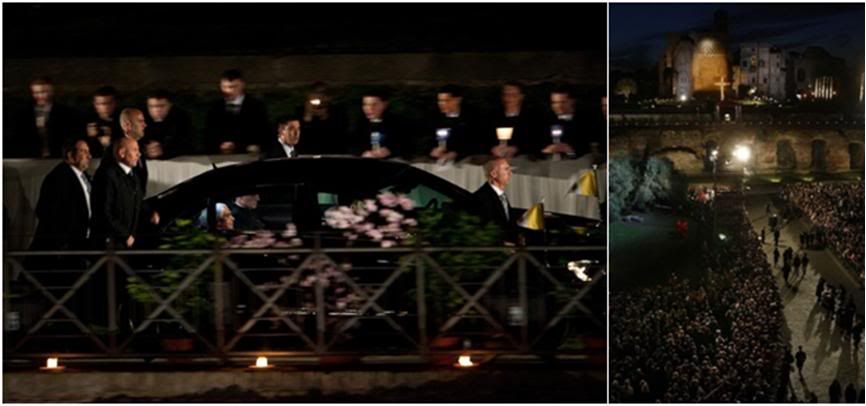
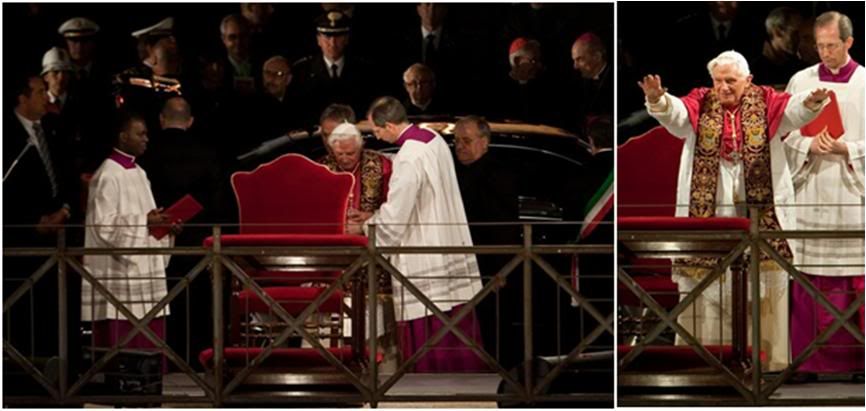
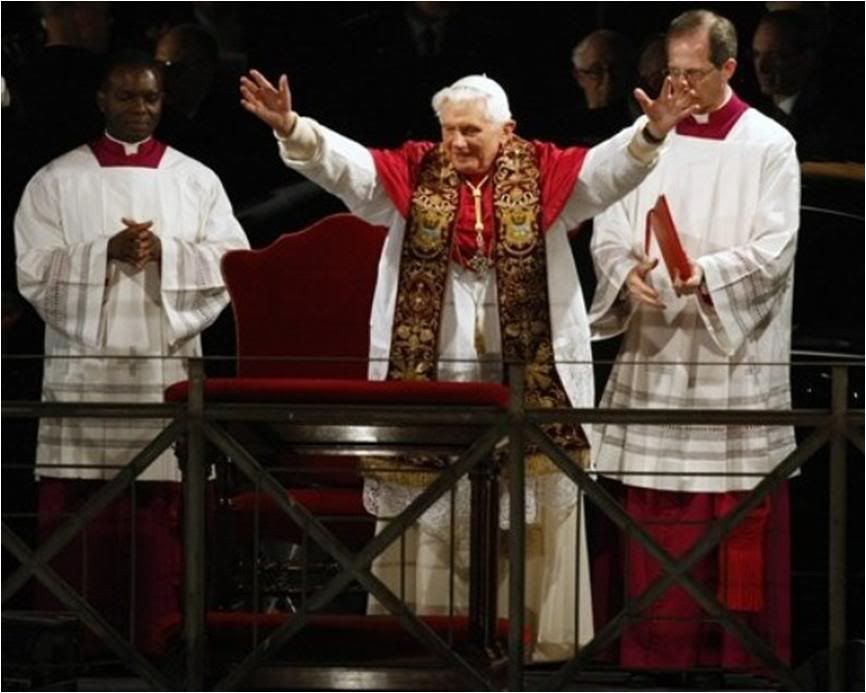
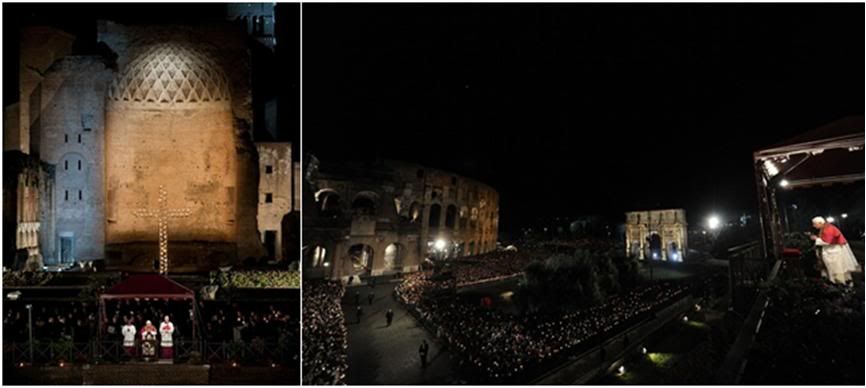
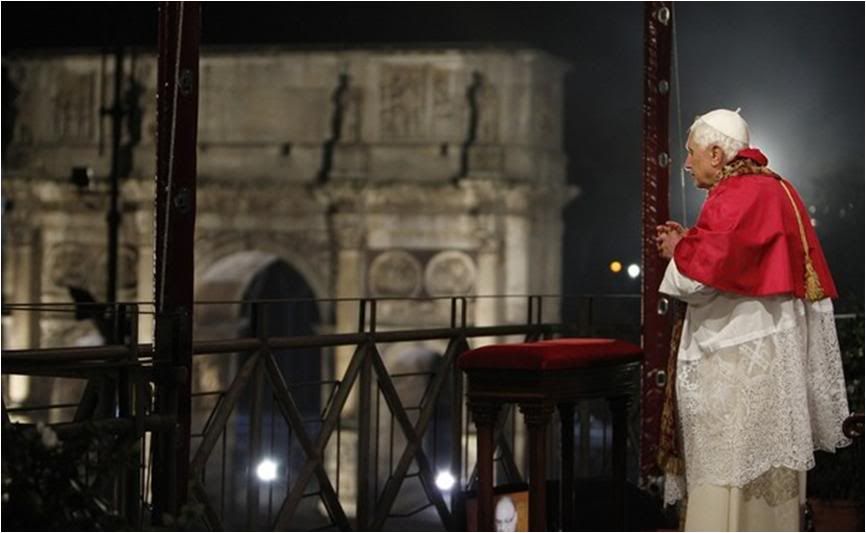
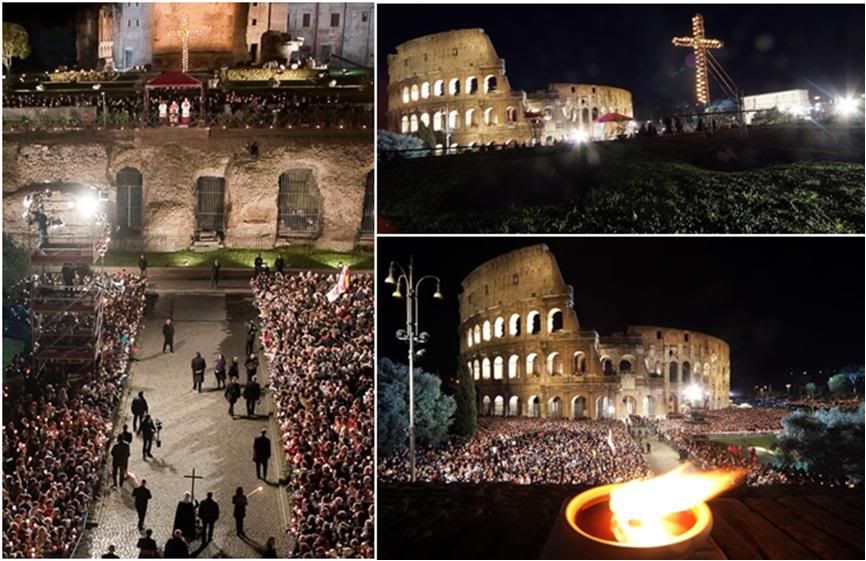
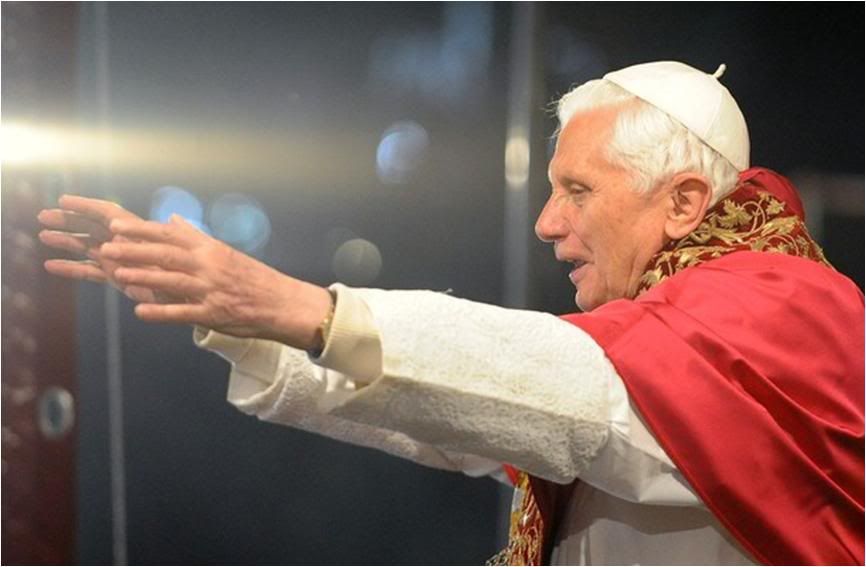
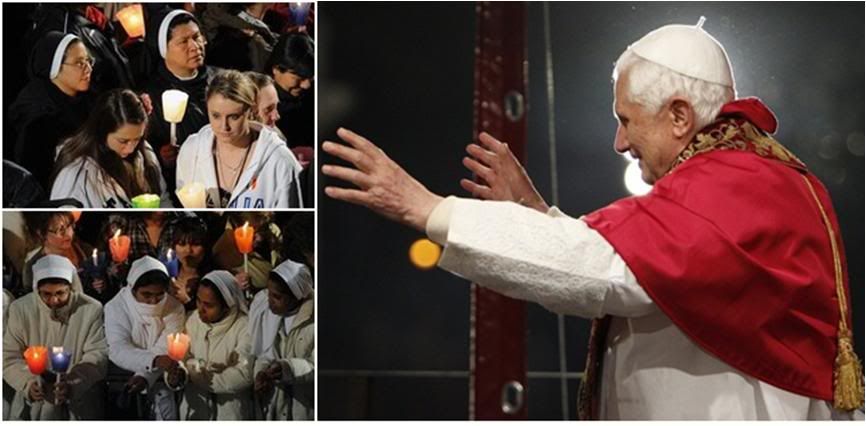
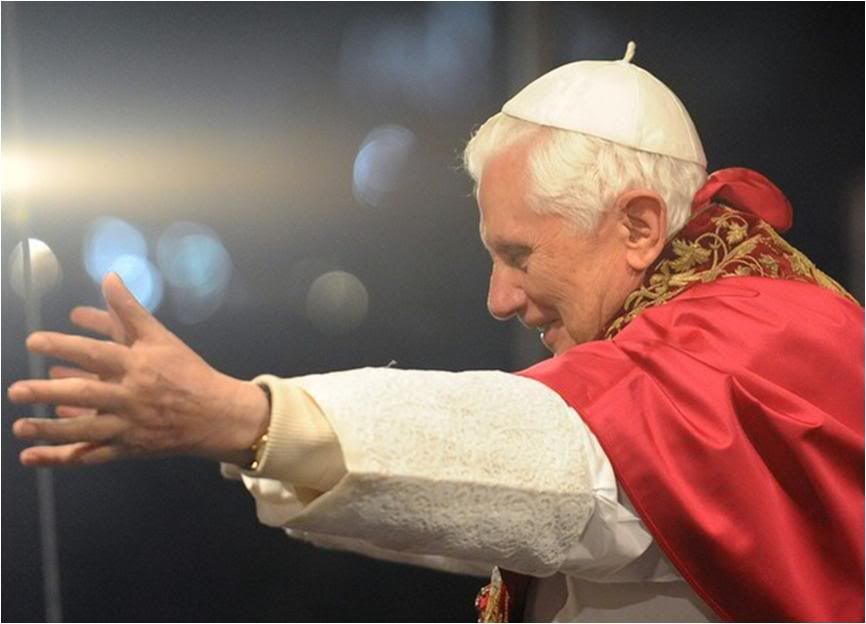
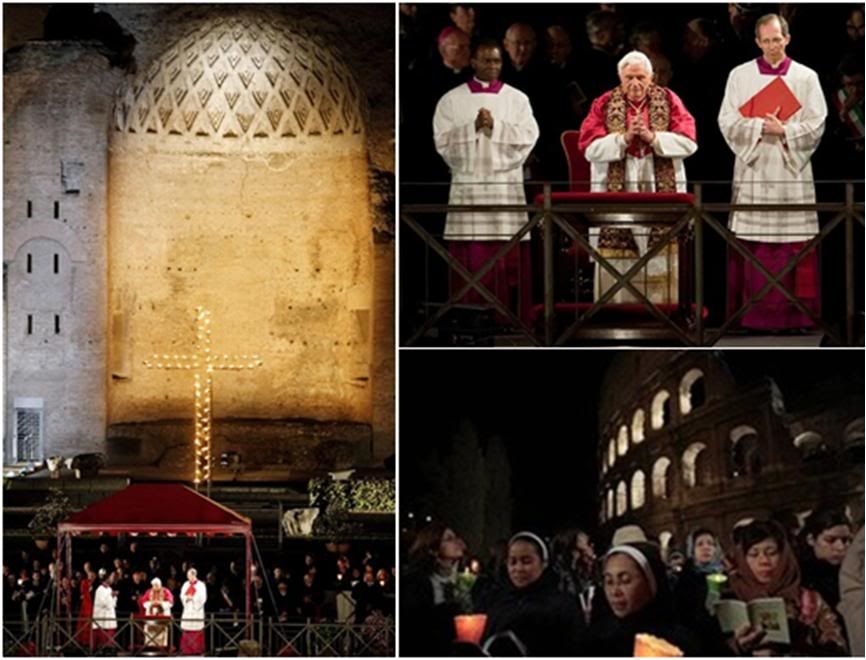
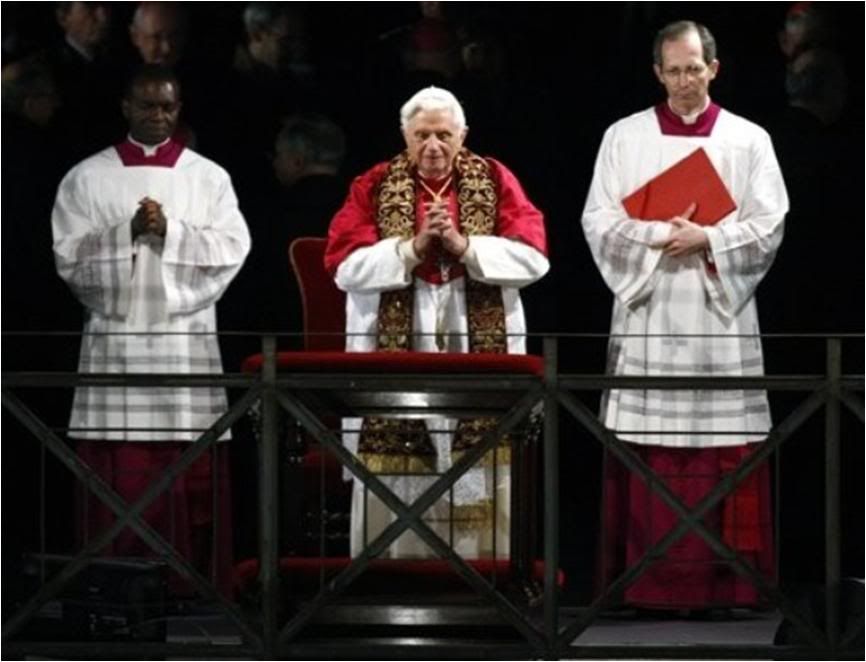
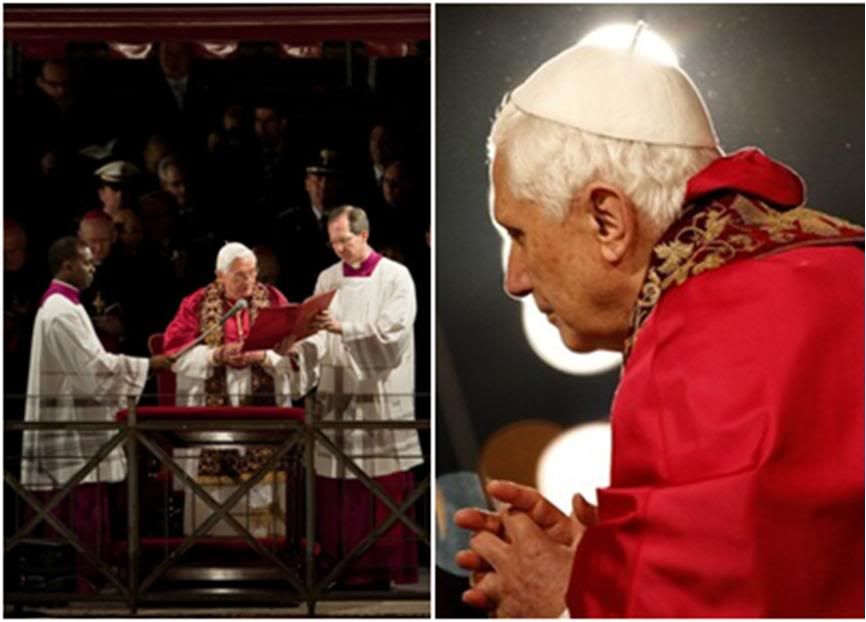
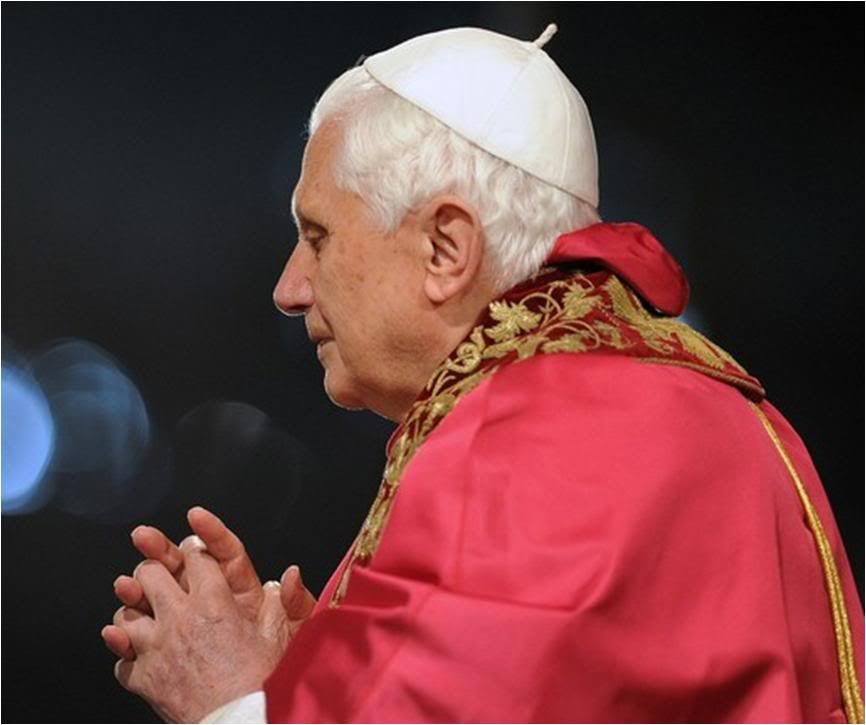
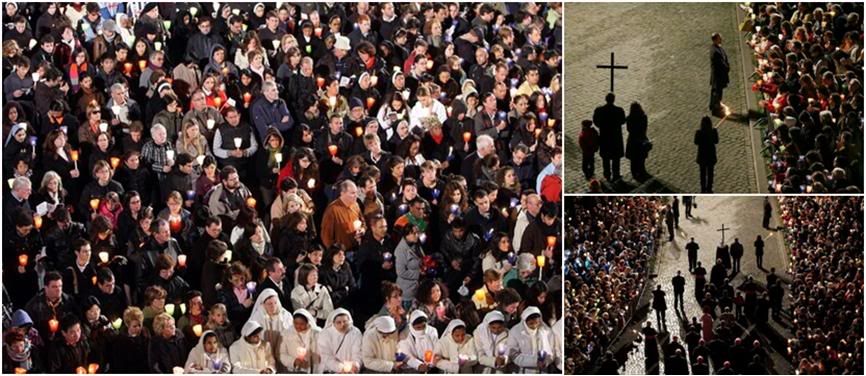
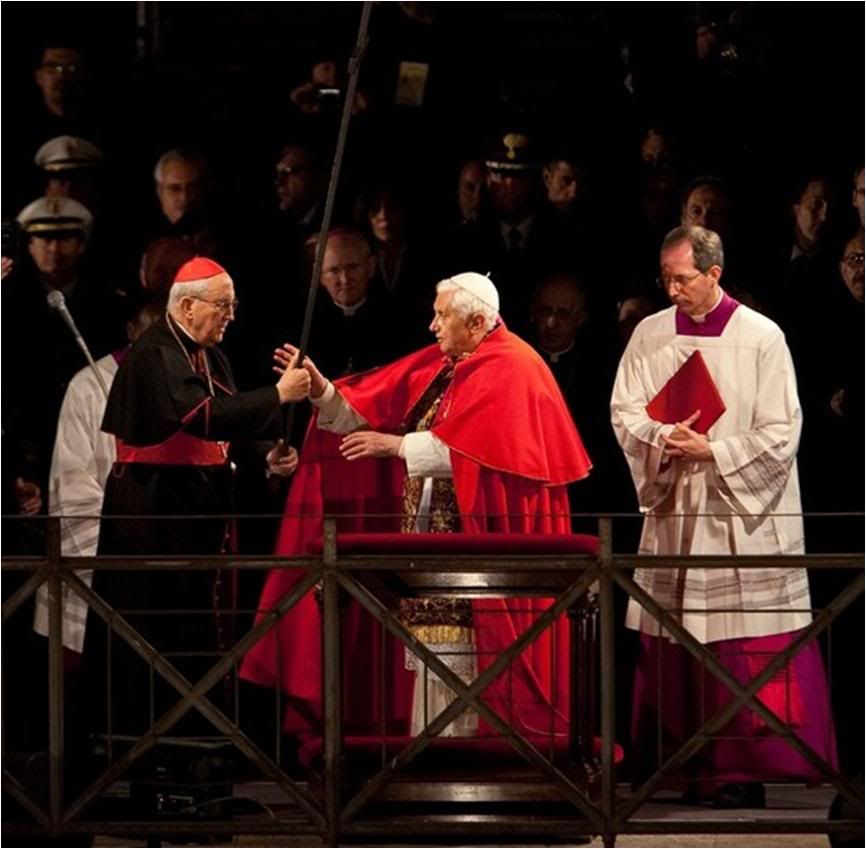
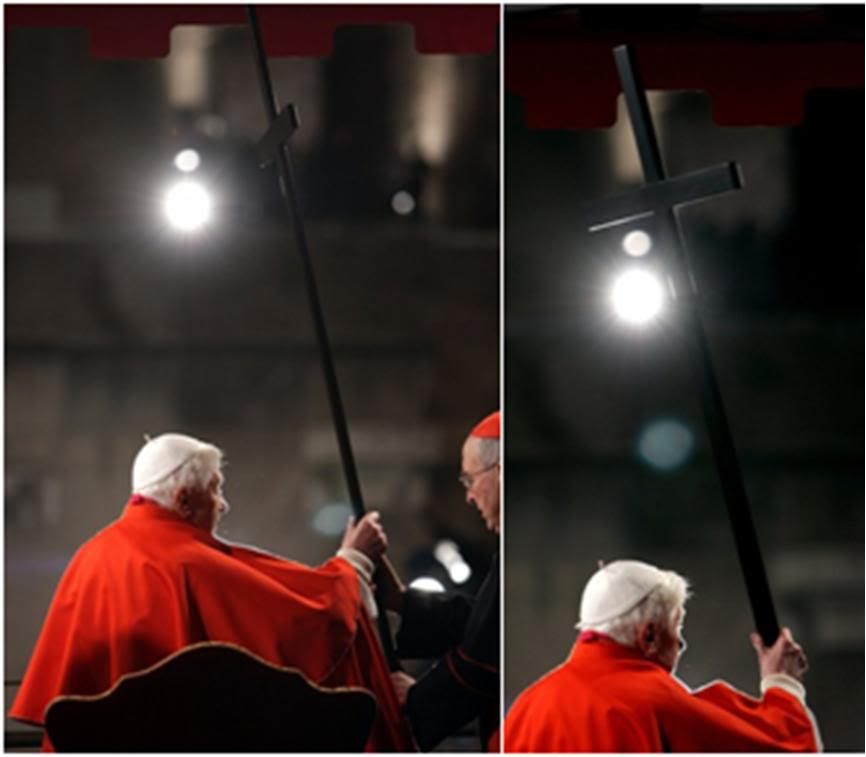
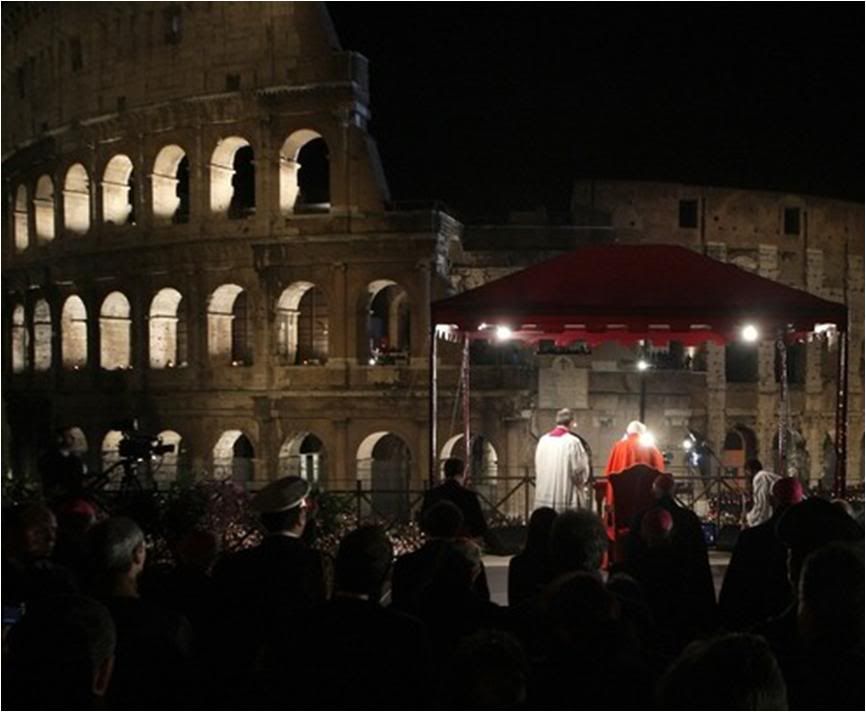
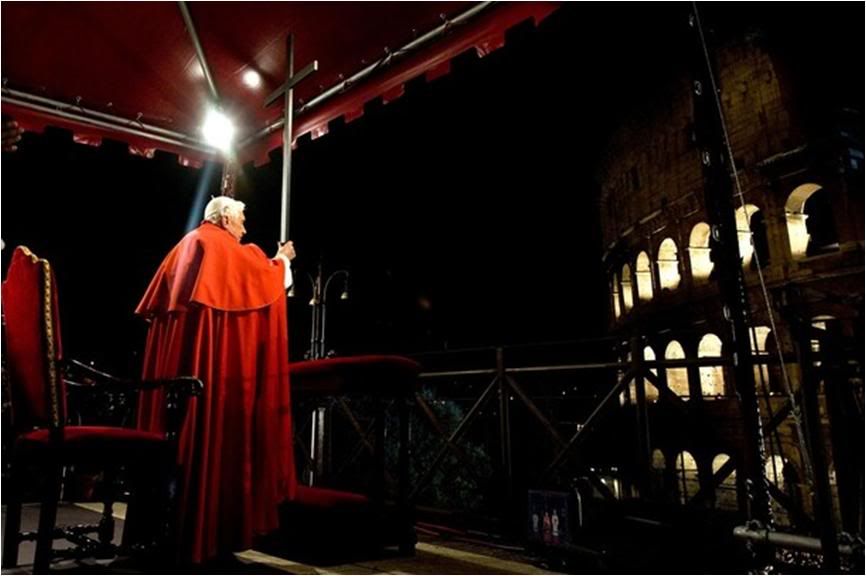
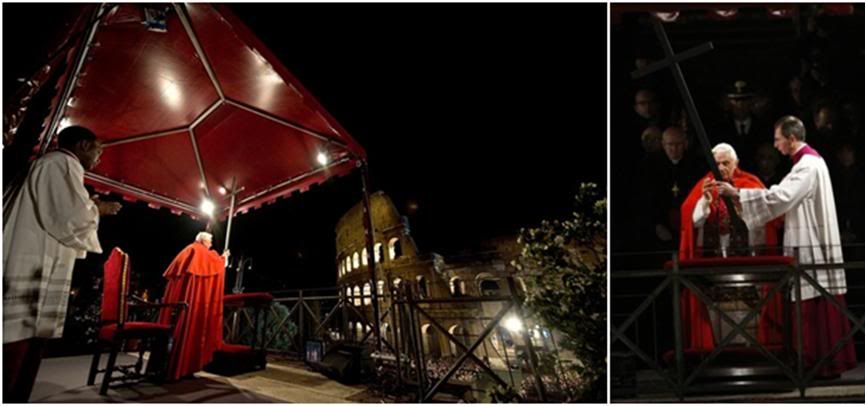
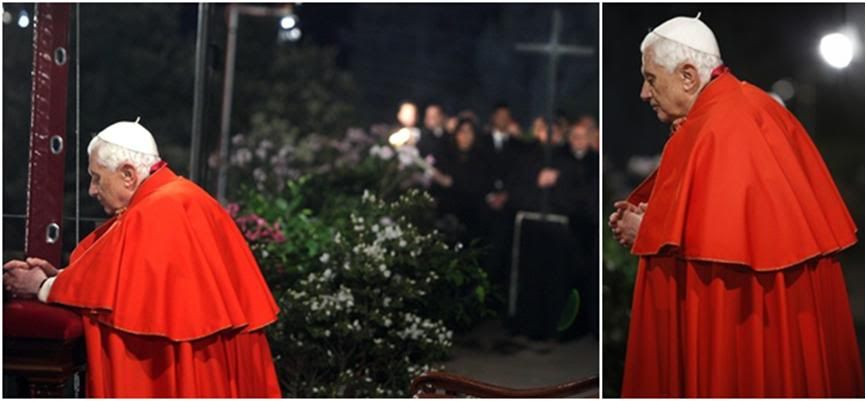 Here is a translation of the remarks delivered by the Holy Father at the end of the Via Crucis:
Here is a translation of the remarks delivered by the Holy Father at the end of the Via Crucis:
Dear brothers and sisters,
In prayer, with meditation and emotion, we followed the way of the Cross tonight. With Jesus, we ascended to Calvary and meditated on his suffering, discovering anew how profound is the love that he had and has for each of us.
But let us not limit ourselves only to compassion dictated by our own eak sentiment - we must feel ourselves participants in the suffering of Jesus. We wish to accompany our Master by sharing his Passion in our own life, in the life of the Church, for the life of the world - because we know that precisely on the Cross, in the limitless love that gives himself totally, is the spring of grace, of liberation, of peace, of salvation.
The texts, the meditations, the prayers of the Via Crucis have helped us to look at this mystery of the Passion in order to learn the immense lesson of love that God has given us on the Cross, so that a renewed desire may be born in us to convert our hearts by daily living this love, the only power able to change the world.
Tonight, we contemplated Jesus with his face full of pain, derided, insulted, disfigured by man's sin. Tomorrow night, we will contemplate his face full of joy, radiant and luminous.
When Jesus was taken down to be buried, the tomb and death ceased to be a hopeless place, where one's story ends in the most total failure, where man reaches the extreme limit of his impotence.
Good Friday is the day of greatest hope, that which ripened on the Cross as Jesus died, as he exhaled his last breath, crying out, "Father, into your hands I commend my spirit" (Lk 23,46).
In turning over his existence into the hands of the Father, he knows that his death would become the fountain of life. Just as the seed on the ground must break open so that a new plant can grow. If the grain of wheat does not die, it remains alone; but if it dies, it produces
much fruit. Jesus is the grain of wheat that falls on the ground, is broken, dies, and because of this, he bears fruit.
From the moment that Christ was raised on it, the cross that was a sign of abandonment, of solitude and of failure, became instead a new beginning. From the depths of death would arise the promise of eternal life. On the Cross, the victorious splendor of Easter dawn already shines.
In the silence of this night, in the silence which will mark Holy Saturday, touched by God's boundless love, we live in expectation of the dawn of the third day, the dawn of victory for God's love, the dawn of a light that allows the eyes of the heart to look in a new way on life, its difficulties and its suffering.
Our failures, our disappointments, our bitterness at what seems to be the collapse of everything, are illuminated by hope. The act of love on the Cross is confirmed by the Father, and the blinding light of the Resurrection envelops and transforms everything. From betrayal, friendship can be born; from rejection, forgiveness; from hatred, love.
Grant us, Lord, to carry our crosses with love, our daily crosses, in the certainty that they are illuminated by the brilliance of your Resurrection. Amen.
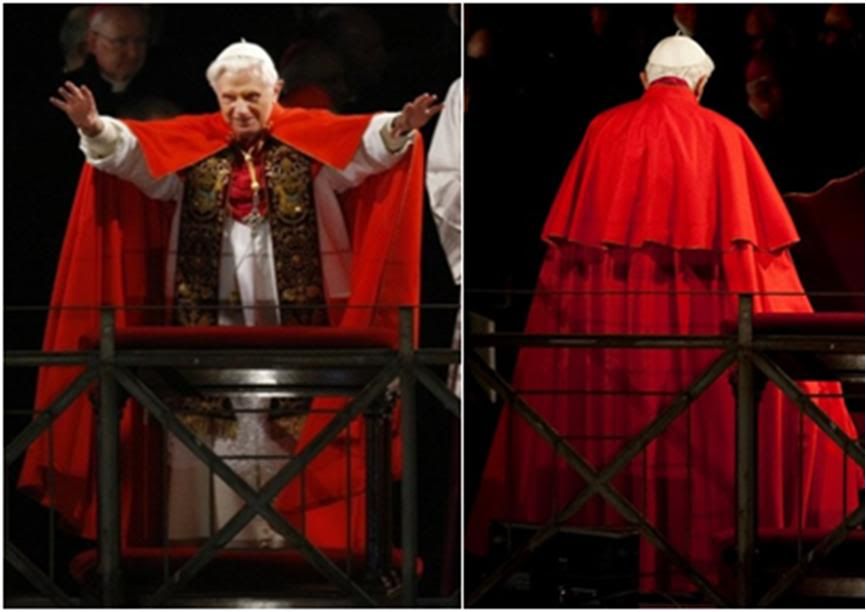 As usual, the news agency photos, as many as they are, were not representative of the whole event - not enough crowd shots; no pictures of the actual stations of the Cross as performed, except for a couple of general shots outside the Colosseum, nor of those who carried the Cross, other than the Pope himself; and none of the Holy Father addressing the faithful at the end.
As usual, the news agency photos, as many as they are, were not representative of the whole event - not enough crowd shots; no pictures of the actual stations of the Cross as performed, except for a couple of general shots outside the Colosseum, nor of those who carried the Cross, other than the Pope himself; and none of the Holy Father addressing the faithful at the end.
[Modificato da TERESA BENEDETTA 03/04/2010 12:50] |
| |
 03/04/2010 13:56 03/04/2010 13:56 |
|
| | | OFFLINE | | Post: 19.827
Post: 2.469 | Registrato il: 28/08/2005
Registrato il: 20/01/2009 | Administratore | Utente Veteran | |
|
 NEW 'GOOD FRIDAY'
NEW 'GOOD FRIDAY'
UMBRAGE FROM THE JEWS
The last thing anyone expected yesterday, Good Friday, was that the Jews - at least, their usual outspoken, hypersensitive and media-savvy representatives - would find cause for new umbrage at the Church and, of course, the Pope. All the more surprising because not one of them had earlier brought up the Good Friday prayer for the Jews on the one day of the year when the Catholic Church uses it.
But then the preacher of the Pontifical Household, Capuchin friar Raniero Cantalamessa, ended his Good Friday homily at St. Peter's Basilica yesterday by quoting a letter from a Jewish friend of his.
I recently received a letter from a Jewish friend, and with his permission, I will share part of it. He wrote: "I have been following with distaste the violent and concentric attacks against the Church, the Pope and all the faithful, from the whole world. The use of stereotypes, the passage from personal responsibility and culpability to make it collective, remind me of the most shameful aspects of anti-Semitism.
Therefore, I wish to express to you personally, to the Pope and the entire Church my personal solidarity as a jew if dialog, and of all those in the Jewish world (and there are many) who share these sentiments of brotherhood.
Our Passover and your Easter doubtless have manY differences, but both are observed in the messianic hope that surely unites us in the love of our common Father. Therefore I wish you and all Catholics a happy Easter.
Immediately, Cantalamessa's statement received the full Regensburg treatment from the English-speaking media, who almost unanimously attributed the Jewish friend's statement to Cantalamessa himself. Just as they had wrongheadedly attributed Manuel II Paleologue's anti-Mohammed statement to Benedict XVI.
But to me, the most surprising reaction was from the now-familiar array of prickly Jewish voices who are protesting the comparison of the anti-Christian hostility to anti-Semitism. That is like saying that hostility to Christianity is not that big a deal compared to hostility to the Jews - and here they play the predictable Holocaust card: You can't compare them because anti-Christian persecution has not resulted in the killing of six million.
Hatred is hatred, no matter who it is directed against. And the man burned alive in Pakistan recently because he is Christian and the Nigerian villagers hacked to death by rival Muslim tribes are just as worthy to be mourned as the six million Jews killed in the Holocaust. Hitler's crime against the Jews does not give them exclusive rights to outrage - or suffering.
Moreover, the protests all ascribe the comment to Fr. Cantalamessa rather than to his Jewish friend who wrote it and allowed him to quote it. On the most sorrowful day of the Christian year, in the heart of Christendom's most important basilica, surely no one can accuse the good friar of making up the letter!
I won't even get into the predictable MSM projection of Fr. Cantalamessa's friend's words onto the Pope simply because the words 'were said in his presence" (and if he had not been there, they would ascribe it to him anyway because Cantalamessa is the preacher of the Pontifical Household).
The Vatican spokesman Fr. Lombardi was forced to release a statement saying on Vatican Radio:
To compare the attacks on the Pope over the pedophile scandal to anti-Semitism is not the line followed by the Holy See. Fr. Cantalamessa was simply conveying the solidarity with the Pope expressed by a Jewish friend in the light of the latter's personal experience of the pain that has been suffered by his people. However, it is a quotation that can lead to misunderstandings.
I personally think Fr. Lombardi's statement was too defensive - in the sense that the orchestrated and concerted attacks against the Church and the Pope are expressions of vicious anti-Christianity.
Isn't portraying the Church as nothing more than a pedophile brothel run by conniving lying prelates, as the media do now, far worse than the age-old mistrust of the Jews in Europe as power-hungry and corrupt financial manipulators????
And if the secular ideology so hotly promoted by the MSM has not yet killed six million Christians - give them a little more time with their unbridled abortions and eventual euthanasia, and they may soon have as many victims!
P.S. It will be argued that Fr. Cantalamessa should have known he would provoke a reaction - just as they said of the Pope at Regensburg - and that perhaps he should have resisted the temptation, no matter how apropos the message was. But the good father is no impetuous and imprudent young priest wanting to call attention to himself, so I trust he made a considered judgment in deciding to use the statement. Much the same way Benedict XVI did in Regensburg.
P.P.S. A brief interview with the Chief Rabbi of Rome about this new contretemps is surprisingly not as acerbic and indignant as he habitually is, and is worth translating:
Rabbi Di Segni:
'Improper to say such things
on Good Friday"
Interview by GIACOMO GALEAZZI
Translated from

April 3, 2010
VATICAN CITY - "It is an inappropriate comparison and in bad taste".
The comparison made by the preacher of the Pontifical Household [What's wrong with you, Galeazzi? You're Italian so you have no excuse! Cantalamessa was quoting a Jewish friend - it wasn't his comparison!] between the attacks against the Church for the sexual abuses committed by some priests, to anti-Semite persecution has stunned and pained the chief Rabbi of Rome, Riccarddo Di Segni who last January defied the incomprehension of some in the Jewish world to welcome Benedict XVI to the Synagogue of Rome, after burning controversy over the beatification process under way for Pius XII, the Good Friday prayer for the conversion of the Jews ['for the Jews', not for their conversion, not here and now], and the Holocaust-denying Bishop Richard Williamson.
"It is repugnant, obscene and above all, offensive to the victims of abuse as well as to the Holocaust victims," said the leader of the German Jews, Stephan Kramer [who has a record of even more insolent and unreaonable Pavlov-dog reflexes than any of the Italian Jews].
"I have not seen St. Peter's burn nor have there been eruptions of violence against priests. The Vatican is trying to transform persecutors into victims". [AAAARRRRRGGHHHHHHHH!!! None of the kneejerk jerks I have read today appear to have looked at the statement read by Cantalamessa from his friend's letter, which said, very carefully: The use of stereotypes, the passage from personal responsibility and culpability to make it collective, remind me of the most shameful aspects of anti-Semitism."
Nowhere does the letter-writer equate the attacks against the Church and the Pope to the physical persecution of Jews, much less the Holocaust! He singles out the two characteristics of the curent attacks against the Chursh that remind him of anti-Semitism. Can anyone deny that those are characteristic of the current attacks? Which I do not hesitate to call anti-Christian, and which, as I pointed out earlier, is far worse than the underlying European mistrust of the Jews that saw its worst expression in Nazism (who amplified that mistrust into a most contemptible racial denigration).]
American rabbi Gary Greenebaum, head of the American Jewish Committee, deplored 'the unfortunate use of such language' because " collective violence against the Jews resulted in the deaths of six million persons, whereas the collective violence that Fr. Cantalamessa refers to has not led to any killings or destruction". [Not in physical or material terms, so far, but in terms of defamation and character assasination of a Pope no less, the current campaign is of an order of moral violence as vile as the defamatory campaigns the Nazis used against the Jews!]
Rabbi Di Segni, were you expecting this new storm?
What happened at St. Peter's was a comparison that was out of place. It is a descent in style that is even more obvious if you consider that no one in the Jewish community has so far said anything about the sexual abuses committed on minors by priests and religious.
Yet even before Fr. Cantalamessa's homily, there were already rumblings of attack against the Church by the Jewish lobby. Also, some Catholic circles have claimed that the Italian press is controlled by the Jews. It doesn't pay to respond to such absurdities.
What does this have to do with the new prayer for the conversion of Jews that Benedict XVI has inserted into the Missal? [Well shame on you, Galeazzi, to ask a question sa confused and misleading as that when you are a Vaticanista! First, look at the 'new prayer' again and tell me where it is a prayer for conversion - as if the Pope and Cardinal Kasper have not already explained that enough; 2) Benedict XVI did not 'insert' the prayer - it has been there since the 16th century; he revised it to use the language of Paul in the Letter to the Romans, which was always acceptable to Jews because it clearly has an eschatologic sense; and 3) the new prayer updates specifically the 1962 version of the traditional Roman Missal approved by John XXIII.]
Father Cantalamessa's improper words [THEY ARE NOT HIS WORDS!!!!] were not said on any which day, but on Good Friday - which is the darkest day in the history of Jewish-Christian relations. The prayer for our conversion remains unresolved - it is a problem that has merely been suspended because of a political truce. It also saddens us to listen to a prayer in Latin to bring light into our hearts, using the now-dead language of that empire which twice destroyed Jerusalem. Compounded by an error even.
What error?
Fr. Cantalamessa said that this year, by a 'rare coincidence', the Christian Easter falls on the same week as the Jewish Passover. When, in fact, even temporally, the Christian Easter derives from thew Jewish passover, so it is not at all unusual that the times coincide. [Yes, but Passover week and Holy Week do not always coincide because Jewish reckoning is by the lunar calendar.]
Nonetheless, Cantalamessa is an admirable orator and a prolific writer [who is certainly not ignorant of the relationship between the Jewish Passover and Easter!]
There is no reason to make a case against him for the words he said. As far as I am concerned, it/s part of the normal turbulences in the relationship between the Catholic Church and Judaism.
Abuses by the clergy against children are a problem of the Catholic Church, and we will not intervene nor make unlikely comparisons.
We know full well that no one will ever refer back again to what Fr. Cantalamessa actually read as a statement from his Jewish friend. The formula now established is: "Cantalamessa compared the attacks against the Pope and the Church for sexual abuses by priests to the anti-Semite persecution that led to the Holocaust". And that's the myth that will live on in the tainted, corrupted and perverted annals of the media.
We are borne along, as on an unending conveyor belt to hell, from one careless, thoughtless (but just as often deliberate) error by the media to another!
[Modificato da TERESA BENEDETTA 04/04/2010 00:54] |
| |
 03/04/2010 17:24 03/04/2010 17:24 |
|
| | | OFFLINE | | Post: 32
Post: 32 | Registrato il: 19/03/2010
Registrato il: 19/03/2010 | Utente Comunità | Utente Junior | |
|
by Massimo Introvigne: He is an Italian sociologist of religion. He is the founder and managing director of the Center for Studies on New Religions (CESNUR). Saturday, 3 April 2010
Why is there talk again of paedophile priests, based on a case in Germany, which drags in people who are close to the Pope and now even the Pope himself? Does sociology have something to say about this or should we leave it completely to the journalists? I believe sociology has much to say, and it must not remain silent because of a fear of displeasing some.
The current discourse on paedophile priests – considered from a sociological perspective – represents a typical example of "moral panic". The concept was coined in the 1970s to explain how certain problems become the subject of "social hyperconstruction". More precisely, moral panics are defined as socially constructed problems that are characterised by a systematic amplification of the true facts in the media or in political discourse.
Two other characteristics have been cited as typical of moral panics. First, problems that have existed for decades are reconstructed in the media and political accounts as new or as the subject of a recent dramatic increase. Second, their incidence is exaggerated by statistics plucked from the air which, while not confirmed by academic studies, are repeated by the media and inspire persistent media campaigns. Historian and sociologist Philip Jenkins, of Pennsylvania State University, has emphasised the role of "moral entrepreneurs" in the creation and management of panics whose agenda is not always revealed. Moral panics do not bring any good. They distort the perception of the problems and compromise the efficacy of the measures which should resolve them. After a harmful analysis inevitably there comes a harmful intervention.
Let there be no misunderstanding: at the origin of moral panics are objective and real dangers. They do not invent a problem; they exaggerate its statistical dimensions. In a series of excellent studies, Jenkins demonstrated how the issue of paedophile priests is perhaps the most typical moral panic. Two characteristic elements exist: a fact which serves as a starting point, and an exaggeration of this fact by moral entrepreneurs.
First of all, the fact which serves as a starting point. Paedophile priests exist. Certain cases are both unsettling and disgusting; they have resulted in convictions and the accused priests never even protested that they were innocent. These cases – in the United States, Ireland and Australia – explain the severe words of the Pope and his request for forgiveness from the victims. Even if there were only two cases – and unfortunately there are more than two – these would still be two too many.
But asking for forgiveness –noble and appropriate as it is – is not enough. We have to ensure that this will not happen again. Thus, it is relevant whether to inquire whether there are 2, 200, or 20,000 cases. And it is relevant whether the number of cases is higher or lower among Catholic priests and consecrated persons compared to other categories of persons. Sociologists are often accused of working on cold numbers, forgetting that behind each number is a human individual. But numbers, while not sufficient of themselves, are necessary. They are essential for adequate analysis.
To understand how from a tragically real fact one passes to a moral panic we must ask how many priests are paedophiles. The largest body of information has been collected in the United States, where in 2004 the US Conference of Catholic Bishops commissioned an independent study by the John Jay College of Criminal Justice of the City University of New York. This is not a Catholic university and is unanimously recognised as the most authoritative academic institution of criminology in the United States.
This study concluded that from 1950 to 2002 4,392 American priests (of over 109,000) were accused of having sexual relations with minors. Of these, just over 100 were convicted in the courts. The low number of convictions is due to various factors. In some cases the true or alleged victims reported priests who were already dead, or for whom a statute of limitation barred the action. In others, the accusation and even the canonical sentence did not involve any violation of the law: such is the case, for example, in various American states where a priest has sexual relations with a consenting person over the age of 16.
But there have also been many sensational cases of priests who have been falsely accused. Indeed, these cases multiplied in the 1990s, when some legal firms recognised they could reap million dollar returns even on the basis of mere suspicion. Appeals for zero tolerance are justifiable, but there should also be zero tolerance for defaming innocent priests. Nor do the numbers change significantly from 2002 to 2010. The John Jay College study already noted a "significant decline" in cases in the 2000s. New investigations have been rare, and sentences extremely rare, as a result of more rigorous controls introduced by American bishops as well as the Holy See.
So, does the John Jay College study tells us then, as one often reads, that 4 percent of American priests are paedophiles? Not at all. According to the research, 78.2 percent of the accusations involved minors who had advanced beyond puberty. Having sexual relations with a 17-year-old is certainly not a beautiful thing, and much less so for a priest, but it is not paedophilia. Therefore, only 958 American priests were accused of true paedophilia over 52 years, 18 per year. There were only 54 convictions, a little less than one per year.
The number of convictions of priests and consecrated persons in other countries is similar to that of the United States, even if no other country has available a study as comprehensive as that of the John Jay College. Often government reports in Ireland are cited which describe as "endemic" the level of abuses in boarding schools and in (male) orphanages managed by certain dioceses and religious orders. There is no doubt that there have been some very serious cases of sexual abuse involving minors in this country. A systematic perusal of these reports indicates, however, that many accusations involve the use of excessive or violent means of disciplining. The so-called Ryan Report of 2009 used very harsh language in relation to the Catholic Church. It studied 25,000 pupils in boarding schools, reformatories and orphanages in the period and found 253 accusations of sexual abuse of boys and 128 of girls. Not all of them were against priests or consecrated persons. These were of different natures and levels of seriousness, but they rarely involved prepubescent children. Convictions were even rarer.
The controversies in recent weeks involving Germany and Austria demonstrate a typical characteristic of moral panics: "new" facts going back many years, in some cases over 30 years, in part already known. Events of the 1980s -- especially from the Pope's own region of Bavaria -- appear on the front pages of newspapers if they had occurred yesterday. Wild controversies spring up, in a concerted attack which announces sensational new "discoveries" every day. This is how moral panics are promoted by moral entrepreneurs in an organised and systematic manner.
The fact that headlines say "it involves the Pope" is in its own way a textbook case. These refer to an episode of abuse in the Archdiocese of Munich in Bavaria and Freising, where the Pope was the Archbishop, dating back to 1980. The case emerged in 1985 and was settled by a German court in 1986, which decided among other things that the decision to accept the priest in question into the Archdiocese had not been taken by Cardinal Ratzinger. He did not even know about it, which is not at all strange in a large diocese with a complex bureaucracy. Why a German daily newspaper would decide to exhume this case and plaster it over the front page 24 years after the conviction should be the real question.
Now we come to an unpleasant question – because the simple raising of it appears defensive, and does not console victims – but it is an important one. Is being a Catholic priest a condition which involves a risk of becoming a paedophile and sexually abusing minors which is higher than the rest of the population? As we have seen the two things are not the same since abusing a 16-year-old is not paedophilia. Answering this question is fundamental to discovering the cause of the phenomenon and thus preventing it.
According to studies by Jenkins, if one compares the Catholic Church in the United States to the major Protestant denominations, one discovers that the presence of paedophiles – depending on the denominations – is from two to ten times higher for the major Protestant denominations compared to Catholic priests. The question is important because it demonstrates that the problem is not celibacy. Most of the Protestant pastors are married.
In the same period in which about 100 American priests were convicted for sexually abusing minors, the number of gym teachers and coaches of junior sporting teams – also mainly married – who were convicted of the same crimes in the US reached about 6,000. The examples could continue, not only in the US. And above all, according to regular US government reports, two-thirds of sexual abuse against minors does not come from strangers or educators – including priests and Protestant pastors – but from family members: stepfathers, uncles, cousins, brothers and, unfortunately, even parents. Similar facts exist for numerous other countries.
While it may hardly be politically correct to say so, there is a fact that is much more important: over 80 percent of paedophiles are homosexuals, that is, males who abuse other males. And – again citing Jenkins – over 90 percent of Catholic priests convicted for sexually abusing minors have been homosexual. If a problem has sprung up in the Catholic Church, it is not due to celibacy but to a certain tolerance of homosexuality in seminaries, particularly in the 1970s, when most of the priests later convicted for the abuses were ordained. This is a problem that Benedict XVI is rigorously correcting. More generally, a return to moral principles, to ascetical discipline, to meditating on the true greatness of the priesthood are the antidotes to the real tragedy of paedophilia. The Year of the Priest must also help.
Compared to 2006, when the BBC broadcast a trash-documentary featuring the Irish parliamentarian and homosexual activist Colm O'Gorman, and to 2007, when the Italian media personality Santoro broadcast an Italian version on his program Annozero, there is little new -- except for increased severity and vigilance in the Church. The painful cases of recent weeks have not been invented, but they go back 20 or even 30 years.
However, perhaps, there is something new.
Why are old and very often well-known cases being exhumed in 2010 on a daily basis, always attacking the Pope? This is paradoxical if one considers the great severity of then Cardinal Ratzinger and of Benedict XVI on this very theme. The moral entrepreneurs who organise the panic have an agenda which is increasingly clear and which is not essentially the protection of children. This is a time when political, juridical and even electoral decisions in Europe and elsewhere are being made about the abortion pill RU-486, euthanasia, the recognition of same sex unions. Only the voice of the Pope and the Church is being raised to defend life and the family. The reading of certain articles in the media shows that very powerful lobby groups are seeking to silence this voice with the worst possible defamation -- and unfortunately an easy one to make -- that of favouring or tolerating paedophilia.
These more or less Masonic lobby groups show the sinister power of technocracy which was raised by Benedict XVI himself in his encyclical Caritas in veritate and in the denunciation of John Paul II, in his Message for the World Day of Peace of 1985. They warned of "hidden aims" – alongside others which are "openly promoted" which are "directed at subjecting all populations to regimes in which God does not count".
This is truly a dark hour. It takes one back to the prediction of a great Italian Catholic thinker of the 19th century, Emiliano Avogadro della Motta (1798-1865). He predicted that after the devastation caused by secular ideologies an authentic "demon worship" would spring up which would attack the family and the true concept of marriage. Reestablishing the sociological truth about moral panics over priests and paedophilia will not of itself resolve the problems and will not stop the lobby groups. But it is a small and proper tribute to the greatness of this Pope and to a Church which is wounded and defamed because they will not be silent on the issues of life and the family.
www.mercatornet.com/articles/view/mora/ |
| |
 03/04/2010 18:52 03/04/2010 18:52 |
|
| | | OFFLINE | | Post: 33
Post: 33 | Registrato il: 19/03/2010
Registrato il: 19/03/2010 | Utente Comunità | Utente Junior | |
|
A Fiery Sermon (Good Friday Sermon at Vatican and NYT interpretation) by Dr Robert Moynihan: 03 April 2010
This evening in St. Peter's Basilica, during a Good Friday liturgy, the preacher of the papal household delivered a sermon in which he quoted a Jewish friend, regarding the recent attacks against the Pope, as saying that aspects of the attacks "remind me of the more shameful aspects of anti-Semitism"
A Sermon Rich in Contrasts
ROME, Italy, Friday, April 2, 2010 -- Tonight at 5 p.m. in St. Peter's Basilica, I attended the Good Friday liturgy which celebrates the Passion of the Lord.
The basilica was packed, but a kind Vatican official enabled our little group to have a place near the main altar.
Pope Benedict XVI was present throughout, and spoke a number of prayers in Latin, and unveiled the cross for veneration.
But he did not deliver the sermon.
He entrusted the sermon to the Preacher of the Pontifical Household, Father Raniero Cantalamessa, a Franciscan Capuchin friar.
Cantalamessa, regarded as one of the most profound and moving Catholic homilists in the world today, focused on the mystery of Christ's priesthood and what it means for a mankind subject to mortality and sin.
The sermon was essentially a meditation on violence, and on how Jesus, through his life and death, overthrew the primordial "alliance between the sacred and violence" which prior to him was so common (animal and even human sacrifice, the use of a "scapegoat" to bear the sins of the people).
"Jesus unmasks and breaks the mechanism of the scapegoat that makes violence sacred, making himself the victim of all violence," Cantalamessa said.
Then towards the end, he spoke directly about the recent attacks on the Pope.
Noting that this year Easter falls in the same week as the Jewish Passover, Cantalamessa said he had received a letter recently from a Jewish friend. He then cited the letter.
It was a striking moment, rich in symbolic contrasts.
The words he was speaking were part of the official homily for the Good Friday liturgy in St. Peter's Basilica -- a liturgy which contains the scriptural passages in which the Jewish crowds in Jerusalem call out "Crucify him!"
And the words he was speaking had to do with attacks on a German Pope -- a Pope from the country where anti-Semitism was official state policy for 12 years two generations ago.
And the words the preacher was speaking, in support of the Pope, were written by a Jew.
Cantalamessa said his Jewish friend had written to him that some aspects of these recent attacks against the Pope and the Church, including "the use of stereotypes, the passing from personal responsibility and guilt to a collective guilt," reminded his Jewish friend of "the more shameful aspects of anti-Semitism."
As the word "antisemitismo" at the end of that sentence echoed out over the vast hall, over the silent throng, the battle over this Pope and this pontificate seemed to me to take on a new and deeper dimension.
Then, in a further irony, Cantalamessa ended his sermon, not with a citation from scripture, but with a citation from, of all people, the Rabbi Gamaliel, the teacher of St. Paul -- words which he said had passed into the text of the Jewish Seder, and from there into "the most ancient Christian liturgy"(!).
"We Catholics wish our Jewish brothers a Good Passover," Cantalamessa said. "We do so with the words of their ancient teacher Gamaliel, entered in the Jewish Passover Seder and from there passed into the most ancient Christian liturgy:
"He made us pass
From slavery to liberty,
From sadness to joy,
From mourning to celebration,
From darkness to light,
From servitude to redemption
Because of this before him we say: Alleluia."
And there the homily ended.
Just after the liturgy was over, I was able to speak with Father Raniero, who was seated a few feet away from me. I asked him for the text of his sermon, which he had delivered in Italian. He agreed to send it to me via email.
A few minutes ago, I received an email from him with the text in English. Here it is in its entirety. (I've left it out)
The Coverage by the New York Times
Then, just a few moments ago, I received an email of the following story. It is this evening's report of the New York Times on tonight's sermon.
===========================
At Vatican Service, Persecution of Jews Is Invoked
By DANIEL J. WAKIN and RACHEL DONADIO
Published: April 2, 2010
ROME — A senior Vatican priest speaking at a Good Friday service compared the uproar over sexual abuse scandals in the Catholic Church — which have included reports about Pope Benedict XVI’s oversight role in two cases — to the persecution of the Jews, sharply raising the volume in the Vatican’s counterattack.
The remarks, on the day Christians mark the crucifixion, underscored how much the Catholic Church has felt under attack from recent news reports and criticism over how it has handled charges of child molestation against priests in the past, and sought to focus attention on the church as the central victim.
In recent weeks, Vatican officials and many bishops have angrily denounced news reports that Benedict failed to act strongly enough against pedophile priests, once as archbishop of Munich and Freising in 1980 and once as a leader of a powerful Vatican congregation in the 1990s.
Benedict sat looking downward when the Rev. Raniero Cantalamessa, who holds the office of preacher of the papal household, delivered his remarks in the traditional prayer service in St. Peter’s Basilica. Wearing the brown cassock of a Franciscan, Father Cantalamessa took note that Easter and Passover were falling during the same week this year, saying he was led to think of the Jews. “They know from experience what it means to be victims of collective violence and also because of this they are quick to recognize the recurring symptoms,” he said.
Father Cantalamessa quoted from what he said was a letter from an unnamed Jewish friend. “I am following the violent and concentric attacks against the church, the pope and all the faithful by the whole world,” he said the friend wrote. “The use of stereotypes, the passing from personal responsibility and guilt to a collective guilt, remind me of the more shameful aspects of anti-Semitism.”
The Vatican spokesman, the Rev. Federico Lombardi stressed that Father Cantalamessa’s sermon represented his own private thoughts and was not “an official statement” from the Vatican.
He said it was incorrect to interpret the remarks as comparing recent criticism of the Catholic Church to anti-Semitism, but should instead be read as a sign of “solidarity” by Father Cantalamessa’s Jewish friend.
Father Lombardi said that he personally did not think that criticism of the church could be compared to anti-Semitism.
“I don’t think it’s an appropriate comparison,” he said. “That’s why the letter should be read as a letter of solidarity by a Jew.”
“It is not meant as an attack on the Jewish world, anything but,” Father Lombardi added. He said that Benedict had no role in the sermon.
Even as the priest spoke out against attacks on the church, Archbishop Robert Zollitsch of Freiburg, head of the German Bishops Conference, said that sex abuse victims were not helped enough “out of a misplaced concern for the reputation of the church.” The church, he said, was shaken by “the suffering inflicted on the victims, who often for decades could not put their injuries into words.” Bishops around Europe have been offering similar remarks in recent days, following up on a major statement on molestation in the Irish church by the pope.
Father Cantalamessa’s comments about the Jews came toward the end of a long talk about scripture, the nature of violence and the sacrifice of Jesus. He also spoke about violence against women, but gave only a slight mention of the children and adolescents who have been molested by priests. “I am not speaking here of violence against children, of which unfortunately also elements of the clergy are stained; of that there is sufficient talk outside of here,” he said.
Disclosures about hundreds of such cases have emerged in recent months in Germany, Ireland, the Netherlands, Austria, Switzerland and France, after a previous round of scandal in the United States earlier this decade.
A leading advocate for sex abuse victims in the United States, David Clohessy, called comparing criticism of the church to persecution of the Jews “breathtakingly callous and misguided.”
“Men who deliberately and consistently hide child sex crime are in no way victims,” he said. “And to conflate public scrutiny with horrific violence is about as wrong as wrong can be.”
The comments could cause a new twist in Vatican-Jewish relations, which have had ups and downs during Benedict’s papacy.
Rabbi Riccardo di Segni, the chief rabbi of Rome, who hosted Benedict at the Rome synagogue in January on a visit that helped calm waters after a year of tensions, laughed in seeming disbelief when asked about Father Cantalamessa’s remarks.
“With a minimum of irony, I will say that today is Good Friday, when they pray that the Lord illuminate our hearts so we recognize Jesus,” Rabbi Di Segni said, referring to a prayer in a traditional Catholic liturgy calling for the conversion of the Jews. “We also pray that the Lord illuminate theirs.”
In 2007, Benedict ruffled feathers with Jewish groups when he issued a ruling making it easier to use the Latin Mass including that Good Friday prayer, which had fallen out of widespread use after the liberalizing reforms of the Second Vatican Council. In January 2009, he stirred outrage when he revoked the excommunication of four schismatic bishops, one of whom turned out to have denied the scope of the Holocaust.
The legacy of the wartime pope, Pius XII, has been another sticking point. Some say he didn’t do enough to save Jews during the Holocaust; on a visit to the Rome synagogue in January, Benedict said that the Holy See had “provided assistance, often in a hidden and discreet way,” to help Jews.
Father Cantalamessa’s remarks come after weeks of intense scrutiny of Benedict, which some Italian media have seen in conspiratorial terms. Last week, the center-left daily La Repubblica wrote, without attribution, that “certain Catholic circles” believed the criticism of the church stemmed from “a New York ‘Jewish lobby.’”
Father Cantalamessa is a longtime fixture in the papal household, having been its official preacher since 1980. It is an ancient role, established by Pope Paul IV in the middle of the 16th century. The job is reserved for a member of the Franciscan Order of Capuchin Friars Minor. The apostolic preacher, as he also is called, gives meditations — especially during Advent and Lent — for the pope, cardinals, bishops and leaders of religious orders.
Father Cantalamessa was also tasked to deliver a meditation on the problems facing the church and need for careful consideration to the college of cardinals shortly after the death of John Paul II, as they prepared to elect his successor. Their choice was Cardinal Joseph Ratzinger, now Pope Benedict.
Later in the evening, Benedict was to move on to the Colosseum, to take part in the Way of the Cross procession marking Jesus’ final hours and his crucifixion.
======================================
“He that takes truth for his guide, and duty for his end, may safely trust to God's providence to lead him aright.” —Blaise Pascal (French mathematician, philosopher, physicist and writer, 1623-1662)
www.freerepublic.com/focus/f-religion/2485924/posts |
| |
 03/04/2010 21:32 03/04/2010 21:32 |
|
| | | OFFLINE | | Post: 19.830
Post: 2.472 | Registrato il: 28/08/2005
Registrato il: 20/01/2009 | Administratore | Utente Veteran | |
|

 April 3, Holy Saturday
April 3, Holy Saturday
 Greek Orthodox icons: From left, Jesus is prepared for burial, with the Magdalene, the Virgin Mary, the Apostle John and Joseph of Arimathea; other icons show Jesus's descent to Hades. Holy Saturday is celebrated with elaborate rituals in the Orthodox Church.
Greek Orthodox icons: From left, Jesus is prepared for burial, with the Magdalene, the Virgin Mary, the Apostle John and Joseph of Arimathea; other icons show Jesus's descent to Hades. Holy Saturday is celebrated with elaborate rituals in the Orthodox Church.
Let us return once more to the night of Holy Saturday. In the Creed we say about Christ’s journey that he “descended into hell.” What happened then?
Since we have no knowledge of the world of death, we can only imagine his triumph over death with the help of images which remain very inadequate.
Yet, inadequate as they are, they can help us to understand something of the mystery. The liturgy applies to Jesus’ descent into the night of death the words of Psalm 23[24]: “Lift up your heads, O gates; be lifted up, O ancient doors!”
The gates of death are closed, no one can return from there. There is no key for those iron doors. But Christ has the key. His Cross opens wide the gates of death, the stern doors. They are barred no longer. His Cross, his radical love, is the key that opens them. The love of the One who, though God, became man in order to die – this love has the power to open those doors. This love is stronger than death.
The Easter icons of the Oriental Church show how Christ enters the world of the dead. He is clothed with light, for God is light. “The night is bright as the day, the darkness is as light” (cf. Ps 138[139]12).
- Benedict XVI, Easter Vigil homily, 2007
OR today.
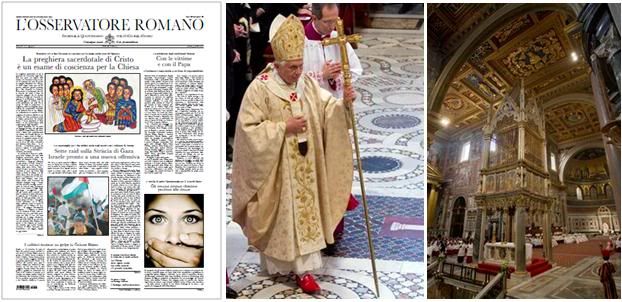

At the Mass of the Last Supper, Benedict XVI tells the clergy that
'Christ's priestly prayer is an examination of conscience for the Church'
Other Page 1 stories: French intellectuals launch a support movement for the victims of child abuse and Benedict XVI, calling on the mass media to exercise an ethic of responsibility; Israel makes seven raids into the Gaza Strip to retaliate the Hamas killing of two Israeli soldiers; Father Cantalamessa's Good Friday homily; and in the inside pages, more bishops express their support for Benedict XVI, including Cardinal Carlo Maria Martini. [NB: Because of a 3 p.m. press deadline for the next day's issue, the OR is unable to report events that take place after 3 p.m. in the next
day's issue. Fr. Cantalamessa's homily made it because it was a prepared text.]
THE POPE'S DAY
Starting at 9 p.m., Easter Vigil and Mass at St. Peter's Basilica.
Today is also the feast day of
ST. BENEDETTO IL MORO (Benedict the Moor) (b N Africa, 1526, d Sicily, 1589), Franciscan
 Second from right, a fresco showing angels helping the saint in the kitchen, in the Palermo church where he is enshrined; extreme right, the saint's remains.
The son of Ethiopian slaves, he and his family were taken to Messina, where he was freed at age 18. He joined some hermits near Palermo, but since they
Second from right, a fresco showing angels helping the saint in the kitchen, in the Palermo church where he is enshrined; extreme right, the saint's remains.
The son of Ethiopian slaves, he and his family were taken to Messina, where he was freed at age 18. He joined some hermits near Palermo, but since they
followed the Rule of St. Francis, Pope Pius IV ordered them to formally join the order. A lay brother, he began as cook in the friary in Palermo but later
became novice master and then its superior. Although he was uneducated, his understanding of theology and of Holy Scriptures was considered remarkable.
He also had healing powers. He developed a reputation for holiness and attracted such a following he could only go out at night, well-covered, to avoid
recognition and people trying to tear pieces off his garments. In the last years of his life, he asked to serve once again as friary cook. His cult was immediate
after his death, and today, he is particularly venerated in Brazil. He is considered the patron saint of black Americans. He was canonized in 1807. His incorrupt
body lies in Church of the friary where he served in Palermo.
[Modificato da TERESA BENEDETTA 06/04/2010 20:09] |
| |
 03/04/2010 23:15 03/04/2010 23:15 |
|
| | | OFFLINE | | Post: 19.831
Post: 2.473 | Registrato il: 28/08/2005
Registrato il: 20/01/2009 | Administratore | Utente Veteran | |
|
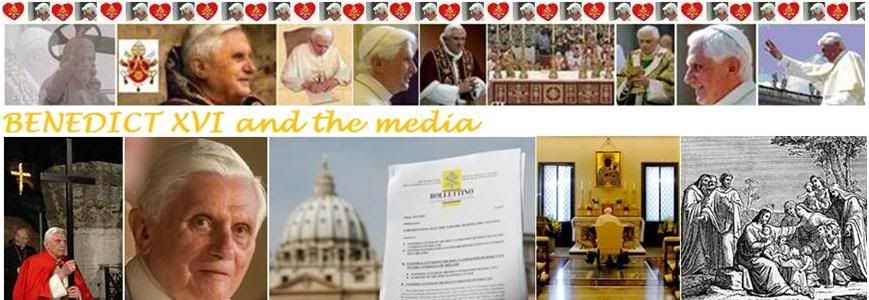 The following statement, which will appear in tomorrow's issue (4/4/10) issue of the Vatican newspaper, was issued by the Vatican press director Saturday morning. It was promptly reported by the Italian news agencies, but not one of the international news agencies has so far, including the Associated Press which originated the story about Teta yesterday. If we go by the Brundage experience, I doubt that the AP will carry the Vatican correction,
Vatican points out
The following statement, which will appear in tomorrow's issue (4/4/10) issue of the Vatican newspaper, was issued by the Vatican press director Saturday morning. It was promptly reported by the Italian news agencies, but not one of the international news agencies has so far, including the Associated Press which originated the story about Teta yesterday. If we go by the Brundage experience, I doubt that the AP will carry the Vatican correction,
Vatican points out
'misleading presentation'
of Arizona priest's case
Translated from
the 4/4/10 issue of

The presentation made by the media of the case of Michael Teta, a priest whos erved in the diocese of Tucson, Arizona, in the 1970s, is misleading, according to a statement issued by Vatican press director Fr. Federico Lombardi late Saturday morning.
The documents in fact show with clarity and certainty that the responsible officials at the Congregation for the Doctrine of the Faith - to which the diocese turned for a case that had to do with the crime of 'soliciting' sex in the confessional - were actively involved in the case in the 1990s, so that the canonical process against Teta could be brought to a proper conclusion (which happened in 1997, with his reduction to the lay state).
This was previously confirmed with precision in response to questions posed by the local press to Mons. Gerald Kicanas, bishop of Tucson, who also published letters coming from the CDF.
However, Teta appealed the sentence and his appeal came to the CDF while the revision of the canonical norms previously in force was under way. Thus the appeal remained pending until the new norms came into force in 2001, which brought all cases of 'the most serious crimes' under the competence of the CDF so that they could be dealt with better and faster.
Since 2001, all the pending appeals were dealt with promptly, and the Teta case was one of the first to be discussed. It required time because the documentation was particularly voluminous. In any case, the earlier sentence was confirmed entirely, with his subsequent reduction to lay state in 2004.
But it must not be forgotten that even when an appeal is pending and the sentence is suspended in the meantime, the precautionary measures imposed by the bishop on the accused remain in force. And Teta was suspended [from priestly functions] since 1990.
I am afraid this game of 'GOTCHA!' by the MSM - specifically trying to pile as much crap as they can to the account of Joseph Ratzinger/Benedict XVI - will continue until the next big and genuine scandal occupies them... Since the Vatican is apparently able to research its files promptly for cases filed with the CDF itself, why don't the media do the standard courtesy - it used to be anyway - of calling them first to "We have this information - what do you have to say about it?" - and then give the answer or rebuttal equal play, preferably a separate but parallel story?
See, even the Times gave the Vatican this right of immediate response in the Fr. Murphy case: they showed the documents they had to Fr. Lombardi and they quote his response - in four sentences buried in the middle of a long story - in the same story that broke the 'news'. In my time, you would run the entire response/rebuttal [as long as the material is objective and relevant and not just empty ballast] side by side with the 'original'. That's being fair. [Modificato da TERESA BENEDETTA 04/04/2010 10:51] |
| |
 04/04/2010 10:46 04/04/2010 10:46 |
|
| | | OFFLINE | | Post: 19.832
Post: 2.474 | Registrato il: 28/08/2005
Registrato il: 20/01/2009 | Administratore | Utente Veteran | |
|
|
| |
|
|
|
|